- Travel Planning Guide

A Travel Price Comparison for Families, Couples, and Backpackers the UK vs. Ireland for Museums & Attractions, Families, Food, and Nightlife

- Pros & Cons
- Museums & Attractions
- Culture & History
- Small Towns
- Christmas Markets
- National Parks
- Adventure & Outdoor Activities
- Watersports
- Outdoor Activities
- Backpackers
- Transportation
- More time in the UK or Ireland?
- Which is Cheaper, the UK or Ireland?
- What are the cheapest places in the UK or Ireland?
- How can you save money in the UK or Ireland?
- When to Visit the UK or Ireland?
- Weather: the UK vs. Ireland
Should you visit the United Kingdom or Ireland?
Which is cheaper to visit which is more expensive for vacation.
If you're trying to decide where to visit between the UK or Ireland, this travel comparison, which includes costs, can help. The overall cost of travel is usually a consideration when deciding where to go next, and the cost comparison down below can help you decide based on the average prices from other travelers along with your own travel budget.
We'll start with a quick overview, and below we will go into all of the details.
With jaw-droppingly beautiful countryside, award-winning beaches and a whole lot of character, it is no wonder that England tops everyone's must-visit bucket list. In fact, England, Scotland, Wales and the Offshore Islands all offer great holiday destinations with something for everyone, whether you are travelling alone, as a couple, or with your family. You won't find anywhere as peaceful as the English countryside and its beautiful lakes will take your breath away. Rocky coasts, castles, green hills and charming pubs, all that is England; without forgetting energetic, majestic and ambitious London, steeped in iconic landmarks, world-class museums and royal parks and one of the world's greatest cities. The UK's cities and towns also have a lot to offer visitors, from the hip, indie scene of Manchester to the amazing Balti food of Birmingham, from the dreaming spires of Oxford and medieval passageways of York to the lively art scenes of Glasgow. It may be small in size, but England is rich in tradition, complex in culture, endlessly diverse and has a lot to offer when it comes to fascinating history. There are lots of unique historic buildings that you can visit, including the awe-inspiring Tower of London, the atmospheric ruins of ancient castles, prehistoric Stonehenge or the Victorian village of Saltaire. The United Kingdom offers lots of delicious food for everyone. So you shouldn't have any issues whatsoever when it comes to finding cuisine that you will thoroughly enjoy.
There's a lot more to Ireland than Guinness and pubs, although for some, this may be the best part. Ireland has a rich history which dates back to prehistoric times. Its many museums, magnificent houses and historical sites make it a top destination for ardent historians. With its scene-stealing natural beauty and multitude of things to see and do, Ireland is a dream tourist destination. Looking for cliffs, beaches, national parks, forests and 100 shades of green? Ireland has it all. Green is the islands emblematic color. From vast mountains to pebbly beaches, rural bog lands to inland waterways, tourists can sample a feast of natural attractions. Located in the Burren region in County Clare, the Cliffs of Moher are said to be the biggest natural tourist attraction in Ireland drawing over million people each year. The view from the 200 metre high cliffs is breathtaking and many that visited it will agree that this is a must-visit in Ireland. A visit to Ireland's buzzing capital city goes without saying. Dublin is a super friendly city with a youthful, creative vibe. It has free museums to explore, architecture to gawp at and a more than lively pub scene. If you go during St Patrick's Day, an Irish festival celebrated and known around the whole world, your stay will be unforgettable. The biggest festival is held, of course, in Dublin, and the celebration lasts for several days. Finally, don't leave Ireland without trying their shellfish, Irish stew, colcannon and champ, boiled bacon and cabbage, smoked salmon, black and white pudding, coddle, bambrack and soda bread. You might not think of Ireland as a Gourmet Destination, but the food here is world class.
United Kingdom
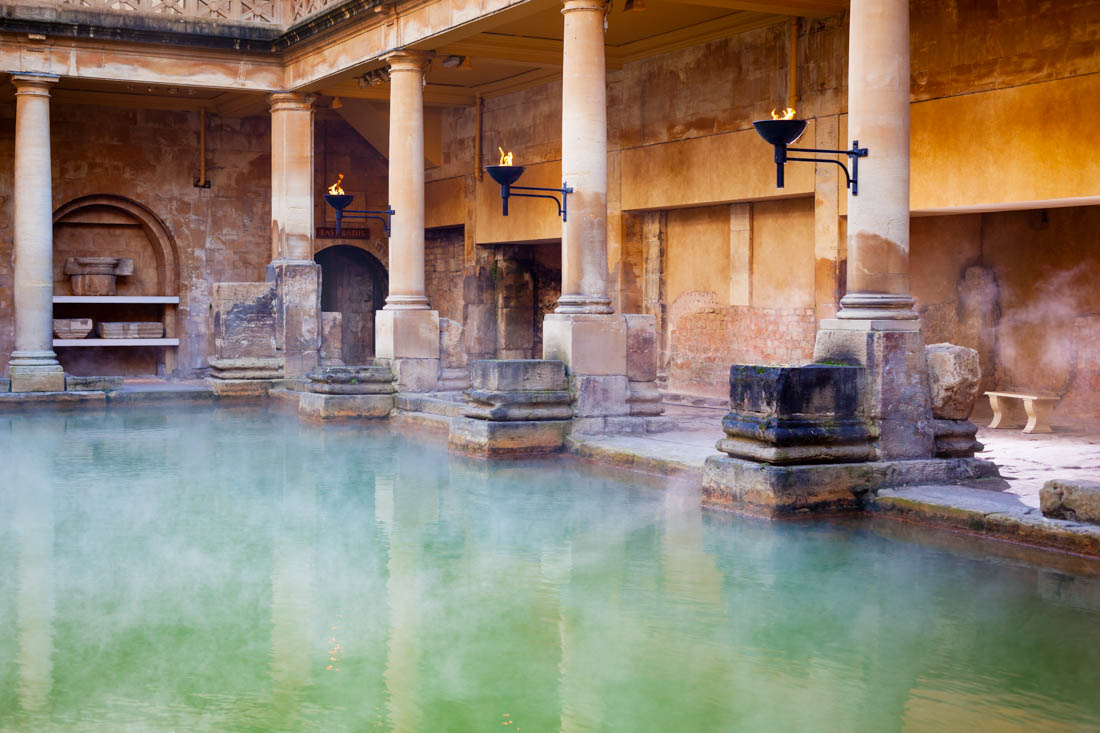
The UK is a beautiful, historic, and traditional country. The beauty of this spot is also one of the main reasons why visitors come. Visitors also love the history and culture, nightlife, live music, and food.
The United Kingdom, also commonly referred to as Great Britain, offers visitors a diverse set of experiences and attractions throughout the large cities, small town, and countryside. Consisting of England, Scotland, Wales, and Northern Ireland, travelers can explore a deep and rich history and culture along with modern attractions and beautiful, diverse landscapes. From cities such as London, Edinburgh, Cardiff, and Belfast, it's easy to get out into the smaller towns and countryside to explore the mountains, coastline, and agricultural regions of this island nation.
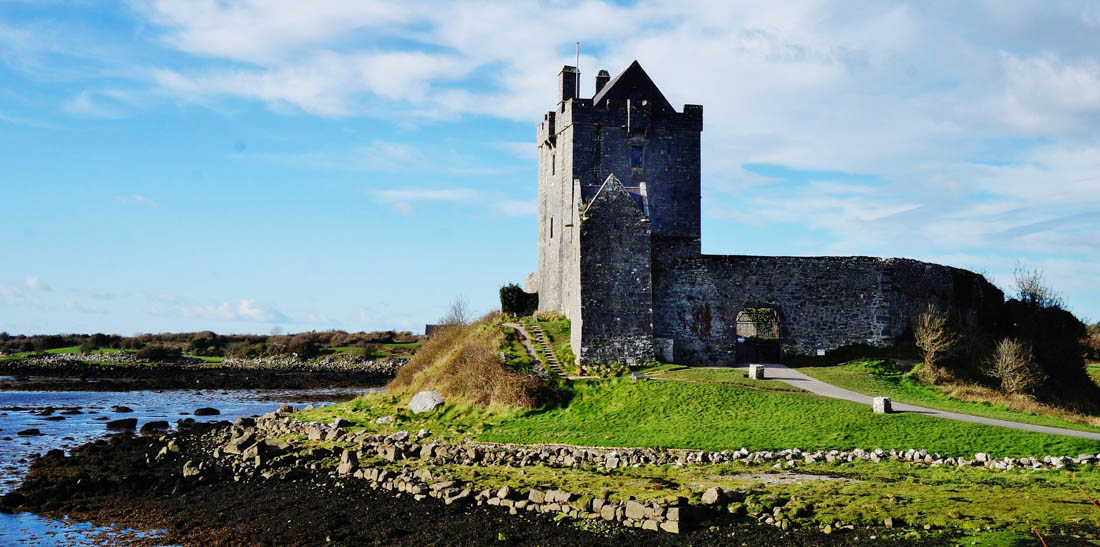
Ireland is a cultural, proud, and green country. The famous beauty of this place is one of the main draws. Other popular activities here include museums, adventure travel, national parks, and history and culture.
Ireland is a unique country with a deep historic culture, a beautiful countryside with rolling green hills, exciting cities, and friendly people. You'll find good food, interesting natural landscapes such as the Giant's Causeway, terrific hikes through the countryside, surfing at the beach, and cultural experiences in the cities.
UK and Ireland: Pros and Cons
- Popular museums and historical sights
- Great culture, history, and arts
- Numerous theater shows
- Good music scene
- Good for hiking
- Great road trips
- Family-friendly
- Good for couples and romance
- Good for backpackers and budget travelers
- Good for students
- Impressive beauty
- Less attractive beach
- Not as many national parks
- Less adventure activities
- Beautiful national parks
- Not as many big cities
- Less theater options
- Less active music scene
- Less popular for students

How is the UK different from Ireland?
Which is better for a holiday.
Below we will examine the differences and similarities between the UK and Ireland. With this information, you can decide for yourself which place is better for your next trip.
Are the Museums and Historical Sights Better in the UK or Ireland?
Both Ireland and The UK offer a variety of museums and places of interest, but The UK generally has more to choose from.
The museums and tourist attractions in The UK are world-renowned. Visitors will find some terrific museums not just in London, but all over the country. For starters, the British Museum is world famous, but York also has the Railway Museum. The smaller town of Bath has its Baths, and you'll find plenty of art galleries all over such as Kelvingrove in Glasgow or the McManus in Dundee.
London : The city has so many iconic sights that we can't list them all, but some of the most famous include the Tower of London, Buckingham Palace, St. Paul's Cathedral, Westminster Abbey, Big Ben, and the British Museum. You can fill many days exploring the treasures found at each of the venues.
Edinburgh : The most famous sights include the Edinburgh Castle, the Palace of Holyroodhouse, and the National Museum of Scotland. There are also kid-friendly museums like Camera Obscura.
Bath : The main draw to Bath is the rich history and most sights are focused on the area's spa city past. The Roman Baths are a highlight of a trip to the city, but other not to be missed places include Bath Abbey, the Royal Crescent, and Pulteney Bridge.
You'll find a good number of museums and monuments packed into Ireland. Visitors will find a variety types of museums all across the country. History, science, art, and kid-friendly museums are everywhere, showcasing the culture, history, and life of the Irish people. A few of the best in Dublin are the Little Museum, the National Museum of Ireland with its multiple branches, the Irish Whiskey Museum, the Kilmainham Gaol, Dublinia, and the Jeanie Johnston Tall Ship and Famine Museum, among others. If you're visiting Galway, check out the Galway City Museum, Lynch's Castle, Monkey Business Children's Museum, or the Fisheries Watchtower Museum. Also, in Cork, the Cork City Gaol and the Crawford Art Gallery are visitor favorites, although there are many more.
Is the UK or Ireland Better for Culture, Arts, and History?
The UK and Ireland both offer great history and culture to travelers.
The UK offers world-famous historcal and cultural sights and attractions. This is one of the main reasons why so many people come here every year. Thousands of years of history is on display all over the U.K. With historical destinations such as London, Stonehenge, Edinburgh, Cardiff, numerous castles, and historical small towns, history lovers will find plenty to do here.
See also Free and Cheap Things To Do in Belfast , and The Castles of Scotland .
With a long list of famous historical and cultural attractions, Ireland brings in many visitors. Plenty of historical attractions are popular destinations for visitors, especially the castles, small historic towns, and huge monuments. At the Rock of Cashel, you can see the ruins of this historic and beautiful castle from the 12th century. Reginald’s Tower in Waterford is said to be the oldest building still standing in Ireland, and can be toured while also exploring the surrounding city. Glendalough is the home of a monastery and famous tower, as well as stunning natural landscapes. And at Newgrange, you can see this ancient 5000 year old megalithic cemetery. The Blarney Castle is home of the Blarney Stone, and is one of the most famous sites in the country. In Dublin, don't miss the Dublin Castle, the St. Patrick's Cathedral, or the Kilmainham Gaol, all of which showcase a selected period of Irish history. No matter which area of the country you visit, Ireland offers historic sights and attractions of all types for every age.
Is the UK or Ireland Better for Big City Activities?
The UK is considered to have more larger cities than Ireland.
Travelers will also find plenty of sights and attractions in the big cities of The UK that attract lots of visitors. London is the first name that comes to mind when thinking of large cities in Great Britain, and rightly so as this huge global city attracts visitors from everywhere because of its history, museums, theatre, nightlife, food, and monuments. After London, the U.K. has many large cities with their own atmosphere and cultural experiences to offer. Liverpool, Manchester, Cardiff, Edinburgh, and Belfast all have terrific attractions, nightlife, and cuisine for visitors.
See also 1 Day in London On A Budget , and The Best Things to Do in Glasgow .
Ireland also has some big cities with many activities. Dublin and Cork are the largest cities in Ireland, followed by Limerick and Galway, but even these last two have small populations compared to other cities in Europe. In Dublin you can find plenty of restaurants, cafes, museums, universities, and historic sights. Outside of this city, it's hard to find the same urban vibe. The rest of the country has smaller cities and towns and plenty of rural areas with stunning landscapes, but lacks the large city environments.
Is the UK or Ireland Better for Small Towns and Villages?
Ireland offers more villages and small towns to explore than The UK.
Ireland also offers a huge number of beautiful small towns with plenty of sights and activities. A few of the smaller towns in Ireland are some of the country's most popular travel destinations. Kilkenny has a nearby castle, abbey, a gorgeous cathedral, and a historic medieval area of town. Kinsale has a quaint harbor and colorful houses. Tralee on the southern coast has beautiful seaside views and stunning cliffs. And the ring of Kerry offers even more stunning coastal views and small towns such as Portmagee. Exploring the small towns of Ireland is an absolute requirement for any itinerary, as here you'll find the true local culture and history of the island.
See also 10 Easy and Ambitious Day Trips from Dublin Ireland .
The UK is a great destination to visit small towns and villages just waiting to be explored. Some of the most popular and scenic small towns in England include St. Ives, Bath, Castle Combe, Bibury, and Shaftesbury. And in Scotland, don't miss Tobermory, Anstruther, Linlithgow, St. Andrews, and others. In Wales, you'll find beautiful scenery in Tenby, Solva, Rhossili, and others. Outside of Belfast in Northern Ireland, you'll find small town charm in Bangor, Kilkeel, and Portstewart. All of these towns across the nation offer that traditional quaintness that visitors seek from a typical town in the countryside. You'll find pubs, historic architecture, the occasional ruins of castles and churches, farms, and more.
Is the UK or Ireland Better for Theater?
With more venues to choose from, The UK is more regarded as a theater destination.
The theater and performance venues in The UK draw crowds from around the world. The London theatre scene is world famous, and when visiting, seeing a show is a must. But venture further into the rest of the country for even more. Stratford-upon-Avon is the birthplace of Shakespeare, after all. You'll find even more theatre experiences in Manchester, Edinburgh, Brighton, Cardiff, and more.
London : The West End theater district is where you'll find the most popular musicals. Famous theaters include Apollo Theatre, Palace Theatre, and Piccadilly Theatre. There are often Wednesday matinees that are a bit cheaper than the evening shows. You may also be able to get discounted last minute tickets if you're visiting during the less touristy times.
Stratford-Upon-Avon : Shakespeare enthusiasts must check out a Shakespeare play at the Royal Shakespeare Theatre. There are often tickets available the day of for a reduced price.
Visitors can also check out a show in Ireland. Local theaters with community productions can be found in many smaller cities. In Dublin, if you're looking for a show, check out the Abbey Theatre, the Gaiety Theatre, the Smock Alley Theatre, or the Olympia Theatre. Elsewhere in Ireland, make sure to visit the National Folk Theatre in Kerry (Siamsa Tíre), or the Druid Theatre in Galway.
Is the Food Better in the UK or Ireland? Which Country Has the Best Restaurants?
Foodies will appreciated the dining options available in The UK a bit more than Ireland.
The UK has a huge number of terrific restaurants. In the last few decades, the food scene in Great Britain has taken off as world-class chefs have opened restaurants featuring menus from all corners of the globe. When visiting the U.K., you'll be pleasantly surprised by the quality and creativity of the food. That being said, traditional British food itself is not particularly famous. Fish and Chips, meat pies, black pudding, bangers and mash, and "toad in the hole" (sausage in batter) tend to be first on people's lists of interesting foods to try when visiting. But they are not the final say in modern British cuisine anymore.
York : Meat pies, fudge, and fish and chips are just some of the culinary experiences you'll find here. The Shambles Market has vendors that sell a wide variety of cuisines. There are also food trucks throughout town that offer affordable and delicious meal options.
There are plenty of up and coming restaurants around Ireland. Traditional Irish foods can be found at many restaurants around the country. One of the most popular dishes includes various forms of Irish stew that use meat, potatoes, and vegetables. Shepherd's Pie takes this stew and adds a layer of mashed potatoes to the top. Colcannon and Champ is a form of mashed potatoes that mixes in cabbage, onions, and sometimes bacon. If you're tired of potatoes, salmon in various recipes is also common and popular. Also try the black and white pudding, which is actually blood sausage and not dessert. Other popular dishes include vegetables cooked into stews with local herbs. Of course, the local beer is quite popular, too. And don't miss the more interesting forms of Irish soda bread as well.
Kinsale : For such a small town, it really has an impressive food scene and many people consider it to be the culinary capital of Ireland. The food scene includes Michelin starred restaurants and local cafes.
Is the UK or Ireland Better for Nightlife?
For nightlife, head to The UK instead of Ireland.
The nightlife in The UK has something for everybody. London is one of the most popular cities in the world for nightlife. From bars and clubs to theatre shows, the activity in the city is always pulsing. Liverpool, Manchester, Edinburgh, Belfast, and other large cities also have plenty of nightlife options, too, with active nightclubs, varied music scenes, and theatre productions.
London : Some of the best neighborhoods for nightlife are Camden, West End, Soho, and Shoreditch. There are many festivals, concerts, and shows worth checking out and the nightlife scene is diverse enough that there really is something for everyone.
Glasgow : The city has some of the best nightlife in the entire country. There are clubs, bars, techno warehouses and more. Some of the best clubs include Sub Club, The Berkeley Suite, and The Garage.
See also London's Party Hostels .
If you're looking for night time activities Ireland has a few options to choose from. Dublin and Galway, as the two largest cities, are the obvious choices for nightlife. Dublin claims to be one of the party capitals of Europe, and offers a variety of venues from bars and pubs to undergrounds nightclubs, as well as theater, fine dining options, and relaxed bars and cafes where you can have a drink with friends. Galway has a similar scene with a mix of bars, pubs, and nightclubs, many with live music and plenty of dancing. In Cork, much of the nightlife scene is dominated by the student population of the area, as large universities are nearby. Check out SoHo and the other spots on the Grand Parade. Plenty of other towns and smaller cities offer an array of pubs, bars, and clubs, too.
Dublin : Temple Bar is where you'll find the greatest concentration of pubs and nightlife. The city is among the friendliest and most welcoming, and this is seen even in the vibe around town at night.
Is the UK or Ireland Better for Music?
The UK is more popular choice to experience the music scene.
The UK has a thriving music scene. London is the obvious choice if you're looking for live music, as it hosts nightclubs, bars, theatre shows, DJ events, and more. But other cities around Great Britain also have their own music scenes, especially Liverpool, Manchester, and Belfast. From family-friendly theatre productions to raving dance-filled nightclubs to intimate venues, there is something musical for everyone.
London : Famous music venues include Dominion Theatre, the Roundhouse, and Dublin Castle.
Birmingham : The city has long been a haven for musical creativity, and its influence over the global music scene is apparent. Popular music venues around town include Ghetto Golf, Digbeth Dining Club, and the Sunflower Lounge.
Glasgow : Known to some as "the city of music", you'll find a wide range of music venues, live shows, festivals, and even a great underground music scene.
Liverpool : Known as the birthplace of the Beatles, the city has been established as a rock and pop capital since the 1950s.
Edinburgh : In addition to a wide range of live music venues, there are also a number of music festivals held in town.
While it's not known for it's music scene, Ireland has some options for casual listeners. Dublin has many pubs, bars, and clubs featuring a variety of live music. Some of the places showcase new artists and popular dance music, while others host traditional Irish music. Galway, Cork, and other cities are similar in that many pubs host local artists as well as touring musicians. The larger cities also host touring concerts as you would expect in any large city, too. Generally, seeing live music is easy and accessible in Ireland, and quite fun if you're looking for something to do in the evenings.
Is the UK or Ireland Better for Beaches?
Both The UK and Ireland have great beaches worth visiting.
The beach in The UK is worth checking out. The southern coastline of Britain has a variety of beach areas, some with wide sandy beaches lined with restaurants, boardwalk shops, and other fun activities. While the water is generally cold, the summer months are still quite popular. Some of the more visited spots include St. Ives, Brighton, Newquay, Bournemouth, and West Wittering. This is just a few, and many more areas are favorites with locals, too.
Ireland is a good spot to see the beach. With a huge amount of coastline, this island nation has plenty of beaches. Some are in protected coves, while others are more exposed and have large waves popular with surfers. Despite the colder temperatures, the beaches here can still be fun because the natural scenery is beautiful. Some of the beaches are in natural coves surrounded by cliffs, rocks, and epic views. Swimming is very possible and popular in the summer months with locals and visitors alike. A few of the most popular beach areas include Inchydoney Beach in County Cork, Dog's Bay near Galway, Strandhill near Sligo, Silver Strand in Country Donegal, and Portmarnock Beach near Dublin. However, there are many more to explore.
Is the Shopping Better in the UK or Ireland?
The UK often provides a better shopping experience than Ireland.
The UK is well-known for its shopping. London offers plenty of shopping experiences all over the city, and has various neighborhoods with different styles, trends, and vibes. Other large cities also have their own shopping districts where locals and travelers alike can find anything they want from clothes to gifts to locals artisan crafts.
London : With so much iconic shopping around town, it's hard to decide where to go. Head to Oxford Street, Regent Street, or Piccadilly Circus for a quintessential British shopping experience.
Plenty of visitors enjoy shopping while in Ireland. While the larger cities and towns such as Dublin and Galway have more variety of shops such as clothing boutiques, souvenir shops, and local galleries, even the smallest towns have nice shopping options. Some of the more popular local arts and crafts for purchase include tweed fabrics in Donegal, Aran Wool clothing items, and hand-crafted pottery. In Dublin, visitors can find several large shopping malls such as Dundram Centre, and more shops in George's Street Arcade, Liberty Market, and Cow's Lane.
Is the UK or Ireland Better for Christmas?
The Christmas season is more busy in The UK than Ireland.
The UK is a very popular destination during Christmas. While London is an easy choice for the holiday season, as it decorates major landmarks and offers fun winter activities, plenty of other locations around the country are also worth visiting. Edinburgh has a festive atmosphere as well with large trees, festivities, and decorations. Bath, Cardiff, York, and Bournemouth all put on their own activities, too.
London : There's Hyde Park Winter Wonderland, outdoor ice skating, and beautiful Christmas lights throughout the city. You can also listen to Christmas Carols in Trafalgar Square or see a classic Christmas show.
Plenty of visitors enjoy Christmas activities while in Ireland. Dublin, Galway, Cork, and many of the other towns and cities put on huge light displays during the holidays. The public squares and town centers have Christmas trees, markets, festivals, and other activities. There's even a polar swimming plunge in Dublin. Some of the famous castles and manor houses also have holiday decorations and festivities which bring in large crowds. The local pubs in many small towns become the center of activity as people gather in the warm and brightly decorated establishments. Also, many of the hotels and smaller B&B's decorate their grounds and have special dinners and parties. For the best Christmas markets, head to Cork or Galway, or even Belfast in Northern Ireland.
Is the UK or Ireland Better for Christmas Markets?
The UK provides a more festive Christmas market atmosphere than Ireland.
The UK has some Christmas markets worth visiting during the holidays. Visitors over the holidays can find Christmas markets in London, Bath, Bournemouth, Cardiff, and Edinburgh, among others. In addition to shopping, many of these markets offer fun activities, ice skating, shows, Santa encounters, and delicious holiday cuisine.
London : The city has many Christmas markets. There is Winter Wonderland Christmas market, Southbank Centre Winter Market, and Selfridges Christmas Market, among many others.
Ireland has some Christmas markets for those that seek them out. The best Christmas markets can be found in Cork and Galway, although many other small towns offer fun festivities, too. Dublin offers a few different holiday markets around the city, such as at Dublin Castle and Guiness Storehouse.
Is the UK or Ireland Better for Hiking?
The UK provides a better hiking experience than Ireland.
Many visitors go to The UK for the hiking trails. Hiking and "walks" are very popular ways to experience and explore the beautiful landscapes of the U.K., as a number of long routes weave their way through the countryside and along the coastline. It's quite popular to do a multi-day walk with stopovers in quaint towns, especially as many of these walks are on routes with easy elevation and clearly defined paths with good signs. Some of the more popular routes include the Hadrian’s Wall Path, The Cleveland Way, Norfolk Coast Path, and Cotswold Way. If it's more strenuous mountain hiking that you're after, definitely visit one of the national park areas such as Cairngorms, Peak District, Lake District, or Snowdonia, as they all offer mountain trails with gorgeous scenery.
Isle of Skye : Hikes on the island range from family-friendly to some of the most challenging in Scotland. The setting is dramatic and beautiful and the hikes are a varied as the landscape. Some of the most popular hikes include the Fairy Pools, the Old Man of Storr, Neist Point Lighthouse, and the Quiraing.
Snowdonia National Park : There are approximately 1,500 miles of walking paths and hiking trails in the area. You can hike to waterfalls, along beaches, or to the top of Mt. Snowden. Aber Falls is a popular trail or you could explore lakes and try to see wild ponies along the Llyn Idwal Trail. For a particularly strenuous and adventurous trail, head to Glyder Fawr or The Snowdon Horseshoe Circular Walk.
Outer Hebrides : The islands offer some of the area's best hiking. You'll pass by stunning beaches, see unique wildlife, and enjoy a remote and tranquil setting. Follow the Hebridean Way, which covers the full length of the archipelago. It spans 156 miles and goes through 10 islands with 2 ferry trips.
Lake District National Park : There's a huge selection of hikes to choose from in the area, ranging from easy strolls to more strenuous climbs. The park offers some of the best hiking in the country and you can spend days exploring. Some of the favorite hikes in the area include Scafell Pike, Helvellyn, and Catbells.
Plenty of visitors go hiking around Ireland. The rolling mountains and beautiful green countryside provide stunning hikes in all parts of the country. From the cliffside walks with epic views to the peaks in the interior of the island, there's a trail for everyone. Some of the most popular routes include the treks around Glendalough where you'll see the Spinc cliffs, waterfalls, and distant views of the lake. If you're looking for a mountain to hike, Diamond Hill in County Galway, Carrauntoohil in Kerry, or Slieve Gullion all provide stunning views, physical challenges, and plenty of wilderness opportunities.
Connemara : The landscape is considered to be some of the most beautiful in all of Ireland and there are many walks and hikes that let you experience it. Some of the best hikes are The Cong and Clonbur Forest Trail, the Claddaghduff Quay to Omey Island Walk, and Mount Gable Walk.
Is the UK or Ireland Better for its National Parks?
Ireland usually beats out The UK for its wide range of national parks.
Many visitors go to Ireland to see the national parks. The 6 national parks here offer stunning beauty and a variety of sights and attractions both within the parks and nearby. Five of the parks are along the western coast, and it might be best if you had your own vehicle to see some of all of them. Killarney National Park is part of the Ring of Kerry and was the first park. You can find historic manor houses, the largest mountain in the country, and a variety of wildlife. Wicklow Mountains National Park is on the eastern side, and in the area you'll find Powerscourt Gardens, Glendalough with its famous round tower, and the beautiful Glenmacnass Waterfall. In all of the parks, you'll find hiking trails, epic views, camping, castles, gardens, local wildlife, and other activities such as bird watching, horseback riding, and more.
The UK is a good destination to visit the national parks. A few of the most popular national parks in the U.K. include Snowdonia, Peak District, Lake District, Cairngorms, and Loch Lamond. Most of these parks offer beautiful mountain scenery, rivers, camping, lakes, and outdoor experiences for the whole family.
Is the UK or Ireland Better for Adventure Travel?
Ireland generally offers more adventure travel options for travelers than The UK.
Ireland has some adventurous travel experiences that often attract visitors. Some of the most popular adventure activities here are sea kayaking, mountain biking, horseback riding, orienteering, hiking, caving, and more. Many of these activities are found in the countryside and coastal areas of the country, or around the 6 national parks. It's common for travelers to book a single-day tour to do some of these activities, as the guides or outfitter companies make it easy and accessible.
The UK is a good destination for those who seek adventure travel experiences, as there are a few options to explore. Some of the more popular areas to participate in adventure sports are in the more wilderness regions and national parks of the nation. Zip lines, rock climbing, kayaking, paragliding, river rafting, and canyoning are all popular in the mountainous areas. Surfing is sometimes found along the coast, too.
Is the UK or Ireland Better for Visiting the Mountains?
Both The UK and Ireland offer a similar amount of great mountain activities for visitors.
The UK does have some mountain areas to explore. Many of the national parks in Britain offer gorgeous mountain scenery with hiking, horseback riding, adventure sports, camping, and more. Snowdonia, Peak District, Lake District, Cairngorms, and other parks have plenty of mountain adventures waiting for visitors. Also, the northern areas of Scotland are rugged and mountainous. The Hebrides for example, offer amazing natural landscapes where the mountains meet the sea to the north.
Ireland is a good destination to visit the mountains, as there are some fun activities. While not too high in elevation, the mountains in Ireland still offer great views, terrific hiking opportunities, and plenty of outdoor activities such as camping, horseback riding, and more. The highest peaks are found in the MacGillycuddy Reeks range in County Kerry, and visitors here will find plenty of natural beauty along with outdoor activities and hiking trails. Wicklow Mountains National Park and the surrounding area is another very popular destination as it also combines mountain views with historical sights, hiking, waterfalls, and more. Killarney National Park is another area worth visiting due to the beauty of the lakes and mountains.
Is the UK or Ireland Better for Watersports?
While The UK and Ireland both have plenty of watersports, overall Ireland is considered to be better for travelers seeking these activities.
Ireland has some watersports activities that attract many visitors. With a huge stretch of coastline, many visitors here participate in a variety of activities despite the relatively cooler weather. As long as you have the proper equipment for the activity, there's no reason why you can't enjoy the stunning beauty of the water. Surfing is very popular on the beaches, as the waves can be consistent and strong in many areas. Kayaking both on the coast and inland is also a great way to see Ireland from a different angle. Stand-up paddle boarding is another good option for areas with calmer waters. And many of the bays and harbors have clear waters with unique marine life, which makes wild swimming , scuba diving, and snorkeling a fun activity after putting on a thick wetsuit. Wind surfing and kite surfing are also possible. As with many other activities, you'll find plenty of surf shops and tour providers that can take you to the right places with the right equipment.
The UK is a good destination to participate in watersports, as there are some fun activities. Surfing is popular in some areas of the coastline such as Cornwall and in Snowdonia National Park. It's also possible to find a few river rafting outfitters around the country, too. Kayaking, fishing, and boating are all quite popular along the shore, too.
Is the UK or Ireland Better for Outdoor Activities?
While The UK and Ireland both have plenty of outdoor activities, overall Ireland is considered to be better for travelers seeking outdoor adventures.
The outdoor activities and experiences of Ireland attract many visitors. As Ireland is a fairly sparsely populated country with wide open spaces and beautiful landscapes, visitors will find plenty of outdoor activities of all types. The national parks are a good place to start, as you'll find hiking, camping, horseback riding, climbing, and more. And along the lengthy coastline, visitors can experience kayaking, surfing, swimming, hiking along the cliffs, and perusing gardens and castles. Visiting farms and the other agricultural regions are also quite popular. There's no shortage of outdoor activities in Ireland, so make them part of your itinerary.
The outdoor activities and attractions of The UK are worth exploring. Outdoor activities in Great Britain include hiking, horseback riding, kayaking, adventure sports, camping, and more. It's easy and accessible to get out into nature here from the big cities, and a diverse array of activities can be found.
Is the UK or Ireland Better for a Road Trip?
The UK and Ireland both offer a wide array of great road trip possibilities for your next trip.
Taking a road trip through The UK is very good way to see the countryside and smaller destinations. The roads in the U.K. are great, and with plenty of small villages, national park areas, seaside destinations, and historical sites, a road trip is a great way to see the country.
Ireland is an extremely popular destination for those that want to take a road trip. The numerous small towns, natural scenic spots, castles, agricultural areas, and other out-of-the-way places make Ireland a terrific place for a road trip. In fact, in many ways it's easier to get around this country by car than with public transit if you're planning to visit many of these smaller sights and attractions. Many visitors make a large loop around the country from Dublin, stopping off at cliffside viewpoints, beaches, castles, small towns, and national park areas with mountains and hiking. The Ring of Kerry is a very busy area for a road trip for obvious reasons - it combines natural beauty with historical towns. The Dingle peninsula is another popular drive for similar reasons. Rental cars are generally easy to hire in Dublin or Galway, so planning a road trip through Ireland is quite easy.
Is the UK or Ireland Better for Families?
The UK and Ireland are both great destinations for the whole family.
The UK is an amazing family-friendly country to visit. From the big cities to the countryside, if you're traveling with kids you'll find something great to do. London has family-friendly museums and attractions such as science museums, the Tower of London, and amusement parks. Plenty of beach resort areas are found along the coastline, too, such as in Blackpool, Cornwall, the Isle of Wight, or Paignton. Head north to Snowdonia for hiking and watersports, or to Scotland for the lakes, historic railways, and castles. Kids of all ages, and parents also will love if.
London : Whether you do a Harry Potter Tour, take a ride on the London Eye, or enjoy afternoon tea, there are plenty of activities for kids around town. The Harry Potter Studio Tour is fun for everyone, but should be booked well in advance as it sells out. Theatre enthusiasts will enjoy catching a musical in West End and sampling dim sum or a hot pot in Chinatown. There are often Wednesday matinee showings that are perfect for kids with early bedtimes.
York : The city does an amazing job bringing history to life in a way that kids will enjoy. The JORVIK Viking Centre transports visitors back in time and introduces them to a fully immersive viking experience. The York Dungeon is great for older kids as long as they don't scare easily. Actors and special effects offer a terrifying and entertaining visit through a York dungeon. Harry Potter fans will enjoy exploring the potion shops and broomstick stores along the iconic Shambles, which is said to be an inspiration for J.K. Rowling's Diagon Alley.
Ireland is an extremely popular country to visit for families. Long cliff walks, castles, stunning beaches, gardens, lighthouses, and terrific museums are all some of the best things to do with families in Ireland. In Dublin, you'll find the Imaginosity Childrens Museum, the Dublin Zoo, the Natural History Museum, and Dublin Castle to name a few. Not far from Dublin you can find more castles, the Medieval Museum in Waterford, and Viking history. On the west coast, don't miss the cliffs of Moher, with their epic views, or the ancient stones of the Burren. And the small towns of the Ring of Kerry and Dingle Peninsula are fun for everyone, too.
Is the UK or Ireland Better for Couples?
The UK and Ireland are both great to visit as a couple.
The UK is a good country for couples to visit. Plenty of destinations in Great Britain are great for couples. London for starters has many nice hotels, restaurants, and romantic spots around town. Or, head to the countryside of Scotland or Wales for castles, beautiful natural scenery, lakes, and more. If you're looking for an active trip, check out some of the national park or wilderness areas such as Lake District, Snowdonia, or Cairngorms. Also, many of the beach destinations have nice resort areas for couples, too.
London : With every type of entertainment that you can imagine, this city is the ultimate couple's getaway. There are world class musicals, evening concerts, and restaurants of every style, cuisine, and budget. It's easy for couples to fill days in this vibrant city.
Bath : With its beautiful architecture and fascinating history, this city is perfect for couples. Take a canal cruise or wander through the scenic areas to enjoy a romantic trip.
Snowdonia National Park : Explore the beautiful outdoor scenery by taking one of the many hikes in the park. There are many diverse walking routes or you can head to the top of Mt. Snowden. There are also waterfalls and castles that couples can explore.
See also Hostels in Liverpool for Solo Travellers, Groups, & Couples .
Ireland is a nice destination for couples. The larger cities as well as the countryside offer plenty of romantic places such as Powerscourt Gardens, the famous and well-photographed Wicklow National Park, the many castles and manors around the island, and the fine dining restaurants and theaters of the cities. Many of the small towns are very picturesque and have plenty of activities for couples, not to mention the quaint bed and breakfasts and walking trails out into the countryside. Don't miss Ashford Castle, Adare Manor, or the Latin Quarter of Galway full of boutiques and cobblestone alleyways. Whether you're on a honeymoon in Ireland or just looking for a romantic weekend getaway, you'll find plenty of romantic opportunities here.
See also Hostels in Galway, Ireland for Backpackers, Couples, and Groups , and Hostels in Killarney for Solo Travellers, Couples, and Small Groups .
Is the UK or Ireland Better for Backpackers and Budget Travelers?
The UK and Ireland are great places to visit for backpackers and budget travelers.
The UK is a very popular country for backpackers and budget travelers. The overall price of travel in the U.K. can be quite high, so backpackers and budget travelers will need to plan ahead to find affordable accommodations and entertainment options. London in particular offers plenty of hostels and budget accommodation options, but they are still priced higher than in many other cities. Smaller cities, towns, and destinations in the countryside can usually be more affordable. Prices aside, the overall amenities and infrastructure for budget travelers and backpackers are everywhere and very frequent. It's easy to find lower-priced options everywhere, along with plenty of free and cheap activities, so don't let the overall costs dissuade you from visiting.
London : Although the city is very expensive, it has tons of hostels, affordable restaurant options, and great public transit. There's a huge backpacker network here and it's easy to meet other travelers. The nightlife scene is also second to none.
Edinburgh : The city has some good hostels and an active nightlife, so it's not hard to find other travelers to hang out with. It's a well visited city with many areas that attracted younger travelers or students.
Lake District National Park : There are plenty of camping options throughout the park with a range of hookup facilities to meet everyone's needs. Waterfront campsites are also available.
See also Hostels for Solo Travellers, Female Travellers, & Couples in London, England , London's Party Hostels , and London Hostels Near Kings Cross .
Ireland is very popular with the backpacker crowd. Ireland can be a very affordable destination for budget travelers and backpackers due to the large number of lower-cost accommodations, affordable public transportation, and variety of cheaper food options. Hostels are common, especially in the larger cities and towns, as are budget-friendly hotels. Also, many of the sights and attractions are outdoors which means that they are often free or have cheaper entrance fees. Many of Ireland's best attractions are the cliffside or wilderness hikes such as those at the Cliffs of Moher (around €10), Glendalough in Wicklow Mountains National Park, or the Howth Cliff Walk loop. For food, if you eat your meals at a pub or small sandwich shop, you can save plenty of money. Many pubs also have a set menu as an early dinner which is cheaper if you arrive before 6:00 p.m. The trains and buses are also very affordable, especially since the country is not so large that every destination is just a few hours away at the most.
See also Dublin Hostels Near Temple Bar , Social Hostels in Dublin, Ireland , and Hostels for Groups in Dublin, Ireland .
Is the UK or Ireland Better for Students?
Most students consider The UK to be the better destination than Ireland.
Many students frequent The UK . Students will find not only a huge number of universities in the U.K., but also a large support network on top of affordable travel opportunities. Many of the major universities around the country are in locations with fun activities, vibrant nightlife, and affordable sights and attractions.
London : The city has a number of universities and is a popular study abroad destination. It's also a very diverse city, so international students will feel right at home.
Birmingham : With world class academic institutions and a very diverse and international population, this is a popular place for international students to study.
Oxford : At its heart, Oxford is a college town and students are at the heart of the city and its culture.
Cambridge : The town is home to more than 25,000 students who come from 140 different countries. This is one of the most iconic university towns in the world, and there's really no better place for students to visit or reside.
St. Andrews : At its heart, this is a university town with a long standing history in teaching. You'll find the town's population doubles when students are in town.
See also Hostels in Glasgow, Scotland for Students, Backpackers, and Solo Travellers , Hostels in England for Backpackers and Students , and Hostels in Scotland for Backpackers and Students .
It's common for students to visit Ireland. With a variety of affordable accommodation options and active student neighborhoods featuring nightlife, cafes, and activities, it's easy to see why Ireland offers a lot for students. Various universities around the country draw large number of students both from Ireland and around the world. Dublin, Galway, and Limerick all have multiple universities and active student scenes.
See also Hostels in Ireland for Students and Backpackers .
Is the UK or Ireland Easier for Transportation? Which is Easier to Get Around Without a Car?
The UK has better transportation options to get you around the region.
The UK has an effecient and thorough public transportation system which can take you anywhere in the country. Public transit in the cities, combined with the national railway system makes it very easy for travelers to move around the country without their own car. London as well as other major cities are also hubs for airlines with connections abroad. Also, as an island nation, a huge number of ferry services connect Britain to Ireland as well as mainland Europe. The smaller islands just offshore are also connected by regular ferry routes, too.
- Traveling by train is extremely popular.
- It's possible to travel by bus.
- It's possible to travel by car.
- Travel by airplane is possible.
Public transit in Ireland is fairly effecient and thorough. The train system in Ireland can take you almost anywhere you want to go, and fairly quickly and efficiently too. The bus system is also great, and can get you to many more destinations if the trains can't. The prices are affordable and the trains are safe and clean, just as anywhere else in Europe. The roads are also very good and it's easy to rent a car to get around the country. In fact, if you're planning to visit many of the smaller towns along the coastline, such as in the Ring of Kerry, having a car is necessary because of a lack of transit options. Some of the national parks are also difficult to visit without a car, too. Otherwise, every larger city and town is accessible with trains or buses.
- It's very easy and convenient to travel by train.
- It's fairly easy to travel by bus.
- It's possible to travel on ferry boats.
- Travel on cruise ships and excursions is possible.
- It's quite common to get around if you join an organized tour.
- It's quite common to travel by car.
- It's possible to travel by airplane.
Is the UK or Ireland more Comfortable for a Trip?
The UK and Ireland are both modern and comfortable places to visit.
Generally, The UK is considered to be a comfortable and luxurious place to visit. Whether you're traveling on a budget or looking for higher-end luxurious accommodations, Great Britain offers a high-standard of living and travel for visitors. As a modern, affluent nation, tourists will find comfortable amenities at any price point along with an extensive network of transportation to get around the country. Nice restaurants, delicious food, and an abundant supply of professional tour operators and entertainment venues make a trip to the U.K. very easy, convenient, and comfortable.
People often come to Ireland because it is such a comfortable and luxurious destination. Ireland is a modern and prosperous country with a high standard of living. So, as a traveler you can expect plenty of modern comforts no matter your price range, as even budget hotels will have clean, modern facilities and nice amenities. The public transportation network as well as the road are of high quality and are very efficient. Visitors will find plenty of infrastructure for tourists such as tours, taxis, hotel concierges, and more. And of course, plenty of luxury hotels and tour providers are also available if you seek a higher level of comfort.
Is the UK or Ireland more Touristy?
The UK generally has a more touristy vibe than Ireland.
Plenty of tourists come to The UK every year, as it's a popular destination. London, Edinburgh, various castles, seaside resorts, and some of the national parks can be heavily touristy, especially in the peak summer months. Some of the smaller popular cities and towns for visitors also include Stratford upon Avon, Bath, Cambridge, Inverness, Stonehenge, and more. Despite the number of tourists, these destinations are still very manageable if you're on a trip and wish to see everything. It's also quite easy to avoid the crowds by escaping the larger cities or travel during non-peak seasons.
Ireland is somewhat touristy. Most visitors arrive in the summer months when the weather is warmer, but even then, the tourist crowds are not too bad. Even so, visiting in the shoulder season or in the winter will lead to a trip with less crowds. The most popular tourist attractions are the Cliffs of Moher, the Ring of Kerry, Glendalough, Powerscourt Gardens, The Rock of Cashel, Killarney and its surroundings, and the Blarney Castle. In Dublin, some neighborhoods can be quite busy such as Grafton Street, as well as the museums, Trinity College, and the Kilmainham Gaol. And while all of these places do see plenty of visitors, it's still manageable and accessible during the busy summer months.
For some great organized tour ideas, see The Best Family-Friendly Tours to United Kingdom , The Best Hiking & Trekking Tours in United Kingdom , The Best Historical Tours in United Kingdom , The Best One Week (7-Day) Tours in United Kingdom , The Best 3-Day Tours in United Kingdom , The Best Bicycle Tours in United Kingdom , Tours for Outdoor and Nature Lovers in United Kingdom , The Best Coach Bus Tours in United Kingdom , The Best Adventure Tours to United Kingdom , The Best Sightseeing Tours in United Kingdom , The Best Romantic Tours for Couples in United Kingdom , The Best Luxury Tours to United Kingdom , The Best Budget Tours to United Kingdom , The Best Tours for Seniors to United Kingdom , The Best 3-Day Tours from Edinburgh , The Best 3-Day Tours from London , The Best One-Week (7-Day) Tours from London , The Best One-Week (7-Day) Tours from Edinburgh , The Best 10-Day Tours from London , The Best 10-Day Tours from Edinburgh , The Best 2-Week Tours from London , The Best 2-Week Tours from Edinburgh , The Best Family-Friendly Tours to Ireland , The Best Hiking & Trekking Tours in Ireland , The Best 10-Day Tours in Ireland , The Best One Week (7-Day) Tours in Ireland , The Best 2-Week Tours in Ireland , Tours for Outdoor and Nature Lovers in Ireland , The Best Coach Bus Tours in Ireland , The Best Adventure Tours to Ireland , The Best Sightseeing Tours in Ireland , The Best Romantic Tours for Couples in Ireland , The Best Walking Tours in Ireland , The Best Luxury Tours to Ireland , The Best Budget Tours to Ireland , The Best Tours for Seniors to Ireland , The Best 3-Day Tours from Dublin , The Best One-Week (7-Day) Tours from Dublin , The Best 10-Day Tours from Dublin , and The Best 2-Week Tours from Dublin .

Should I spend more time in Ireland or the UK?
How long in the uk or ireland.
the United Kingdom and Ireland both offer a nice selection of activities for visitors. In our opinion, the United Kingdom has more to see and do, so we recommend that you spend more time in the United Kingdom than Ireland . However, 5-14 days is a good amount of time to spend in either destination.
Couples should spend more time in the United Kingdom than Ireland. You'll find plenty of romantic sights and fun activities in the United Kingdom that are great for a weekend getaway or a longer couple's trip.
Backpackers and budget travelers should spend more time in the United Kingdom than Ireland if your budget allows for it. With a larger number of budget-friendly sights, good nightlife, and active things to do, anyone traveling on a budget would have a good time in the United Kingdom.
- How many days should I spend in the UK or Ireland? Ideal Length of Stay --> UK 5-14 Ireland 5-14
A weekend in the UK or Ireland?
In the UK, you'll find live music, food, and hiking. The length of your trip often depends on your style of travel. Hiking can easily take up a good amount of your time here, too. Since there is so much to do in the area, a weekend is probably not enough for all of it.
Ireland is a great place to explore. Don't miss the history and culture, as that's what most people do. With so much to do, a weekend is probably not enough time to see everything. Your budget might influence how long you stay.
Five days in the UK or Ireland?
The UK is a great place to explore. It is common to spend five days here. Hikers are also drawn to this area. Five days is a great amount of time to relax and see the many things that the UK has to offer. Anyone can find something fun to do here.
It's hard to know how much time to spend in Ireland. Don't miss the history and culture, as that's what most people do. For many, it makes a great getaway for five days. With all of its activities, you can easily fill five days here. It has many unique tourist attractions and fascinating things to do.
A week in the UK or Ireland?
It's hard to know how much time to spend in the UK. In the UK, you'll find hiking, shopping, and museums. Many visitors also spend a good bit of time hiking. With all of its activities, you can easily fill one week here.
Many travelers enjoy the food, water sports, and hiking when visiting the green destination of Ireland. This country offers a variety of activities to choose from. If you have one week, this is a great place to go. This would be the perfect place to spend one week, as it has just the right amount of activities.
Two weeks in the UK or Ireland?
It's hard to know how much time to spend in the UK. In the UK, you'll find hiking, shopping, and museums. Many visitors also spend a good bit of time hiking. Two weeks is a great amount of time to relax and see the many things that the UK has to offer.
Many travelers enjoy the food, water sports, and hiking when visiting the proud destination of Ireland. This country offers a variety of activities to choose from. If you have two weeks, this is a great place to go. With all of its activities, you can easily fill two weeks here.
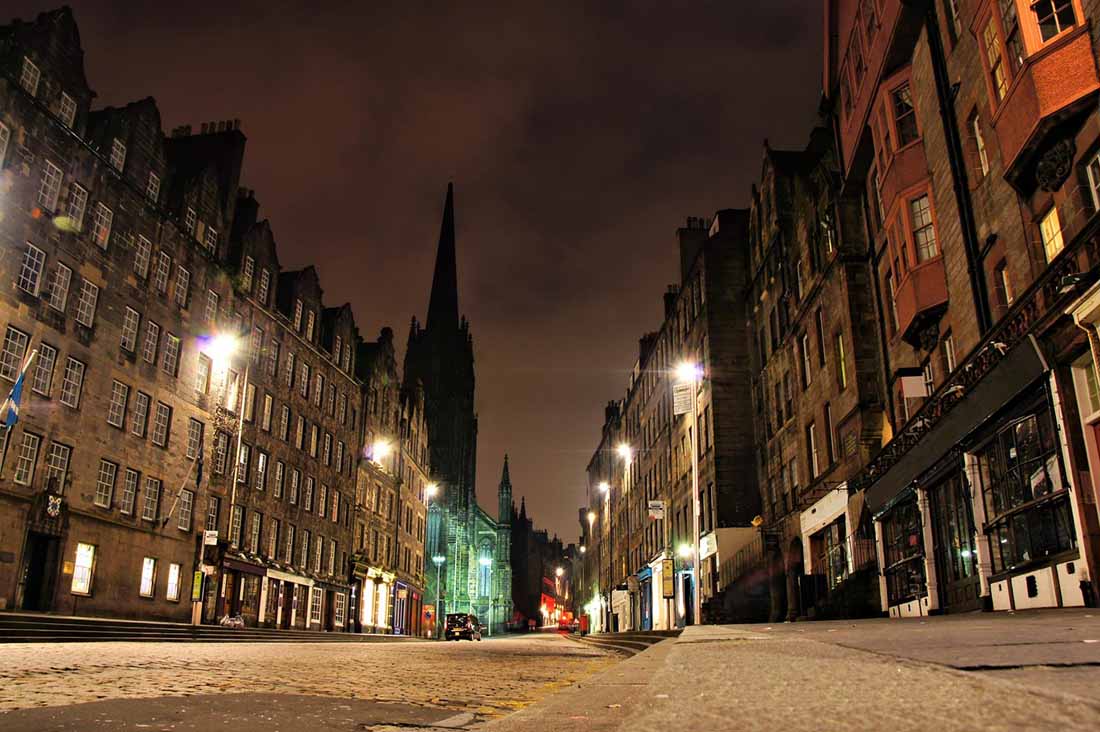
Which country is cheaper, Ireland or the UK?
These are the overall average travel costs for the two destinations.
- UK Prices Ireland Prices
- Average Daily Cost Per person, per day UK £ 153 Ireland £ 123
The average daily cost (per person) in the UK is £153, while the average daily cost in Ireland is £123. These costs include accommodation (assuming double occupancy, so the traveler is sharing the room), food, transportation, and entertainment. While every person is different, these costs are an average of past travelers in each country. What follows is a categorical breakdown of travel costs for the UK and Ireland in more detail.
Accommodation
- Accommodation Hotel or hostel for one person UK £ 76 Ireland £ 58
- Accommodation Typical double-occupancy room UK £ 152 Ireland £ 116
Compare Hotels in the United Kingdom and Ireland
Looking for a hotel in the United Kingdom or Ireland? Prices vary by location, date, season, and the level of luxury. See below for options and compare which is best for your budget and travel style.
Hotels in the United Kingdom
Hotels in Ireland
Kayak helps you find the best prices for hotels, flights, and rental cars for destinations around the world. Compare prices for multiple destinations when planning your next trip.
Local Transportation
- Local Transportation Taxis, local buses, subway, etc. UK £ 29 Ireland £ 21
Typical Local Transportation prices in the UK
Here are some examples of typical transportation prices from actual travelers in the UK:
- Taxi Ride £ 15
- Heathrow Express £ 18
- Luggage Storage £ 8.00
- Local Bus £ 3.60
- Rail to Airport £ 11
- London Map £ 1.29
- Oyster Card £ 36
- 24 Hr Bus Passes (for 2) £ 20
- Ferry to Isle of Wight £ 16
- Parking £ 2.00
- Toll Way - Mersey tunnel £ 1.70
- City bike hire Liverpool £ 6.00
Hired Cars and Shuttles in the UK
Some specific examples of transportation prices in the UK:
- Southampton Cruise Terminals: Private Transfer to London: $1,296
- From Glasgow: Private Day Trip to Edinburgh with Transfers: $831
- London Luton Airport (LTN): Transfer to Southampton Port: $827
- Bristol Airport (BRS): Transfer to Southampton city hotels: $778
- Edinburgh to Inverness Direct transfer: $773
- Inverness to Edinburgh Direct transfer: $773
- Glasgow to Inverness Direct transfer: $773
- Inverness to Glasgow Direct transfer: $773
- Southampton Port Transfer with Stonehenge stop-over included: $755
- From Edinburgh: Loch Ness Private Day Tour with Transfers: $742
- Giant's Causeway Private Tour by Five Star Luxury Transfers: $742
- London Heathrow Airport (LHR): Transfer to Bristol city: $678
Typical Local Transportation prices in Ireland
Below are a few samples from actual travelers for transportation costs in Ireland:
- Rental Car for a Day £ 13
Hired Cars and Shuttles in Ireland
Also for Ireland, here are a few examples of actual transportation services:
- Arrival Transfer: Dublin Airport DUB to Dublin in Luxury Van: $111
- Belfast | Coach transfer from / to Dublin: $11
- Chauffeured Transfers from Ennis to Galway: $262
- Child Friendly | Dublin Airport Transfer: $168
- Collon House & Garden To Dublin Airport Or City Private Chauffeur Transfer : $297
- Cork Airport Private Transfer: Killarney to Cork Airport: $281
- Departure Transfer: Dublin to Dublin Airport DUB in Luxury Van: $111
- Dingle To Kerry Airport Private Chauffeur Transfer: $185
- Druids Glen Hotel & Golf Resort To Dublin Airport Private Chauffeur Transfer: $238
- Dublin Airport & City Transfers : $182
- Dublin Airport Or Dublin City To Tankardstown House Private Chauffeur Transfer: $208
- Dublin Airport To Conrad Hotel Dublin Private Chauffeur Transfer: $178
Is it cheaper to fly into the UK or the UK?
Prices for flights to both Ireland and the UK change regularly based on dates and travel demand. We suggest you find the best prices for your next trip on Kayak, because you can compare the cost of flights across multiple airlines for your prefered dates.
- Food Meals for one day UK £ 37 Ireland £ 35
Typical Food prices in the UK
Below are a few samples from actual travelers for food and meal costs in the UK:
- Lunch at Starbucks £ 13
- Tea £ 6.00
- Morning Tea £ 2.50
- Ice Cream £ 3.00
- A Quick Snack £ 4.00
- Dinner £ 22
- Breakfast £ 8.50
- Dinner at Filling Station £ 10
- Afternoon Tea at Fortnum & Mason £ 39
- Lunch £ 14
- Morning Tea £ 6.35
- Pastry £ 5.00
Food Tours and Cooking Classes in the UK
Also, here are some specific examples of food and dining related activities in the UK.
- (Thur 7pm) Comedy Magic Show includes 1x Pizza & 2 glasses of Prosecco: $25
- Manchester: Hard Rock Cafe with Set Menu for Lunch or Dinner: $29
- Edinburgh: Hard Rock Cafe with Set Menu for Lunch or Dinner: $31
- Hard Rock Cafe Manchester with Set Menu for Lunch or Dinner: $33
- Hard Rock Cafe Edinburgh with Set Menu for Lunch or Dinner: $33
- London: Hard Rock Cafe with Set Menu for Lunch or Dinner: $34
- Pistachio LOVERS Italian Dinner Experience: $35
- Picadilly Circus: Hard Rock Cafe Set Menu Lunch or Dinner: $36
- Hard Rock Cafe Piccadilly Circus with Set Menu for Lunch or Dinner: $38
- Traveling Spoon Nepalese Momos Private Online Cooking Class: $40
- Breakfast Food Tour in York: $51
- London: Pizza Making Cookery Class: $52
Typical Food prices in Ireland
Here are some examples of typical meal expenses from previous travelers to Ireland:
- Lunch for Two £ 27
- Fish & Chips Dinner £ 6.96
- Lunch Lynam's Pub £ 3.39
Food Tours and Cooking Classes in Ireland
For Ireland, here are some samples of tours and activities related to meals and dining experiences:
- Dublin: Walking Street Food Tour with Local Guide: $29
- Dublin 3-Course Dinner and Live Shows at The Irish House Party: $30
- Cork: Hysterical Histories, Comedic Dinner Theater Show: $53
- Hysterical Histories Cork Dinner Theatre Show: $56
- No Diet Club - Best Food Tour in Dublin !: $59
- Dublin Irish Night Show, Dance and Traditional 3-Course Dinner: $60
- Historic Cork Delicious Donut Adventure & Walking Food Tour: $65
- Dublin: Grand Canal Cruise with Dinner: $71
- Killarney Jaunting Car Tour with Craft Brewery Beer & Pizza: $76
- Dublin: Delicious Walking Food Tour: $80
- Delicious Dublin Food Tour: $82
- Private Cooking Class in a Modern Home with Sea Views in Skerries, Dublin: $84
Entertainment
- Entertainment Entrance tickets, shows, etc. UK £ 27 Ireland £ 16
Typical Entertainment prices in the UK
Here are a few typical costs in the UK for activities, ticket prices, and tours that come from previous visitors:
- Two Tickets to a Concert £ 83
- Show Tickets £ 32
- Movie Tickets £ 8.00
- London Symphony Orchestra £ 34
- Movie Tickets for Two £ 12
- Donation for Storytellers £ 6.00
- Bike Rentals (for 2) £ 20
- Newspaper £ 0.85
- Luss Highland Games Entrance Fee (for 2) £ 12
- Two Bike Rental £ 34
- Thermal Bath Spa £ 35
- Warwick Castle (2) £ 59
Tours and Activities in the UK
Here are a few actual costs in the UK for available activities, ticket prices, and tours:
- Belfast A Music and StreetArt Experience. Small Gr Walking Tour : $25
- Belfast Taxi Tours Original Drivers who worked throughout The Troubles 2hrs: $137
- Belfast The Troubles cab tour Adventure 2hrs personal guide : $113
- Boogie Shoes Christmas Silent Disco Walking Tours London : $57
- Boogie Shoes Silent Disco Walking Tours Christmas Special: $44
- David Bowie "Golden Years" Walking Tour of Brixton & Soho: $32
- Dorset Pint Glass Explore Breweries and Orchards Tour : $164
- Food Walking Guided Tour of Perth: $82
- Fully Guided Bath Ghost Tours: $20
- Guided Historic Walking Tour of Cambridge with Guide and Peek: $25
- Historical Private Tour in Belfast : $76
- Little Venice and Camden Walking Tour: $95
Typical Entertainment prices in Ireland
For Ireland, here are some examples of average entertainment and activity prices from previous travelers:
- Wild Wicklow Tour £ 22
- Guinness Brewery for Two £ 23
- St Pauls Cathedral £ 3.86
- Dublin Writer's Museum £ 5.40
Tours and Activities in Ireland
Also, here are some specific examples of entertainment, tickets, and activities for Ireland.
- Dublin: First Discovery Walk and Reading Walking Tour: $3.20
- Dublin: Retracing Viking Origins on a Self-Guided Audio Tour: $4.58
- Dublin city tour: audio guide for smartphone in French: $5.33
- Dublin city tour: audio guide in your smartphone: $5.33
- Tarbert Bridewell Courthouse & Jail Museum Tour: $5.43
- Self Guided City Audio Tour in Dublin: $5.44
- Highlights of Cork: A Self-Guided Walking Tour: $5.99
- Cork Highlights: A Self-Guided Audio Tour: $5.99
- Turtle Bunbury's Dublin: A Self-Guided Audio Tour from a Celebrated Author: $5.99
- Dublin: Temple Bar Self-Guided Must-See Highlights Tour: $6.29
- Dublin: City Highlights Self-guided Walking Tour: $6.29
- Dublin: City Exploration Game and Tour on your Phone: $6.34
- Alcohol Drinks for one day UK £ 13 Ireland £ 13
Typical Alcohol prices in the UK
Below are a few samples from actual travelers for alcohol and nightlife costs in the UK:
- A Couple Beers £ 9.00
- Beers at pub £ 5.40
- Beers at Pub £ 6.10
- Beers £ 5.00
- Beers £ 8.00
- Beer & Wine £ 14
- Drinks at the Pub (for 2) £ 7.55
- Pitcher of Pimms £ 15
- Drinks at the Walnut Pub (for 2) £ 10
- Bottle of Wine £ 12
- Ciders at Kilted Skirlie £ 3.50
- Half Pint at Tollbooth Tavern £ 1.65
Sample the Local Flavors in the UK
Here are a few nightlife and alcohol tours and activities from local tour providers in the UK:
- Bristol’s Best Brewery Taprooms: A Self-Guided Audio Tour: $5.99
- Edinburgh: Pub Crawl with Free Shots & Discounts: $11
- Belfast Pub Crawl: $15
- Brewery Tour & Tasting: $18
- Edinburgh Bar Crawl: 5+ Venues, Free Shots, Free Club Entry: $19
- Guided Distillery Tour in South Wales: $19
- 1 Hour Folklore Group Tour Through The Stirling Distillery: $19
- Tayport Distillery Tour & Tastings: $19
- London: 2-Hour Haunted Pub Walking Tour: $20
- Aberfeldy Distillery Experience: $22
- London: Shoreditch Bar Crawl of Five Venues with Drink Deals: $22
Sample the Local Flavors in Ireland
Also in Ireland, these are the prices for nightlife and alcohol related activities from various tour providers:
- Dublin: Authentic Brewery Tour: $11
- Dublin: Generation Pub Crawl: $15
- Dublin Traditional Irish Pub Crawl: $15
- Dublin Epic Pub Crawl: Experience Dublin's pubs and nightlife: $15
- "Dublin Delight Pub Expedition" Pub Crawl: $16
- The Dublin Liberties Distillery: Tour with Whiskey Tasting: $18
- The Dublin Liberties Distillery - Guided Tour and Whiskey Tasting: $19
- Dublin: City Pub Crawl Experience: $20
- Dublin: Teeling Whiskey Distillery Tour & Tasting: $21
- Clonakilty Distillery Tour & Classic Whiskey Tasting: $22
- The Black Experience Pub Tour: $22
- Guided Tour to Shed Distillery of PJ Rigney in Leitrim: $23
When we compare the travel costs of actual travelers between the UK and Ireland, we can see that the United Kingdom is more expensive. And not only is Ireland much less expensive, but it is actually a significantly cheaper destination. So, traveling to Ireland would let you spend less money overall. Or, you could decide to spend more money in Ireland and be able to afford a more luxurious travel style by staying in nicer hotels, eating at more expensive restaurants, taking tours, and experiencing more activities. The same level of travel in the United Kingdom would naturally cost you much more money, so you would probably want to keep your budget a little tighter in the United Kingdom than you might in Ireland.
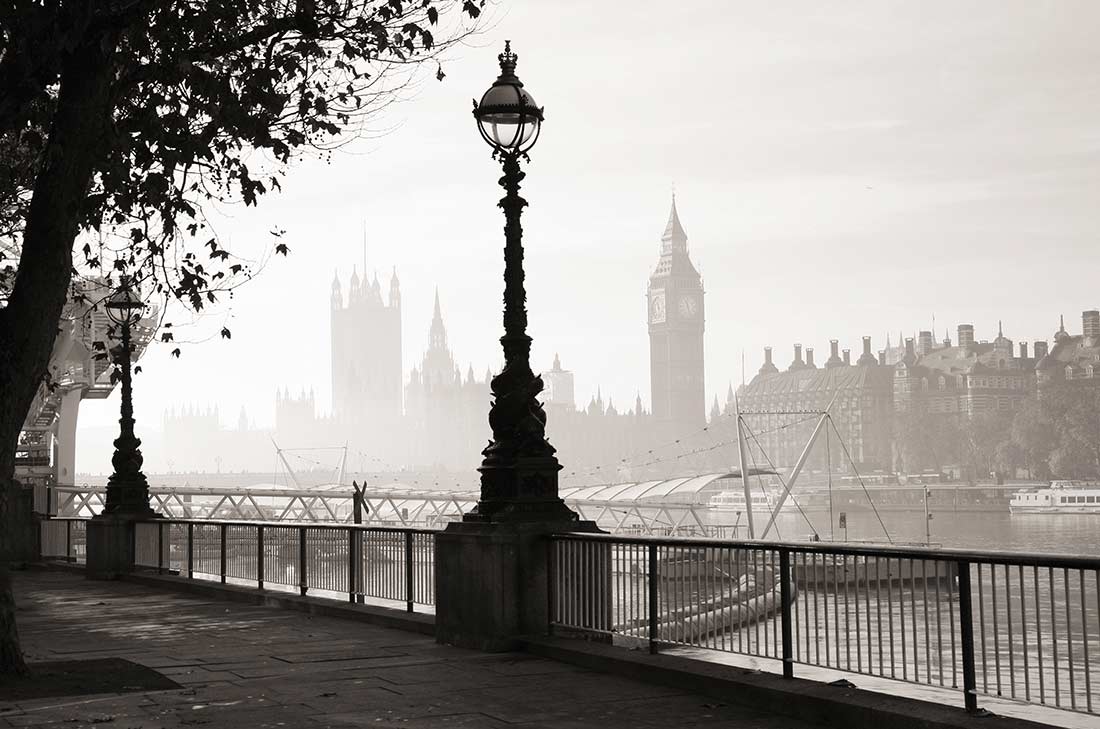
Why is the UK more expensive than Ireland?
The UK is well known as an expensive travel destination, even by European standards. The National Rail service is one thing citizens in this part of the world love to complain about, as it is very expensive. Unfortunately, restaurants will also not be friendly to your budget when you visit England so you might want to avoid eating out. You can find cheap food in England if you really pay attention. Fish and chips, kebabs, Indian and Asian food are only a couple of pounds. However do not expect to pay less than £15 if you sit-down at a restaurant. Cheap accomodation is also very hard to find in the UK and while some activities, such as a few museums, are free or cheap, castles and other attractions entrance fees are around £10 to £20. You'll find most other day activities, such as cycling, wine tours, tours to ancient ruins tend to be around 80 GBP.
Ireland, in general, is an affordable destination and with some insider knowledge, you can stretch your money further and have a fabulous upscale vacation there. In terms of accomodation, prices average 10-20 euros a night for a hostel dorm room. You can find private rooms that sleep two ranging from 35-60 euros. In the bigger cities, especially Dublin, expect to pay a bit more. You could also try Airbnb, which has shared rooms for as low as 16 euros per night and entire homes averaging about 50 euros a night. Fast food items start at around 4 euros, while a simple meal at a pub will cost you about 10 euros. A nicer meal, with a drink, will be upwards of 20 euros. If you go out early to lunch or dinner, you'll find many restaurants offer âearly birdâ specials where you can get good deals. Public transportation is first-rate in Ireland! Whether you're on a bus or train, expect free WiFi, friendly drivers, and timely departures. Bus trips around Dublin cost about 2 euros for a single journey. Longer bus journeys, such as Dublin to Belfast will cost around 17 euros. Taxis are expensive and, since most cities are extremely walkable, it is suggested that you avoid them. Most museum fees throughout the country cost about 10 euros.
What are the most expensive and cheapest cities and regions in the UK and Ireland?
Cities are more expensive than the countryside in the UK. A city break in London, Brighton or Edinburgh could cost you almost twice as much as the equivalent stay in Newcastle, Sheffield or Liverpool. St Andrews, Bath and Oxford should also be avoided if you are looking for a budget-friendly trip in the UK. However Exeter, Cardiff, Manchester and Birmingham are very affordable. A great city with affordable accomodation and food is York. It has a history dating back to prehistoric times and has been a backdrop for numerous influential political events. Cornwall is an incredibly popular destination in the UK and it turns out that cottages and food is fairly reasonably priced. Norfolk seems to have it all; clear coastline, interesting nature reserves, incredible wildlife, market towns, seaside resorts and remains a budget destination! For a cheap beach holiday in the UK head to Pembrokeshire, the most popular coastal destination in Wales. It boasts the Pembrokeshire Coast National Park, the only coastal national park of its kind in the United Kingdom. As for Dorset and the Peak District, finding budget food and accomodation is all about knowing the right places to visit, and going at the right time. While these are not the cheapest regions in the UK, affordable holidays are possible in the countryside if you book in advance or sometimes taking the risk and booking at the last minute also pays off.
Dublin has a reputation for being an expensive city and it certainly can be if you're not careful. Food and drink are going to be two budget killers. Luckily, attractions aren't too expensive and hostels/accommodation are reasonable. The countryside and smaller towns are way less expensive than the capital and, of course, slightly more affordable than any famous tourist spots such as Kinsale, Galway City, Cork, Kilkenny or Clifden.
How can you save money while visiting the UK and Ireland?
Bare in mind that many public museums and cathedrals offer free admission in most city throughout the UK. It's a great way to learn about the country's most influential artists, immerse yourself in the country's history, and waste a rainy day without paying a cent. Most major cities in England offer free walking tours as well. They usually last a few hours and are a great way to see the city. When in cities, rely on walking to get around. Private cars and taxis can ratchet up the cost of your trip significantly because fuel costs in Britain are high. You can also use public transport but when in London, use an Oyster card. Visitor Oyster cards and contactless payment cards offer the cheapest ways to travel in London. Using a Visitor Oyster Card is more than 50% cheaper than buying one-day paper Travel Cards or single tickets with cash. A good way to lower your food expenses is to stick to eating out during lunch only. Restaurants offer fabulous lunch specials where you can get multi-course meals for around 10 GBP. For good cheap and filling meals, visit the local pubs. Most serve good meals for less than 10 GBP and are a great way to meet the locals! Don't let the UK's reputation for expensive accommodations put you off visiting. For budget accommodation, look no further than London's friendly hostels, budget hotel chains, B&B's and Halls of Residence. If chilly days don't bother you, January is the cheapest month to take a vacation to Britain. The hotels have the lowest prices, and since tourism is usually weak, restaurants, theaters and museums offer deals to boost business.
Use your student discounts! A valid student ID will get you discounts, up to 50%, to many attractions, museums, and buses throughout the country. Also, Ireland's strong pub culture will hit your wallet hard so try to temper the cost by visiting happy hours, drinking at home, or skipping drinks altogether. For the best value food, head to the pubs for good, hearty local Irish food. Local meal, with local people, at local prices! For those of you that love to tour heritage sites, you should definitely get an OPW Heritage Card. It guarantees access to main attractions, including most of the castles throughout the country. The card is a must for people visiting multiple cities in the country as it only costs 25 euros for adults. For free accomodation, use couchsurfing! This app connects you with locals who will give you not only a free place to stay, but also a local tour guide who can introduce you to all the great places to see. If you're flexible in your schedule, you can also use the ridesharing service BlaBlaCar and catch rides with locals between cities. If you decide to hire a care, there are lots of different car hire sites, and you can compare deals but you should book your hire car in advance to avoid excessive fees.

When is the best time to visit the UK or Ireland?
Both places have a temperate climate with four distinct seasons. As both cities are in the northern hemisphere, summer is in July and winter is in January.
As an island nation in the north, the U.K. experiences cold winters and mild summers. It's common for it to rain most of the year, although it's not usually a pour, but more of a drizzle most of the time. In Scotland and Northern Ireland in particular it can be more rainy than in the southern areas, but not by much. Despite the cold and rain, it does not snow very frequently except for in the mountain areas. When visiting, prepare for cooler weather and rain, even in the summer months.
Ireland can see its share of cold weather, especially on the coast during the wet winters. The summer months are mild with temperatures that are comfortable but not too warm. This makes it a great place to escape the summer heat from other destinations while taking in the country's history and culture. In fact, the weather can be wet at times and change suddenly, too. But it rarely snows in the winter, so don't be afraid to visit during the off season, too.
The United Kingdom can be visited at any time of year, as its climate is relatively temperate and, in general, doesn't experience extremes during either summer or winter. Bare in mind that no matter when you travel, you should always pack an umbrella, as the UK is notorious for experiencing misty days and showers year-round. Indeed, England has a bit of a bad reputation when it comes to weather, but one of the joys about the country is that, in fact, it does the seasons very well. Overall, spring, from March to June, and autumn, from September to November, are the best times to visit, as it is usually warm and dry. Spring is full of new life, with daffodils blooming and Easter egg hunts and autumn dazzles when the trees turn bright red and orange. However, England during summer is all about eating ice cream at the beach and picnics in the countryside and winter brings snow and cosy nights in front of a roaring fire. Late spring, along with summer is UK's high tourist season so hotel and flight prices reflect the surge. Although some attractions close in mountainous areas, and there's likely to be snow in the north during winter, the main cities remain fully open and will be quieter for sightseeing. December in London is also an incredibly popular place to be during the holidays, so expect the streets to be crowded with both English and international tourists.
Ireland has a mild, temperate climate and although at times rainey, you can visit at any time of year. However, depending on what you're looking for from your vacation, there could be better times than others to travel. During the months of March to May and September to November, the weather isn't as cold as during the winter months and the sites are not as crowded as during the summer months. The months of June, July and August are the warmest of the year, when Ireland's landscapes are at their most vibrant and days are extremely long. However, in summer, sites and roads are crowded and prices are higher. From late October some sites close, and temperatures drop. There's no avoiding the rain in Ireland no matter what time of the year you land on its shores but in terms of prices, opened sites and number of tourists, the mid-seasons are definitely the best time to visit Ireland.
Should I visit the UK or Ireland in the Summer?
The summer brings many poeple to the UK as well as Ireland. Many travelers come to the UK for the beaches, the hiking, the music scene, and the family-friendly experiences. Additionally, many visitors come to Ireland in the summer for the beaches, the hiking, the music scene, and the family-friendly experiences.
In the summer, London is a little warmer than Dublin. Typically, the summer temperatures in London in July average around 18°C (64°F), and Dublin averages at about 16°C (60°F).
In the summer, London often gets more sunshine than Dublin. London gets 195 hours of sunny skies this time of year, while Dublin receives 166 hours of full sun.
London usually gets less rain in July than Dublin. London gets 46 mm (1.8 in) of rain, while Dublin receives 50 mm (2 in) of rain this time of the year.
- Summer Average Temperatures July London 18°C (64°F) London 16°C (60°F)
Should I visit the UK or Ireland in the Autumn?
Both Ireland and the UK are popular destinations to visit in the autumn with plenty of activities. Many visitors come to the UK in the autumn for the hiking trails, the shopping scene, the music scene, and the natural beauty of the area. Also, most visitors come to Ireland for the hiking trails, the shopping scene, the music scene, and the natural beauty of the area during these months.
In October, London is generally around the same temperature as Dublin. Daily temperatures in London average around 12°C (53°F), and Dublin fluctuates around 11°C (52°F).
London usually receives more sunshine than Dublin during autumn. London gets 107 hours of sunny skies, while Dublin receives 97 hours of full sun in the autumn.
In October, London usually receives less rain than Dublin. London gets 58 mm (2.3 in) of rain, while Dublin receives 70 mm (2.7 in) of rain each month for the autumn.
- Autumn Average Temperatures October London 12°C (53°F) London 11°C (52°F)
Should I visit the UK or Ireland in the Winter?
Both Ireland and the UK during the winter are popular places to visit. Most visitors come to the UK for the museums, the Christmas ambience, the shopping scene, the theater shows, and the cuisine during these months. Also, the winter months attract visitors to Ireland because of the museums, the Christmas ambience, the shopping scene, the theater shows, and the cuisine.
London can be very cold during winter. London is cooler than Dublin in the winter. The daily temperature in London averages around 4°C (40°F) in January, and Dublin fluctuates around 6°C (42°F).
In the winter, London often gets less sunshine than Dublin. London gets 52 hours of sunny skies this time of year, while Dublin receives 56 hours of full sun.
London usually gets less rain in January than Dublin. London gets 52 mm (2 in) of rain, while Dublin receives 69 mm (2.7 in) of rain this time of the year.
- Winter Average Temperatures January London 4°C (40°F) London 6°C (42°F)
Should I visit the UK or Ireland in the Spring?
The spring attracts plenty of travelers to both the UK and Ireland. The spring months attract visitors to the UK because of the beaches and the natural beauty. Also, the beaches and the natural beauty are the main draw to Ireland this time of year.
In the spring, London is around the same temperature as Dublin. Typically, the spring temperatures in London in April average around 9°C (48°F), and Dublin averages at about 8°C (47°F).
London usually receives around the same amount of sunshine as Dublin during spring. London gets 147 hours of sunny skies, while Dublin receives 157 hours of full sun in the spring.
In April, London usually receives less rain than Dublin. London gets 45 mm (1.8 in) of rain, while Dublin receives 51 mm (2 in) of rain each month for the spring.
- Spring Average Temperatures April London 9°C (48°F) London 8°C (47°F)
Typical Weather for Dublin and London
Related articles for the uk, related articles for ireland.

More Destination Comparisons
Subscribe to our newsletter.
By signing up for our email newsletter, you will receive occasional updates from us with sales and discounts from major travel companies , plus tips and advice from experienced budget travelers!
Share This Page
Pin this page.
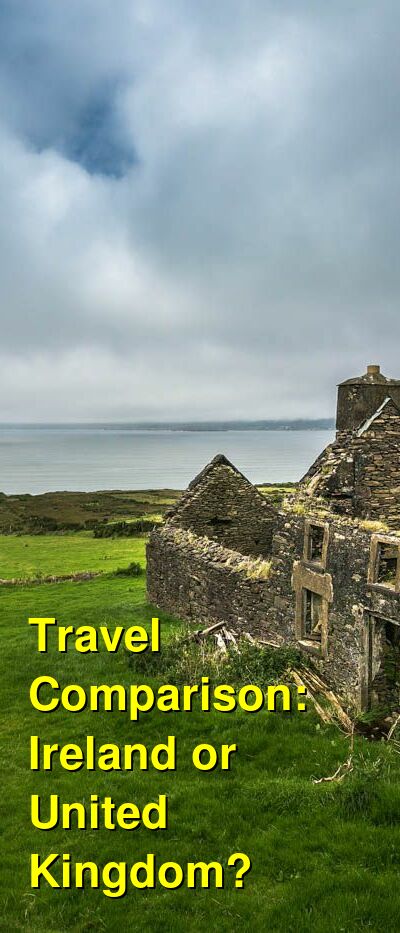
Some of the links on this website are sponsored or affiliate links which help to financially support this site. By clicking the link and making a purchase, we may receive a small commission, but this does not affect the price of your purchase.
- Privacy / Terms of Use
- Activities, Day Trips, Things To Do, and Excursions
Cookies on citizensinformation.ie
We use cookies to collect information about how you use citizensinformation.ie. This helps us to improve your experience. You can find out more about the cookies we use in our Cookie notice . You can also read our Privacy policy . You can accept all cookies or you can chose which cookies to accept or reject. You can change your cookie preferences at any time by using the My cookie preferences link at the bottom of each page.
Cookie preferences
Cookies used by google analytics.
We use Google Analytics to measure how you use the website so we can improve it. We have configured Google Analytics to anonymise your IP address so that you are not personally identified. We gather information on:
- How you got to the site
- The pages you visit on citizensinformation.ie, and how long you spend on each page
- What you click while you are visiting the site

Common Travel Area between Ireland and the UK
What is the common travel area, your rights within the common travel area, border control and the common travel area, brexit and the common travel area.
The Common Travel Area (CTA) is an arrangement between the United Kingdom (UK) and Ireland that gives a variety of rights to citizens of those countries. It includes more than the basic right to travel freely between both countries.
When the Common Travel Area arrangement began in 1922, it was not contained in any legislation. It was an understanding between Ireland and the UK based on their common history. Over time, some of the rights came to be included in different pieces of legislation in both Ireland and the UK.
While the Common Travel Area is recognised under the Treaty of Amsterdam, it is not dependant on the European Union and the continuing membership of both countries.
On 8 May 2019, the Irish and UK governments signed a Memorandum of Understanding (pdf) reaffirming the Common Travel Area and identifying the rights and privileges of Irish and UK citizens within the CTA. It also reaffirmed the commitment to maintain the CTA following Brexit (pdf) .
Common Travel Area rights can only be exercised by citizens of Ireland and the UK. If you are not a citizen of Ireland or the UK, you cannot exercise Common Travel Area rights.
For the purposes of the Common Travel Area, the UK covers:
- Northern Ireland
- The Isle of Man
- The Channel Islands
Irish and UK citizens have the right to live, travel, work and study within the Common Travel Area. The rights of Irish citizens have been recognised in the UK’s Immigration and Social Security (EU Withdrawal) Act 2020 .
Irish and UK citizens can live in either country and enjoy associated rights and privileges, including:
- Access to social benefits
- Access to healthcare
- Access to social housing supports
- The right to vote in certain elections
The Common Travel Area does not relate to goods or customs issues. You can read about the trade agreement between Ireland and the UK in Brexit and Ireland .
There are no routine passport controls in operation for Irish and UK citizens travelling between the 2 countries.
However, you must show identification to board a ferry or an airplane, and some airlines and sea carriers only accept a passport as valid identification. You may also be asked by an immigration officer to prove that you are a citizen of Ireland or the UK, so you should carry a passport with you. You can also use an Irish passport card, or other proof that you are an Irish citizen.
If you have family members who are not UK or EEA citizens, they may need a visa to enter Ireland or the UK. A residency scheme for family members of UK citizens who move to Ireland after 1 January 2021 is now in place.
The Common Travel Area also involves some co-operation on immigration issues. A non-EEA national, for example, may be refused permission to enter Ireland if they intend to travel onwards to the UK and they would not qualify for admission to the UK. Irish immigration officers have the power to carry out checks on people arriving in the State from the UK and to refuse them entry to the State on the same grounds that apply to people arriving from outside the Common Travel Area. These checks are carried out selectively.
EU and EEA citizens travelling to Great Britain from Ireland
If you are a citizen of the EEA (the EU, plus Norway, Iceland and Lichtenstein) or Switzerland, you may be asked for identification when you enter Great Britain from Ireland. You are not asked to show identification if you are entering Northern Ireland from Ireland.
You must have an EEA passport to enter Great Britain from Ireland unless you have:
- Settled or pre-settled status in the UK, or you are awaiting a decision on your application and have received confirmation that your application is valid.
- An EU Settlement Scheme family permit, or the equivalent from Jersey, Guernsey or the Isle of Man
- A Frontier Worker Permit
- An S2 Healthcare Visitor visa
- A Service Provider from Switzerland visa
If you are in any of the above categories, you can use an EEA or Swiss national identity card to enter Great Britain from Ireland.
Electronic Travel Authorisation
An Electronic Travel Authorisation (ETA) gives you permission to travel to the UK and is required by some nationalities before travel.
You do not need an ETA if you:
- Are a British citizen
- Are an Irish citizen (unless subject to a deportation order, exclusion order decision, or an international travel ban)
- Are a British Overseas Territory Citizen (BOTC) with a BOTC passport
- Have entry clearance or permission to enter or stay in the UK, including people who are settled
If you live in Ireland legally, you don't need an ETA when entering the UK from Ireland.
Cross border workers
Irish and British citizens can live and work in both Ireland and the UK and they can live in one country and work in the other country. For example, you might live in Ireland and work in Northern Ireland. This is called frontier working or cross-border working .
EEA and Swiss citizens who were living in Ireland and working in Northern Ireland before the end of 2020, must have a Frontier Work Permit to continue working in Northern Ireland. EEA and Swiss citizens who live in Ireland and start working in Northern Ireland from the beginning of 2021 must apply for permission to work in the UK through the UK’s points-based immigration system .
People with UK visas or residence permits
If you are a citizen of a country whose nationals need a visa to enter Ireland and you have a valid UK visa or residence permit, you may be required to have a visa to enter Ireland before you arrive in Ireland.
Short Stay Visa Waiver Programme
The Short Stay Visa Waiver Programme allows nationals of a number of Eastern European, Middle East and Asian countries who have a short-term UK visa to come to Ireland without the need for a separate Irish visa.
Reciprocal visa arrangements
A British Irish Visa Scheme applies to visitors from China and India. This scheme allows visitors from these countries to travel freely within the Common Travel Area (excluding the Channel Islands and the Isle of Man), using either an Irish or UK visa. British Irish Visa Scheme visas are endorsed with ‘BIVS’.
Both schemes are provided for in the Immigration Act (Visas) Order 2014 (SI 473/2014) as amended by Immigration Act (Visas) Order 2016 (SI 502/2016) .
You can read more about visa requirements for entering Ireland , or you can get further information about visa applications from Irish embassies and consulates abroad .
The UK’s withdrawal from the European Union (EU) has not affected the rights of Irish citizens and UK citizens within the Common Travel Area. The right to live, work and access public services in the Common Travel Area is protected.
Your Common Travel Area rights do not extend to your family. This means that if your spouse or partner, or other relative, is not an Irish or UK citizen, they may have to apply for residence in the UK .
You can read about residence rights of British citizens in Ireland.
Common Travel Area in law and the Protocol
The Withdrawal of the United Kingdom from the European Union (Consequential Provisions) Act 2019 places many of the Common Travel Area rights in legislation for the first time. The Act empowers the relevant ministers to legislate in the areas of providing equal access to healthcare and social welfare.
The withdrawal agreement between the UK and the European Union recognises the Common Travel Area in its Protocol, which deals with Ireland and Northern Ireland . Article 2 provides for the continued operation of the Common Travel Area.
You can read more about the UK leaving the EU in our pages:
- Background to Brexit
- Brexit and Ireland
You can get more information on the Common Travel Area from the Department of Foreign Affairs and on legal matters and rights from gov.ie .
Related documents
- Studying in the UK including Northern Ireland Many people leave to study in Northern Ireland and elsewhere in the UK where there are different application procedures and fees. 1954.3262
- The Schengen Area What countries are in the Schengen Area, and what does it mean for travellers to and from Ireland? 1926.2102
- The euro area The euro is the national currency of 19 EU member states. This document explains how it operates. 1887.5979
If you have a question about this topic you can contact the Citizens Information Phone Service on 0818 07 4000 (Monday to Friday, 9am to 8pm).
You can also contact your local Citizens Information Centre .
Manage cookie preferences
- Skip to primary navigation
- Skip to main content
- Skip to primary sidebar
- Skip to footer

Indigo Sahara
Travel Reviews, Guides, Tips & Travel Hacking
Ireland Vs UK: Which Is Better?
By: Indigo Sahara, M.A. | Published: December 27, 2023 | Updated: January 2, 2024
Ireland vs UK — which is better? Overall, Ireland is better to visit that the UK.
If you want to see epic landscapes, endless green pastures and medieval castles at a fraction of the price, visit Ireland.

However, between the multiple countries that make up the UK, the UK has plenty to offer as well, from famous tourist attractions to bustling seaside towns to homes of royalty. Generally speaking, the UK also has warmer weather than Ireland. These UK destinations may just come with a price.
So, to determine which northern Europe place is best fit for you, let’s discuss why you would choose Ireland vs UK , the differences between the UK and Ireland , which is cheaper and which has better weather .

Table of Contents
Is Ireland or UK better?
First, it’s important to specify exactly which countries are in question.
Most of the time, when people say, “UK,” they really mean England. But, Scotland, Wales and Northern Ireland are part of the UK as well.
For example, if you are referring to England, Ireland is better to visit than the UK.
If you are referring to Northern Ireland, Northern Ireland (UK) is better to visit than Ireland .
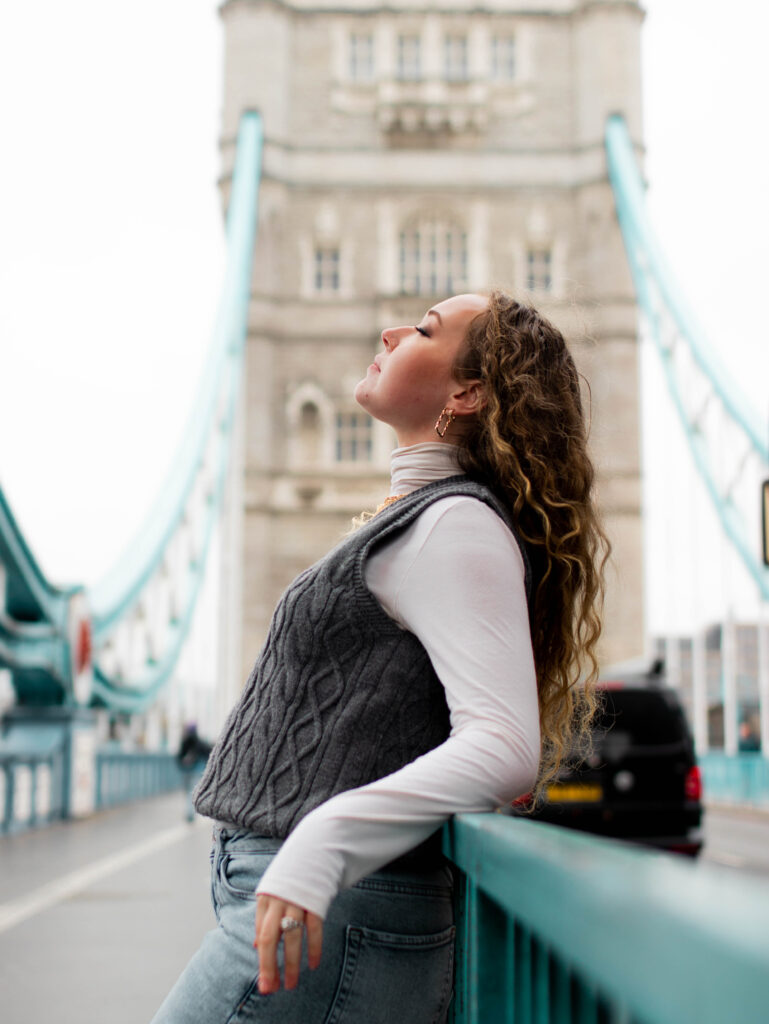
For all intents and purposes, though, because most people generalize the term UK to just England, I assume you mean Ireland vs England . Keep this in mind as you read through the rest of the post.
Why choose Ireland over UK?
You would choose Ireland over the UK if you want to see epic natural landscapes, walk through medieval castles and immerse yourself in traditional culture.
You would choose the UK over Ireland if you want to tour iconic tourist attractions, drive through quaint countrysides and visit regal abbeys.

What is the difference between the UK and Ireland?
The main difference between the UK and Ireland is that the UK offers many more world renown tourist attractions, such as Big Ben, Westminster Abbey, the London Eye and Stonehenge. Whereas, Ireland offers immersive countrysides, jaw-dropping landscapes and lively pubs.
In addition, there is a large cultural difference between the UK and Ireland . Generally, the overarching culture of the UK is formal, traditional and regal. In contrast, the overarching culture of Ireland is lively, fun and adventurous.

Of course, the simplest difference between the UK and Ireland is the constitutional and geographical differences between the two nations.
Ireland is an independent country. Whereas, the UK is a kingdom comprised of several countries, including England, Wales, Scotland and Northern Ireland.

Is Ireland or the UK cheaper?
Typically, a trip to Ireland is cheaper than a trip to the UK .
The average cost of a one-week trip to Ireland is $1000 USD per person. The average cost of a one-week trip the UK is $1800 USD per person.
Obviously, a trip to the UK is almost twice the price of a trip to Ireland , mainly due to pricey accommodations and the ticketed tourist attractions that England offers in comparison to Ireland.

In Ireland , you can expect to spend around $100 USD per day on accommodations and $20 USD per meal. Of course, this is assuming you don’t plan to spend hundreds of dollars on alcohol.
On the contrary, in the UK , you can expect to spend around $200 USD per day on accommodations and $20 USD per meal.
Here is a quick visual breakdown for the cost of Ireland vs UK , as previewed in my Dublin vs London guide .
Is it colder in England or Ireland?
Next, in terms of best weather, is it colder in England or Ireland?
Generally speaking, it is colder in Ireland than in England.
The average summer temperature in Ireland hovers around 60 degrees Fahrenheit (15 degrees Celsius). On the other hand, the summer temperature in England averages 75 degrees Fahrenheit (23 degrees Celsius).
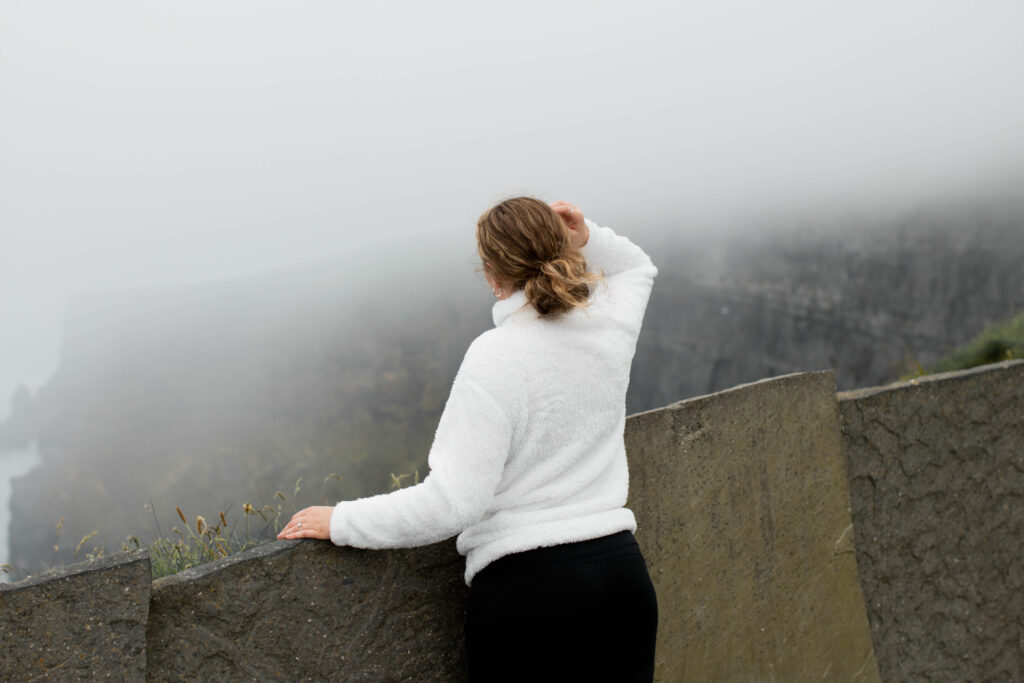
In the winter, the December average temperature in Ireland hovers around 40 degrees Fahrenheit (4 degrees Celsius). In England in December, the temperature averages 45 degrees Fahrenheit (7 degrees Celsius).
Notably, the temperatures in Ireland feel colder than England because Ireland is much windier .
Is Ireland part of the UK or EU?
Ireland, also known as the Republic of Ireland, is part of the EU, not the UK.
Ireland has not been a part of the UK since 1921.
Northern Ireland, on the other hand, which is a separate country from the Republic of Ireland, is still a part of the UK.
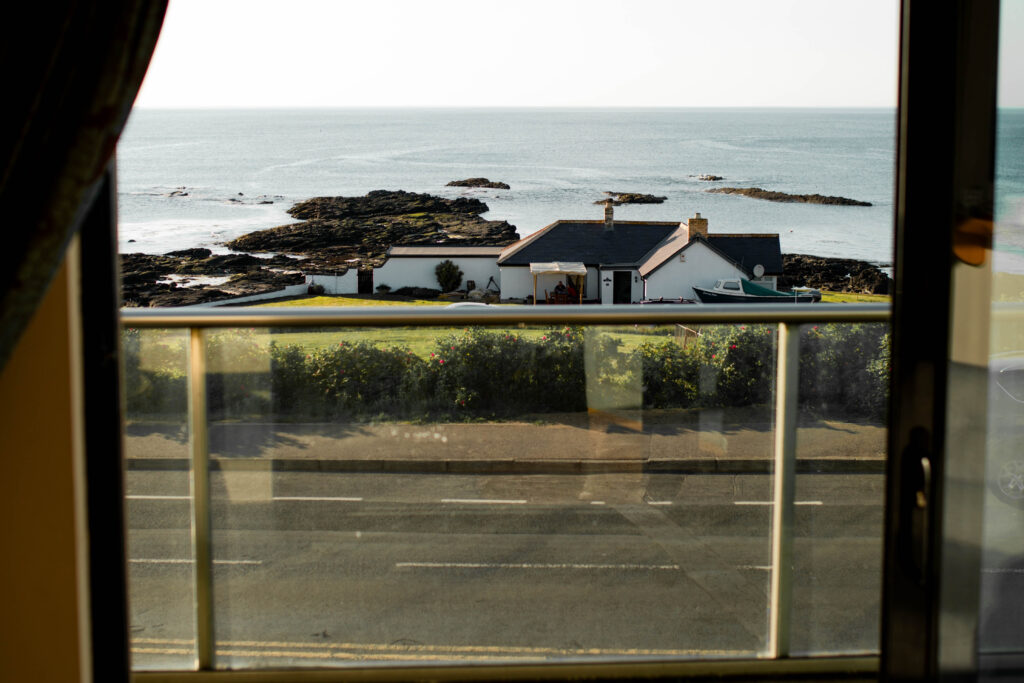
You can learn about the difference between Ireland and Northern Ireland and their relationship with the UK in my full Ireland vs Northern Ireland guide here .
Now, between Ireland vs UK , which region do you think is best for you? Let me know by leaving a reply below!
Ireland Travel Guides
Ireland Vs Northern Ireland: Which Is Best To Visit? What To Wear In Ireland In Summer Travel Tips For Ireland That Will Make Or Break Your Trip
UK Travel Guides
Dublin Vs London: Which Is Better? London For First Timers: Best Things To Do, Eat And Know What To Wear In London In March, April And May
Save This Ireland Vs UK Guide
Save this Ireland vs UK travel guide for later by saving to socials.

- Share on Twitter Share on Twitter
- Share on Facebook Share on Facebook
- Share on Pinterest Share on Pinterest
- Share via Email Share via Email
About Indigo Sahara, M.A.
Indigo Sahara, M.A., is the founder and CEO of the Indigo Sahara travel blog. Since earning her master's degree in global leadership, she has traveled to more than 20 countries. Now, her goal is to make travel accessible to all by teaching others how to travel on a budget. She writes world travel guides and travel hacking tips weekly.
you’ll also love
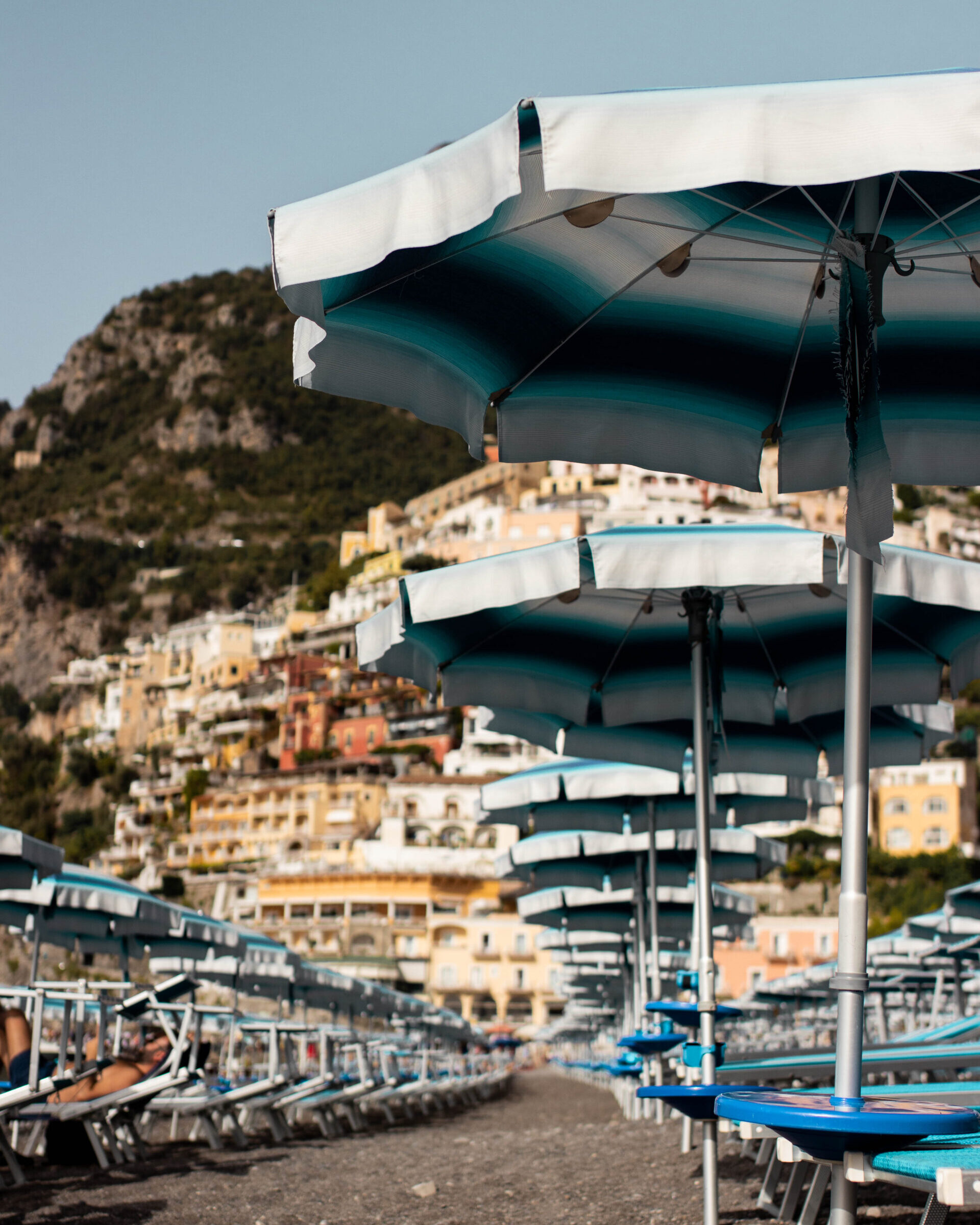
Get exclusive content.
Stay up-to-date & receive the latest travel guides and tips right to your inbox.
Reader Interactions
Leave a reply cancel reply.
Your email address will not be published. Required fields are marked *
Save my name, email, and website in this browser for the next time I comment.

Dublin Vs London: Which Is Better?
Follow on instagram.
@indigosahara

- Destinations
- Travel Tips
- Travel Essentials
- Travel Photography
- Camera Gear
- Work With Me
- Privacy Policy
- Refund And Returns Policy
stay in the know
Copyright Indigo Sahara © 2024 · Theme by 17th Avenue
United Kingdom vs. Ireland
Introduction, demographics, telecommunications, transportation, transnational issues, environment.
Source: CIA Factbook
- Work With Us
- Blogging Bootcamp

- Van Conversion Academy
- Campervan Shop
- Campervan Rentals
- Plan a Trip
- Itineraries
- Destinations
- Responsible Travel
- Family Travel
- Budget Travel
- Scuba Diving
- Travel Credit Cards
- Digital Nomad
- Teach English Abroad
- Blogging Resources
- Income Reports
- Travel Shop
- Meet Katie & Ben
- About Two Wandering Soles
- Personal Stuff
- Portfolio & Press
Scotland vs. Ireland: Which should you visit?
Home » Blog » Europe » Scotland vs. Ireland: Which should you visit?
If you’re debating whether you should visit Scotland vs. Ireland, this guide can help you decide which is the best choice for your travel style and preferences.
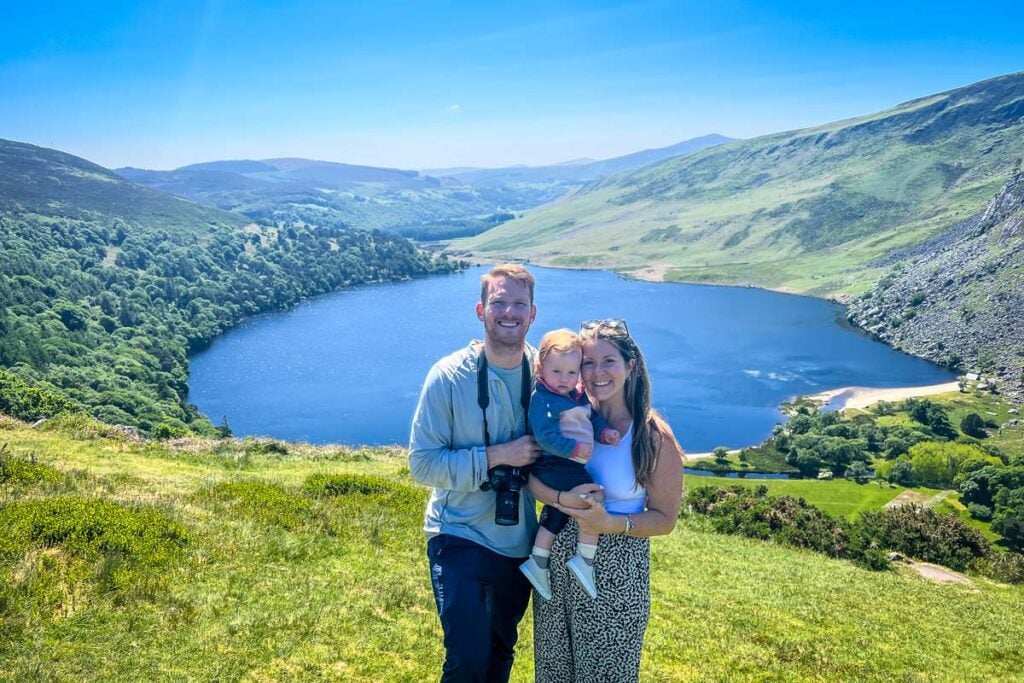
We’ve taken road trips in both Scotland and Ireland , and I can tell you (from personal experience!) that both countries are absolutely worth exploring .
In fact, I’d say they both are on our list of best road trips in the world.
How do they compare, you ask?
If I’m totally honest, I feel like Scotland and Ireland are very similar.
During our recent Ireland road trip , we couldn’t stop comparing it to our road trip through Scotland . Around every turn, we’d say, “That view reminds me of Scotland,” or “This pub brings me back to Scotland!”
There are definitely differences between Scotland and Ireland too, but the good news is that if you like one, you’re nearly guaranteed to like the other!
Wondering where to travel: Scotland or Ireland?

If you’re looking for a short and direct answer, here it is: No matter which you choose, you will have an incredible time.
However, if you’re looking for a more in-depth comparison between Ireland and Scotland , we can do that, too…
In this article, we’ll discuss the similarities Scotland and Ireland have, as well as what makes them different.
We’re going over everything from the food to the weather to the landscapes (as well as which country we’d name the winner for each category) so that you can determine where you’d prefer to travel.
Spoiler Alert: If you want to just jump straight to the point and see our personal pick between Ireland vs. Scotland , click here !
Scotland or Ireland: Where should you travel?
- Similarities & Differences
- Hiking
- Things to Do
- Small Towns
- History & Culture
- Accommodations
- Which is more family-friendly?
- How much time do you need in each?
- Our opinion: Ireland or Scotland
Similarities & differences between Scotland and Ireland
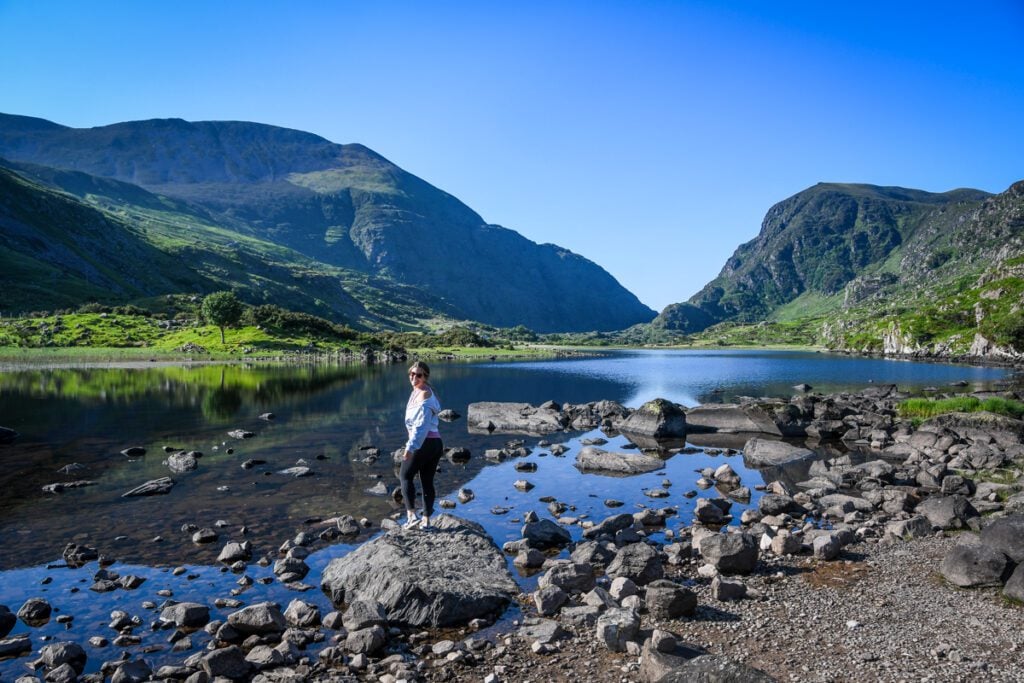
Before we dive into personal opinions, let’s go over the facts and compare the similarities and differences between Ireland and Scotland.
- Scotland: pound sterling (£)
- Ireland: euro (€)
Fun fact: If you travel to the north of Ireland, you will be using pounds instead of euros.
Scotland and Ireland are relatively similar in size.
Scotland is slightly bigger than the Republic of Ireland. However, if you compare the island of Ireland (including Northern Ireland), it is roughly 2,500 square miles larger than Scotland.
- Scotland is 30,090 square miles (77,933 km 2 )
- Republic of Ireland is 27,133 square miles (70,273 km 2 )
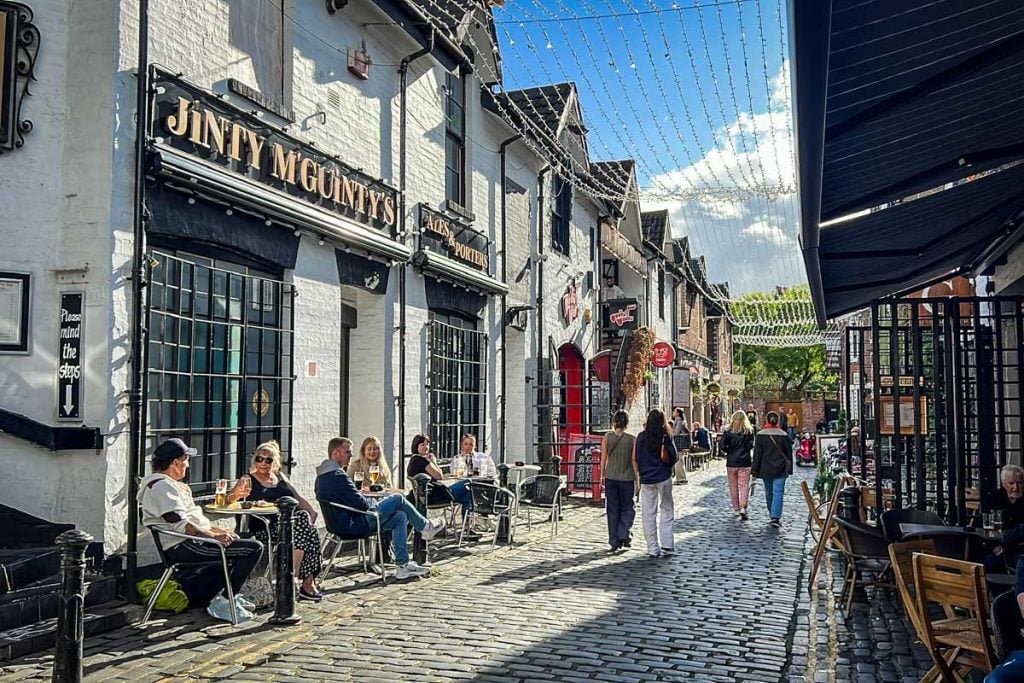
Even the two countries’ populations are similar. The Republic of Ireland and Scotland have roughly the same population.
- Scotland: 5.5 million people
- Ireland: 5.1 million people (7 million on the entire island, including Northern Ireland)
When you factor in the size of each country, you’ll find that Ireland is more densely populated .
Also, the major cities in Ireland are bigger.
Ireland’s largest city (Dublin) has twice the population of Scotland’s largest city (Glasgow).
- Glasgow: 600,000 people
- Dublin: 1.2 million people

English is the most widely-spoken language in both Ireland and Scotland. However, each country also has pride for their native language.
The native language of both Scotland and Ireland is a form of Gaelic. While they have similar origins, each language is distinctly different.
- Scotland: Scottish Gaelic
- Ireland: Irish Gaelic
In our experience, we found that Ireland has much more Gaelic across the country (on signs and menus) than we saw in Scotland.
- Scotland: majority Church of Scotland
- mix of Protestant and Catholic in the north of Ireland
Weather in Scotland vs. Ireland
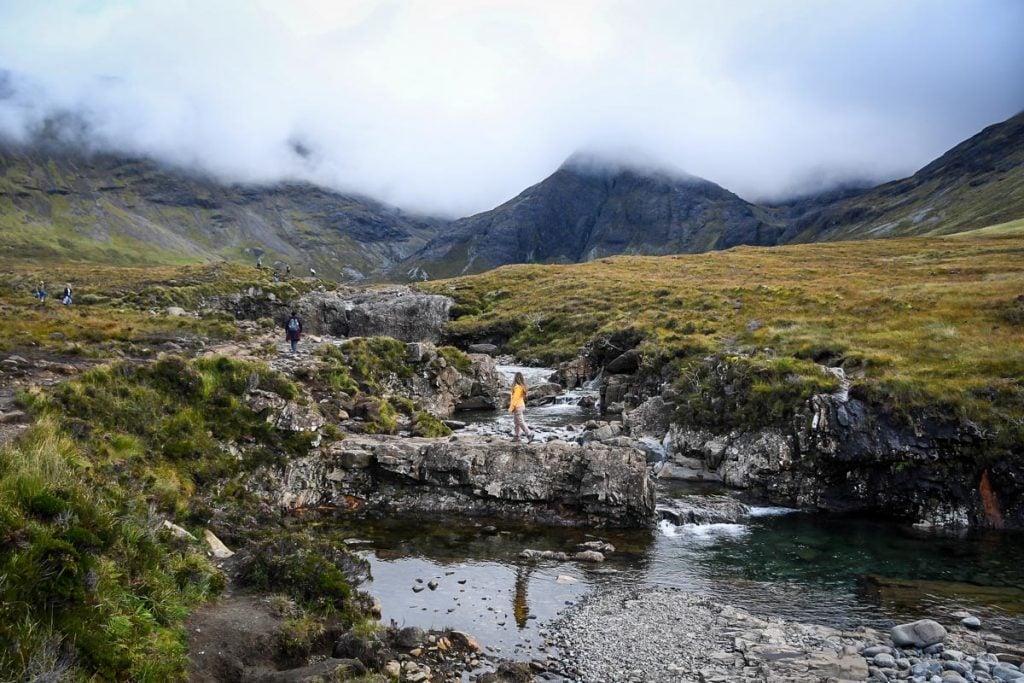
Both Ireland and Scotland are known for drizzly weather and gray, gloomy skies.
It’s a vibe – lean into it , pack correctly, and you’ll be fine!
This is anecdotal, but we had great weather in both Scotland and Ireland. In fact, when we traveled to Ireland for 2 weeks in early June, we only had (slight) rain one day. ONE DAY. We even had to buy new clothes while we were there because what we had packed was too warm.
The weather between the two countries is relatively similar, and you could get really lucky or really unlucky with either choice.
If you’re comparing the countries as a whole, Ireland tends to have milder weather and slightly less rainfall than Scotland.

Scotland weather stats
- Average annual rainfall: 59 inches (1,500 mm)
- Summer temperatures: 52º-66º F (11°-19°C)
- Winter temperatures: 34º-45º F (1°-7°C)
Learn more: Best time to visit Scotland

Ireland weather stats
- Average annual rainfall: 48 inches (1,230 mm)
- Summer temperatures: 60°-70°F (15°-20°C)
- Winter temperatures: 40°-46°F (5°-8°C)
Learn more: Best time to visit Ireland
Compare those rainfall amounts to our hometown of Bend, Oregon , which averages just 12 inches annually, and it is easy to see why both countries are known for being so rainy!
Our winner: Ireland
We wouldn’t recommend choosing Ireland over Scotland based just on weather because you can get lucky or unlucky anywhere. However, if you’re purely looking at the stats, Ireland is slightly more mild and has a bit less annual rainfall.
Food in Scotland vs. Ireland

This is a toughie… both Scotland and Ireland are known for cuisines that are, well, heavy on the meat and potatoes.
While I love a good comfort food meal every now and again, it’s certainly not on the list of my favorite cuisines (like Thai food or Mexican food ) .
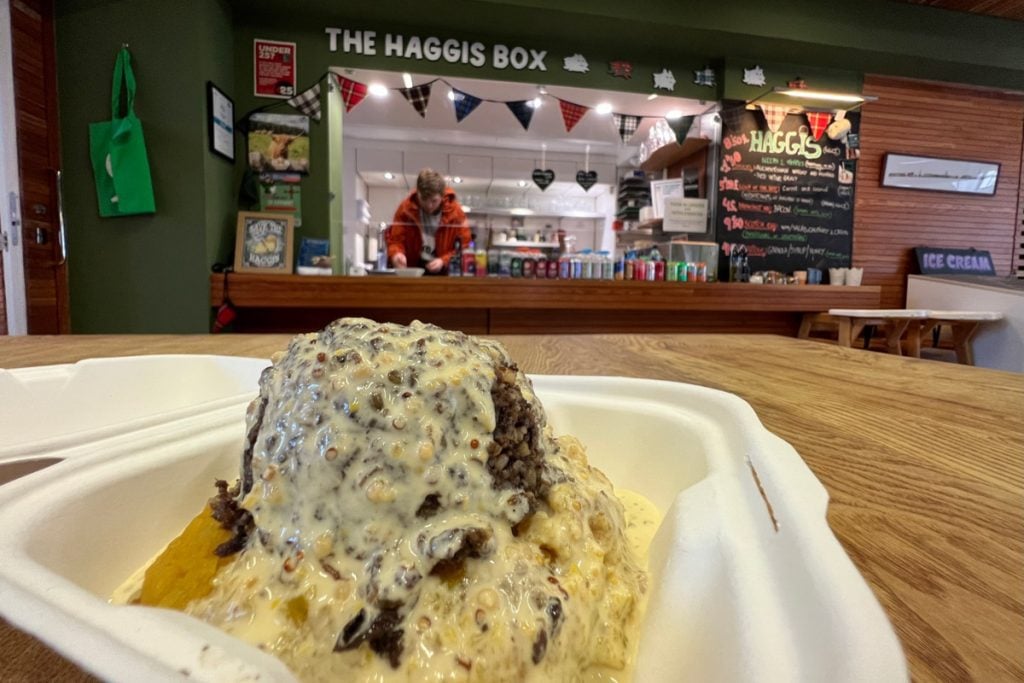
Scottish foods to try
- Haggis (there are also vegan options)
- Cullen skink (fish chowder)
- Fun fact: Chicken tikka masala is said to have originated in Glasgow, and this dish can be found on pub menus even in the countryside

Irish foods to try
- Botxty (like a potato pancake meets a savory crepe)
- Irish whiskey
In recent years, the foodie worlds of both Scotland and Ireland have been growing and elevating. And what were once thought of as – dare I say – bland cuisines have gotten facelifts in pretty major ways.
In the larger cities, you’ll find world-class dining where chefs are taking traditional foods to the next level while still honoring their roots. And in seaside towns of both Scotland and Ireland, don’t miss the seafood, it is incredible.
We had fantastic food experiences in both Ireland and Scotland and we think you will, too.
Good to know: We found vegetarian and vegan options readily available in both countries.

Our favorite food experiences in Scotland
- Taking a food tour in Glasgow
- Fresh langoustines at The Seafood Shack in Ullapool
- Going on a boutique distillery tour
- Afternoon tea in Edinburgh
Love food? Check out our guide to Scottish cuisine , which is packed with tons of tips!

Our favorite food experiences in Ireland
- Fresh seafood with a lake view at The Misunderstood Heron food truck
- Fresh oysters at Morans Oyster Shack
- Lunch at The Bulman Bar & Restaurant (just outside of Kinsale) was one of our most memorable meals in Ireland
- We splurged on a nice dinner at the super cozy Ard Bia in Galway and loved every bite!
While I think it partially comes down to the restaurants we chose, we personally would pick Ireland as the winner. Almost every one of our meals in Ireland was excellent. ( Psst! I did TONS of research to choose the best restaurants, which I share in our perfect Ireland itinerary !)
Budget for Scotland vs. Ireland

Overall, we didn’t find the prices to be too drastically different in Ireland vs. Scotland.
If I had to say which is more budget-friendly, I’d probably choose Scotland, but not by much . I think you could travel to either country with the exact same amount of money and be just fine.
If you’re on a tight budget, then we’d recommend you limit your time in the big cities, as Dublin and Edinburgh are by far the most expensive places in each respective country.
Good to know: The Republic of Ireland uses the euro while Scotland uses the pound. If you’re traveling from the USA, the euro has a slightly better exchange rate.
Our winner: Scotland
While we found Scotland to be a tad more affordable, I wouldn’t solely make your decision based on budget, because like I said, the costs aren’t all that different.
Landscapes in Scotland vs. Ireland
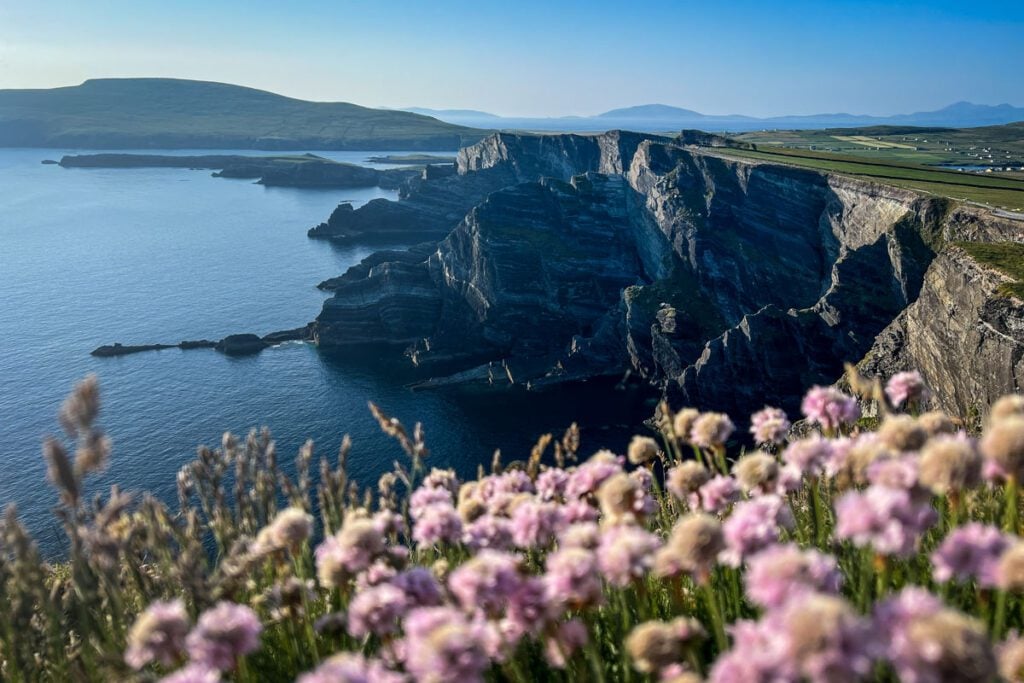
Rushing waterfalls, rugged cliffs that drop into the sea, white sand beaches with turquoise waters, deep blue lakes flanked by towering mountains, thick forests where the fog clings to the treetops…
Do you think I’m describing Ireland or Scotland?
Whichever one you answered with is correct because you can truly find all these landscapes in both places.
Overall, the types of landscapes are somewhat similar.
But if you pushed me to further contrast the two, I’d tell you that Scotland is more rugged . More remote. The mountains are higher, the coastlines more removed.
On the other hand, Ireland is greener and has some of the most spectacular seaside cliffs we’ve ever seen. So it depends on your preferences, really.
Our winner: Scotland
Scotland has more varied and dramatic landscapes. Think higher mountains and more remote coastlines.
Hiking in Scotland vs. Ireland
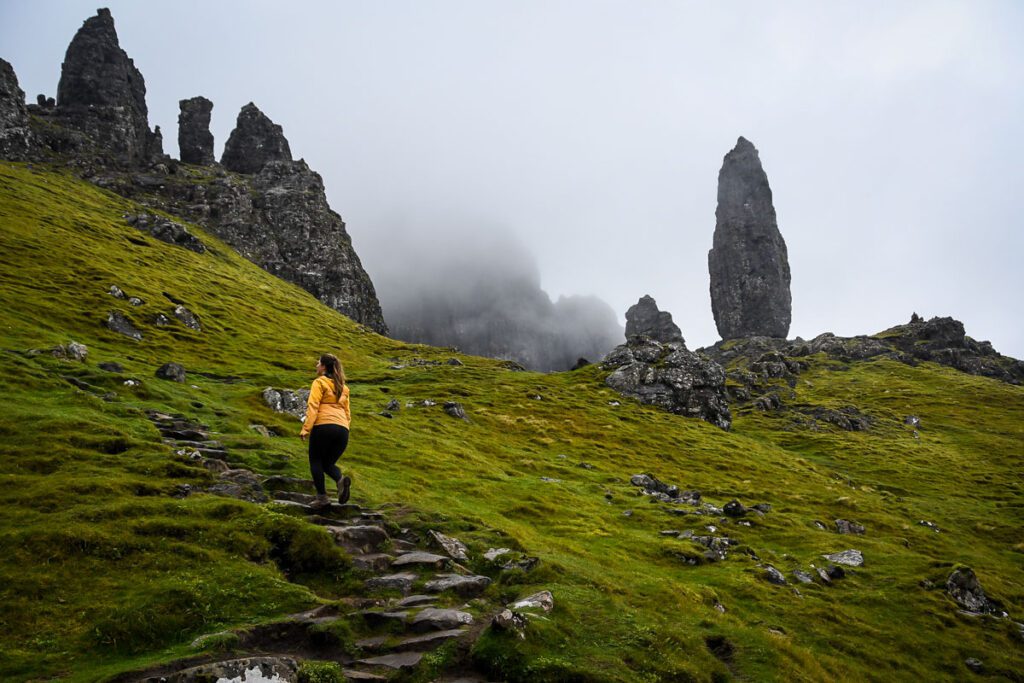
If you love hiking as much as we do, you’ll want to be sure to pack your boots for your trip regardless of whether you choose Ireland or Scotland.
While Scotland has higher peaks, both countries have a slew of incredible adventures to be had. From coastal trails to long-distance routes to steep-but-rewarding climbs, you’ll find your hiking bliss in both Ireland and Scotland.
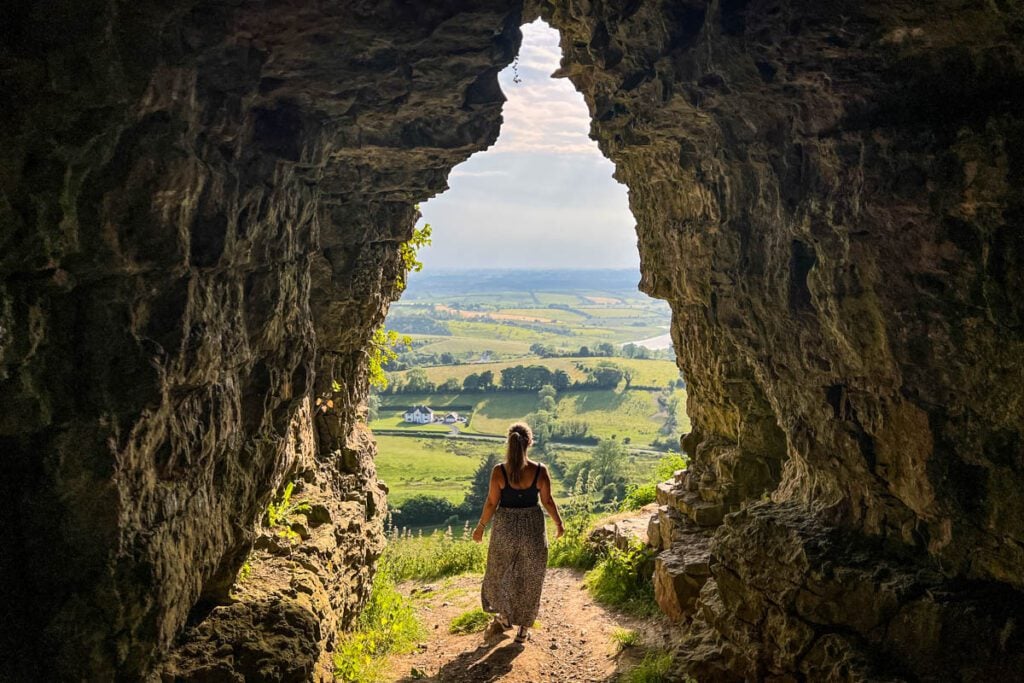
Our favorite hikes in Ireland:
- Diamond Hill
- Keash Caves
- Slieve League
- Secret Waterfall
- Giant’s Causeway
- Benwee Head (on our bucket list!)
- Slieve Doan (on our bucket list!)
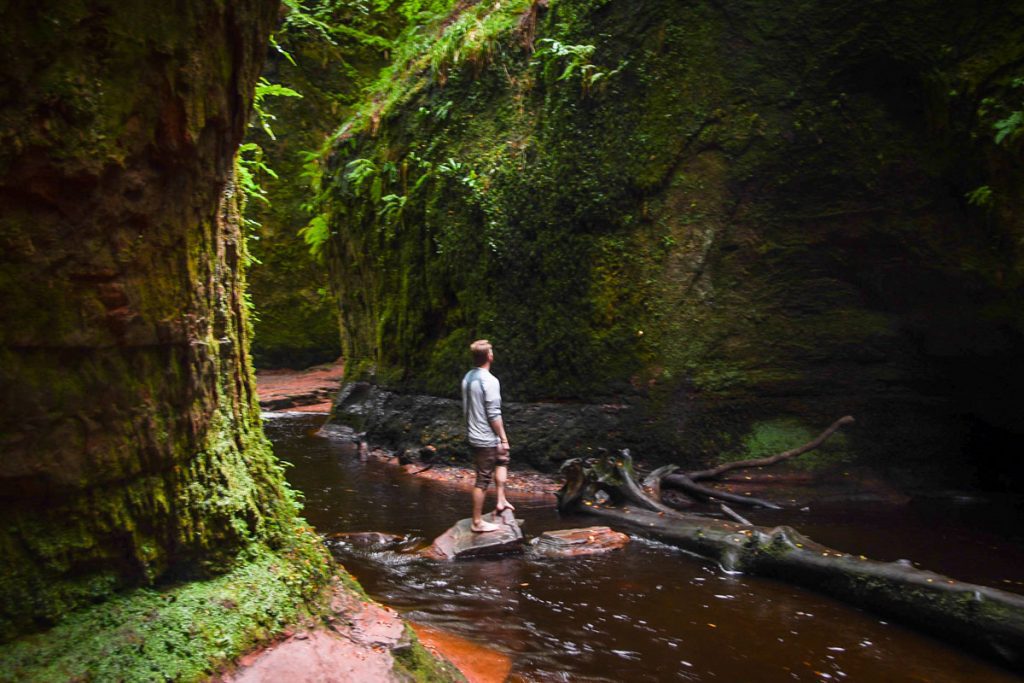
Our favorite hikes in Scotland:
- Finnich Glenn
- Old Man of Storr
- Happy Valley
- Fairy Glenn
- Steall Waterfall
Our winner: Tie!
We think both countries have amazing hiking opportunities. Personally, the hikes we did in Scotland were a bit more epic, but that was based mostly on our route and the amount of time we had. We think Ireland has just as many great hiking trails.
Castles in Scotland vs. Ireland
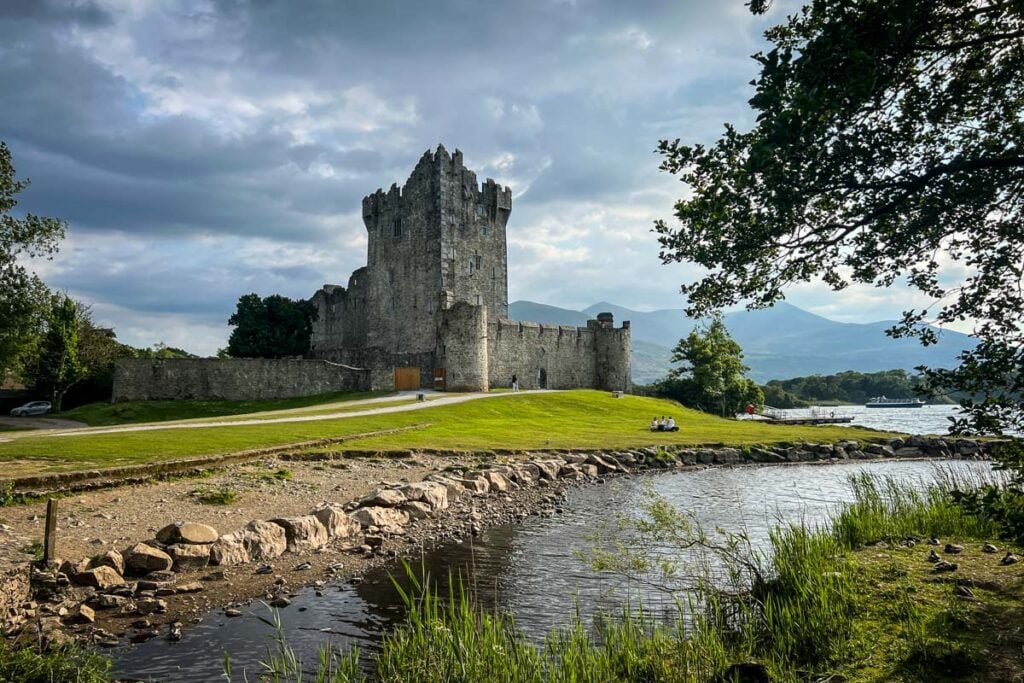
If you love castles, then you’ll be pleased to know that you’ll find plenty in both countries. Truly, you might even get a little sick of them because there are so many.
After some digging, I found that there is no exact count of the number of castles in each country. However, it is estimated that Ireland is home to more than 30,000 castles (and ruins), while Scotland has more than 3,000.
Psst! Check out our list of the best castles in Scotland !
That means there are quite a lot more castles in Ireland than Scotland . That actually surprised me because I personally felt like I saw more in Scotland, but the numbers don’t lie!
Our winner: Ireland
There are more castles in Ireland; but if I’m honest, you’ll see more than enough in either country.
Fun things to do in Scotland vs. Ireland

Which has more to do: Ireland or Scotland?
Oh, gosh, I don’t think I can answer that question fully. I think both have endless adventures to be had and many ways to get off the beaten track.
We had truly incredible and action-packed trips to both Ireland and Scotland. And we still have huge bucket lists for each country because we didn’t get to it all. (You never can!)
Instead of choosing a winner for this category, I’ll leave you with some of our favorite activities in both Ireland and Scotland:

Best things to do in Scotland
- Trek into Cairngorms National Park to see reindeer.
- Road trip around the Isle of Skye.
- Have afternoon tea in Edinburgh.
- Watch the sunset from the beach on the northeast shore of Loch Ness.
- Go hiking in Glencoe.
- Keep reading our whole list of amazing things to do in Scotland!
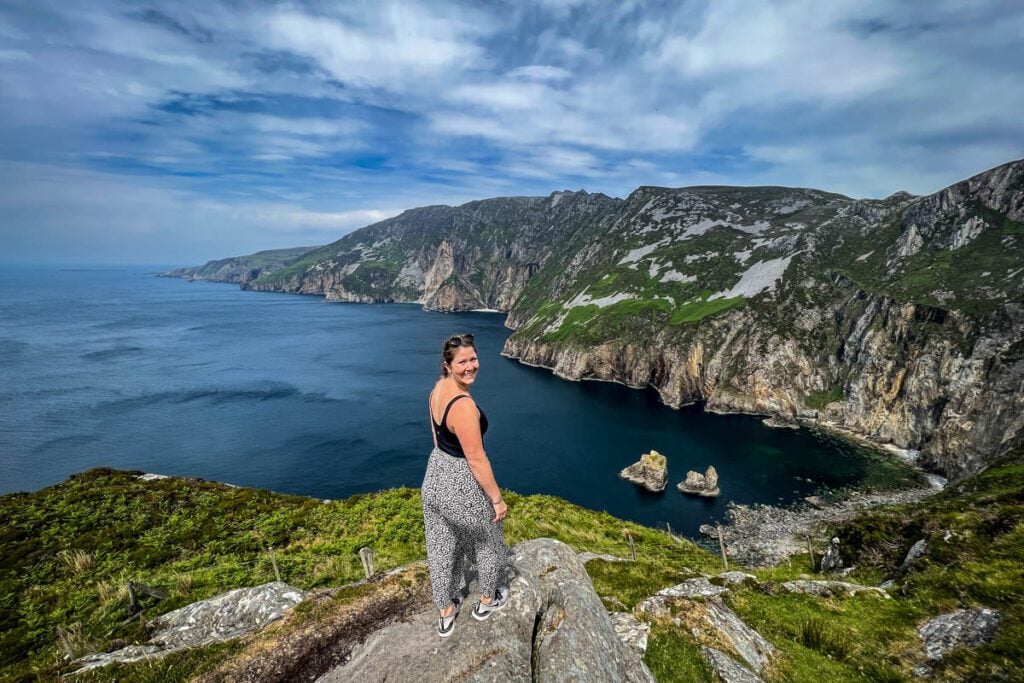
Best things to do in Ireland
- Road trip around the Dingle Peninsula on Slea Head Drive.
- Marvel at the cliffs around Ireland (Cliffs of Moher, Slieve League, Kerry Cliffs, and more!)
- Enjoy live music in an Irish pub.
- Take a black taxi tour in Belfast.
- Watch a sheepdog demonstration.
- Keep reading our entire list of fun things to do in Ireland!
Like I said, both countries will keep you plenty busy with all sorts of fun things to do!
Cities in Scotland vs. Ireland
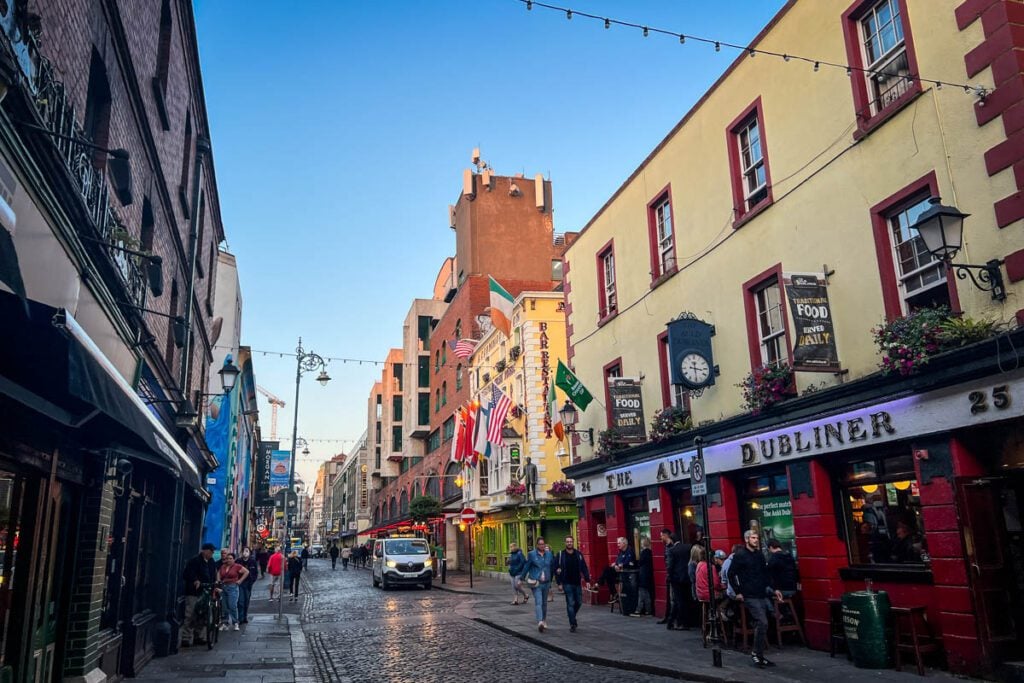
I’ll get straight to the point: We’re not big city people.
When we travel, cities aren’t our main focus. We almost always love the smaller towns and countryside much more than the big cities.
However, we couldn’t very well go to Scotland without seeing Edinburgh, now could we? And same with Dublin in Ireland.
In both Scotland and Ireland, our favorite places were in nature. That said, we really were blown away by the big cities in Scotland. I could live in Edinburgh!
While we didn’t dislike the cities in Ireland per se, we liked the cities in Scotland more.
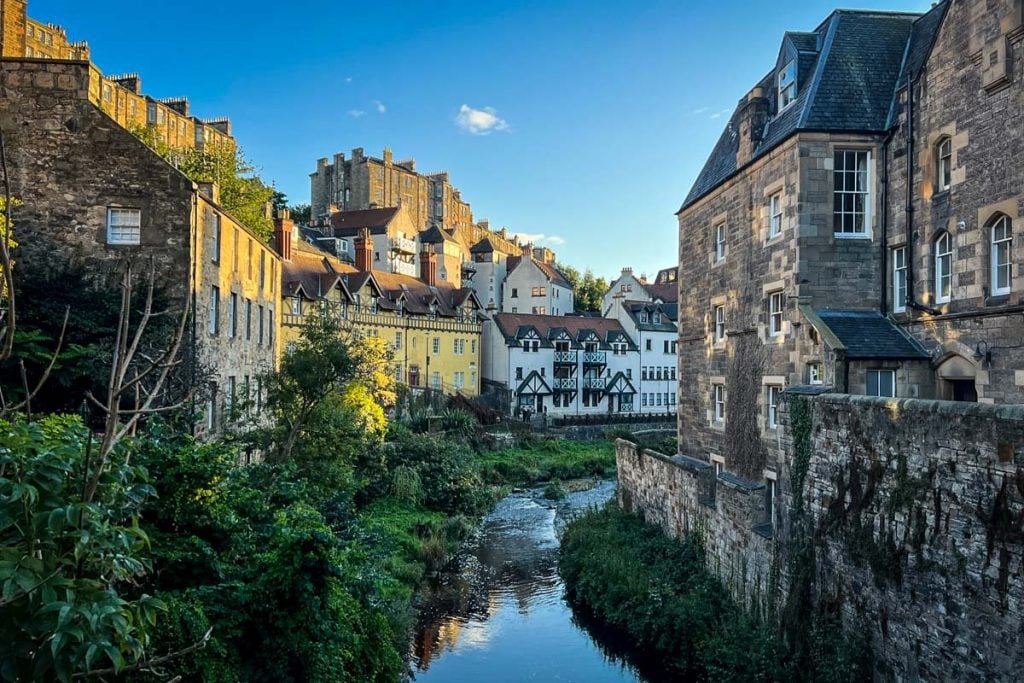
Our favorite cities in Scotland:
Read more: We have a whole list of the best places to visit in Scotland .
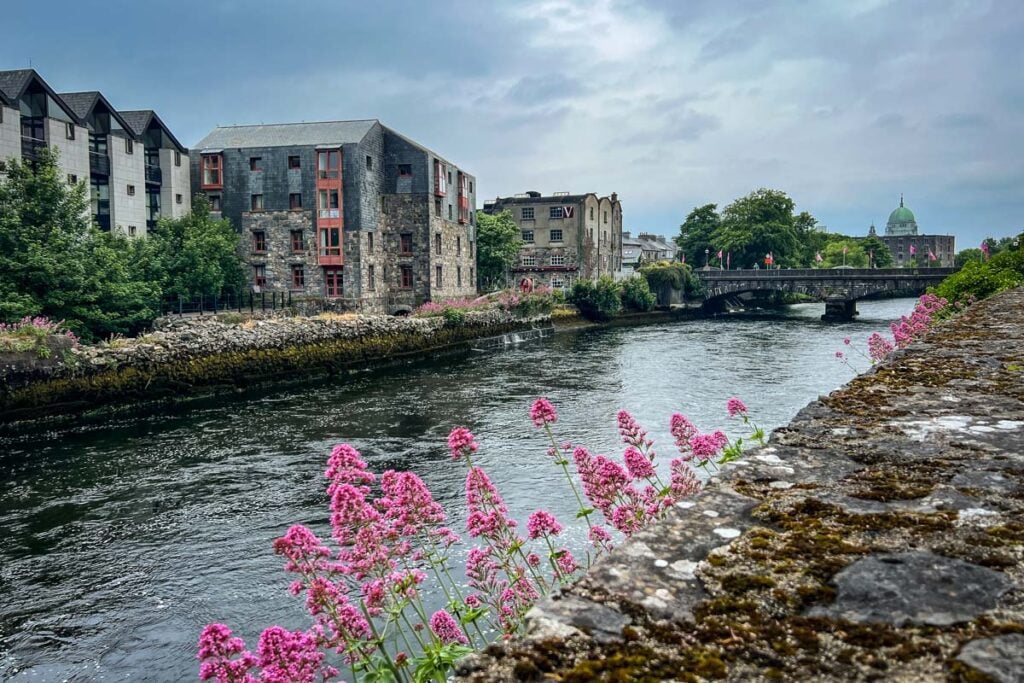
Our favorite cities in Ireland:
- Dublin
Read more: We have a whole list of the best places to visit in Ireland .
We liked the cities in Scotland more than those in Ireland. While we didn’t dislike Dublin or Belfast, we really loved Edinburgh and Glasgow (each for different reasons).
Smaller towns in Scotland vs. Ireland
Not to confuse you, but if we change the parameters to small towns, our winner is now Ireland. Again, not by much, but we found so many charming small towns in Ireland that we adored.
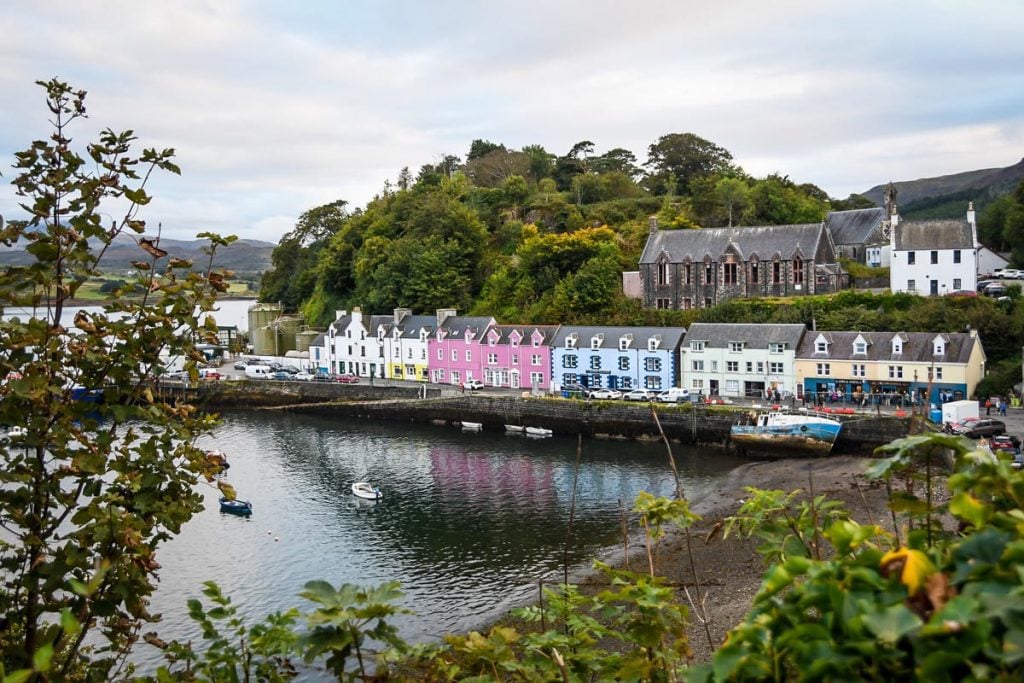
Our favorite small towns in Scotland:
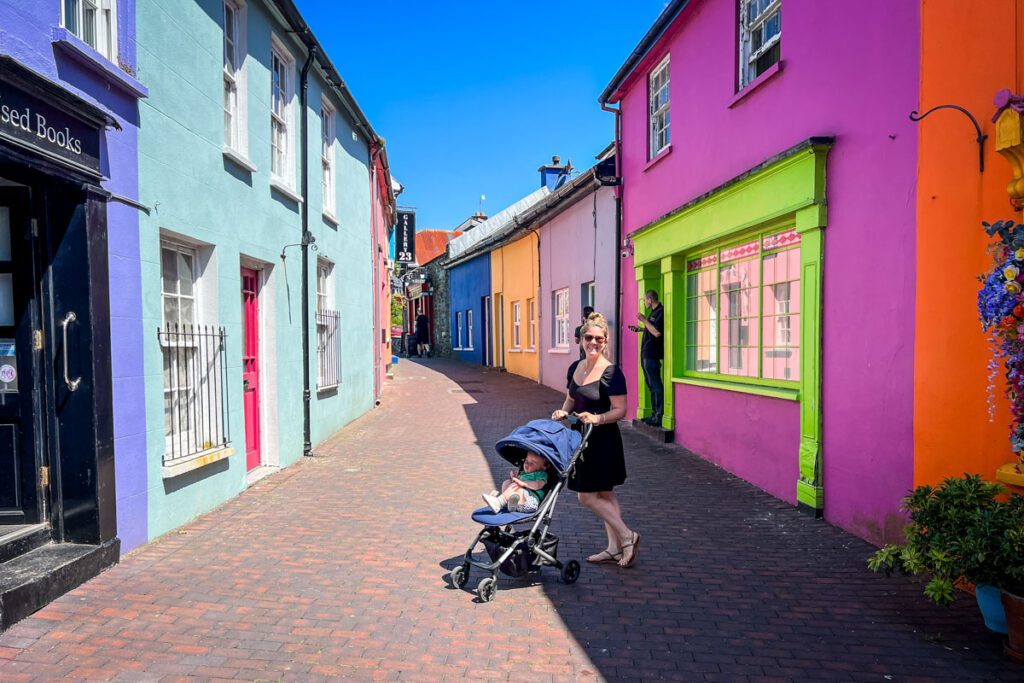
Our favorite small towns in Ireland:
There’s just something about the villages in Ireland that beg you to stay!
Culture & History in Ireland vs. Scotland
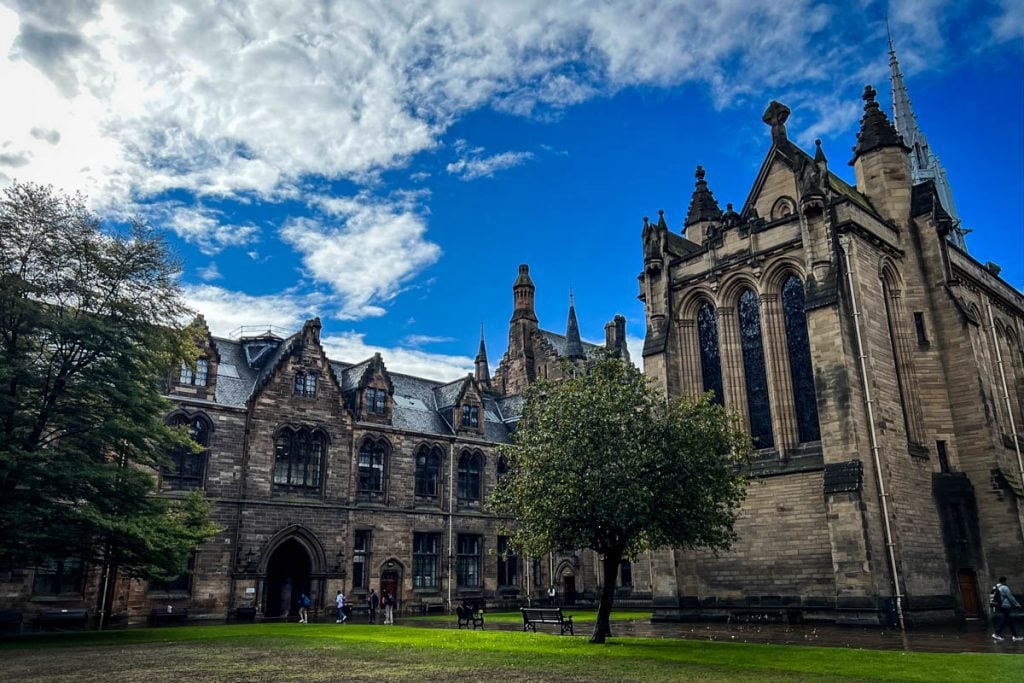
Both Ireland and Scotland have a shared Gaelic culture, and you can find oodles of historic places and cultural attractions in each.
It’s hard to compare because each country has a vivid and complex history which you can learn about on your trip.
We personally felt like the pub culture is stronger in Ireland than in Scotland. It’s not by a ton, but noticeably more, which we expected. Irish pub culture and folk music is legendary, after all.
Additionally, in Ireland we felt like there was more Gaelic pride visible to outsiders, as it is on all signs along with English in the Republic of Ireland (we didn’t notice it as much on signs in Northern Ireland).
With more visible Gaelic pride and a stronger pub culture (as well as nightlife, if that’s what you’re into), you can just feel the culture in Ireland.
Driving in Ireland vs. Scotland
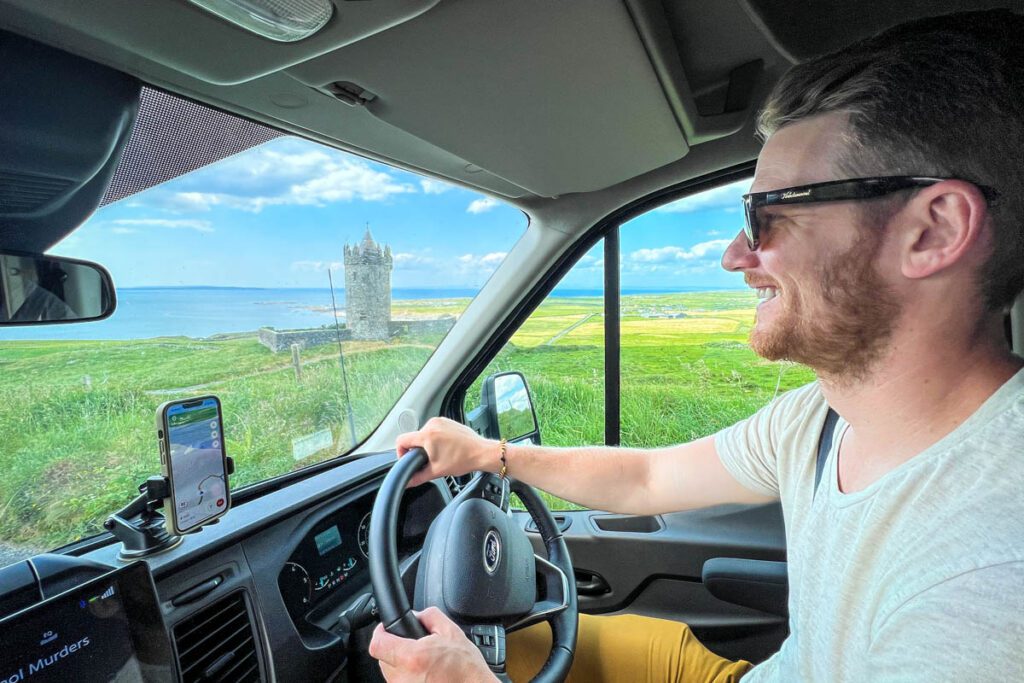
We rented motorhomes in both Ireland and Scotland , so we have quite a bit of personal driving experience to speak from.
Left-hand side of the road
In both countries, you drive on the left side of the road , so if you’re used to driving on the right (like we are), it can be a bit different at the start.
In both countries, the roads are quite well-marked in towns and cities. Ireland, especially, had a lot of “stay left” indicators.
After a little practice and some chanting (“left side, left side!”), you shouldn’t have too much of a problem remembering which side to stay on.
Narrow roads
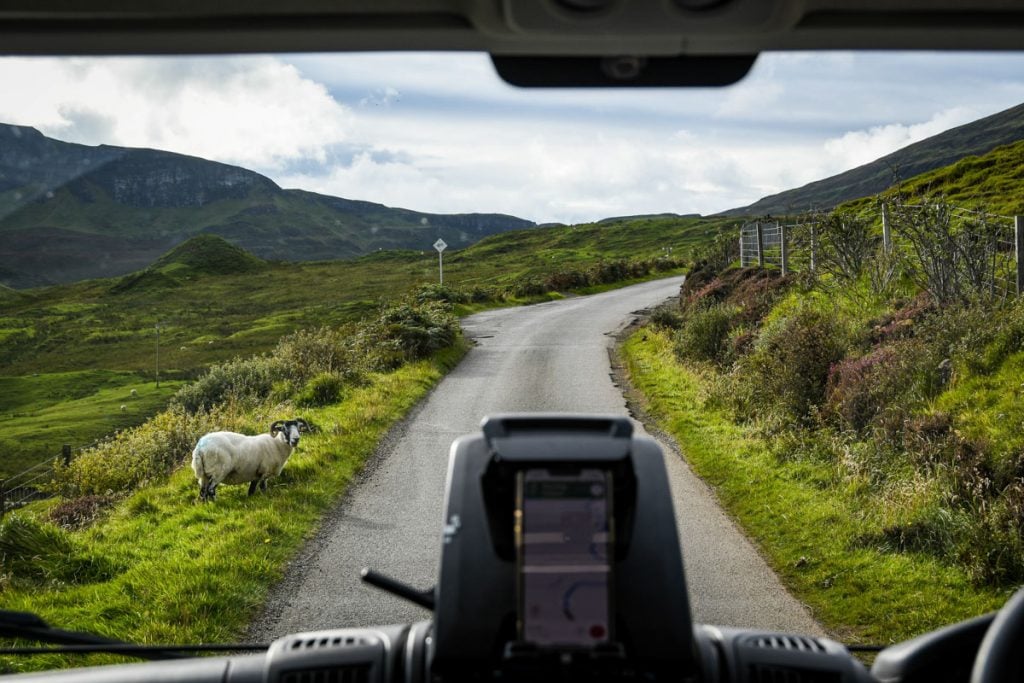
Both Ireland and Scotland have very narrow roads through the rural areas. You’ll quickly get used to single lane roads where you will pull out to let oncoming traffic pass.
When passing small villages, your vehicle may brush the hedges. For this reason, we’d recommend choosing the smallest vehicle that will work for you in both Ireland and Scotland.
Between the two, Ireland’s roads seemed narrower.
Driving in cities
Our least favorite part of driving in both Ireland and Scotland was in the major cities.
Part of this is due to the fact that we were driving large vehicles in each, so maneuvering them on busy city streets in traffic wasn’t fun.
Plus, parking in big cities can be difficult with a motorhome or campervan, as you can’t enter parking garages due to height restrictions.
With more stretches of open road, Scotland felt slightly easier for driving (especially in a big vehicle).
Accommodations in Scotland vs. Ireland

Both Ireland and Scotland have plenty of accommodation options, from traditional hotels and inns to unique Airbnbs and cozy glamping stays (we have glamping guides for both Scotland and Ireland !). We had memorable stays in both countries.
Where you stay is going to depend a lot on whether you’ve chosen to rent a car or a campervan (more on that in a sec!).
With the exception of Edinburgh, Scotland’s cities tend to have slightly cheaper accommodations than Ireland’s cities. Both countries have budget, mid-range, and luxury options.
Psst! Make sure you read the secrets to how we never book a bad Airbnb – we’ve basically got it down to a science!
We’ll give this one to Scotland for having slightly better prices, but in terms of quality, uniqueness, and variety, it would be a tie.
Camping in Scotland vs. Ireland

As we mentioned above, we did campervan trips in both Ireland and Scotland, and had incredible experiences in both countries.
We’d highly recommend this as a way to experience both Ireland and Scotland, and we’ve got lots of tips for you if this is how you choose to travel:
- Renting a campervan in Scotland
- Renting a campervan in Ireland
Overall, the campgrounds are very similar in Ireland and Scotland. Sites are not exactly private or wooded like you’d find in much of North America. Instead, you’ll find parking spots and hookups with a range of facilities.
We found the quality of campgrounds was pretty similar in both Ireland and Scotland. We had a couple of really nice campgrounds as well as a few, let’s just say, rustic campgrounds. Prices were also pretty much the same.
Psst! We have detailed camping guides for both Scotland and Ireland !
On a similar note, it is legal to wild camp in both Ireland and Scotland (aka camp in a non-designated campground). If you’re in a self-contained vehicle and looking for a little adventure, then this can be a great option. We did a bit of wild camping in both places and had great experiences.
Insider Tip: Park4Night is the best app for finding legal places to wild camp in both countries.
Again, this one is too close to call. Both Scotland and Ireland offer great opportunities for camping, as well as for getting a taste of #vanlife .
Psst! If you’re thinking of adding England and/or Wales to your itinerary, check out our list of the best campervan rentals in the UK .
Crowds in Scotland vs. Ireland
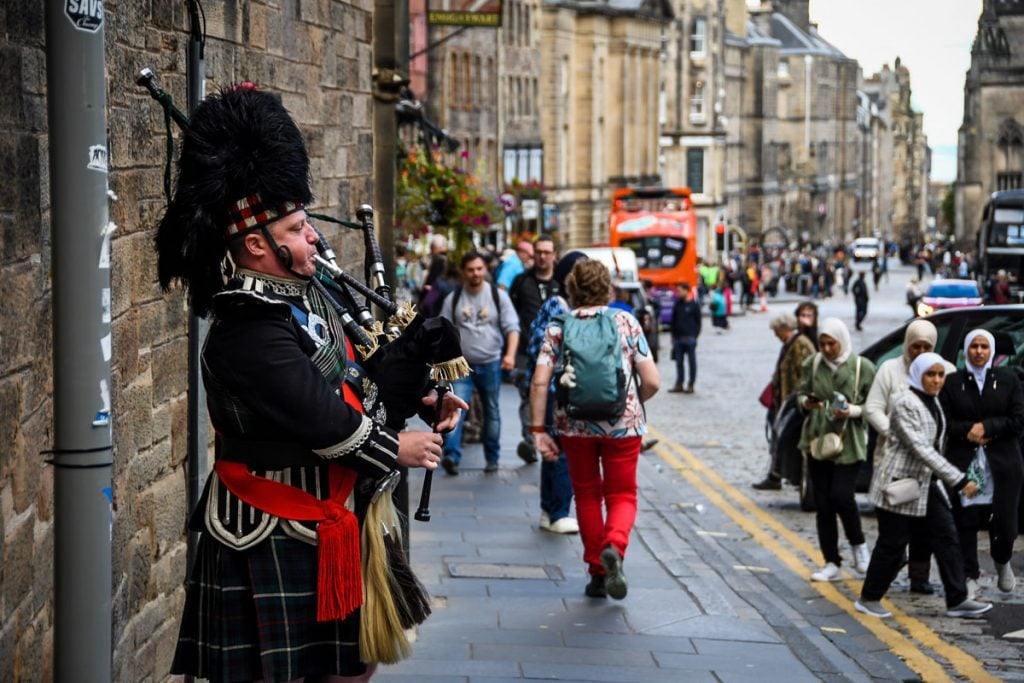
Which is more popular with international tourists: Scotland or Ireland?
The data is understandably a little hard to read over the last few years, but in the last full year of truly “normal” travel (2019), Ireland saw more than three times as many tourists as Scotland .
- Ireland: 11.3 million international tourists (2019)
- Scotland: 3.5 million international tourists (2019)
While there are certainly crowded areas in both Ireland and Scotland, we definitely felt it more in Ireland . Well, except for the Queen’s funeral procession, which we just happened to be in Edinburgh for. But that was obviously a one-off thing.
We visited Ireland at the beginning of peak tourist season, but even still, it didn’t feel nearly as crowded as some European countries we’ve traveled to in the summer (I’m talking about you, Croatia !).
The Cliffs of Moher were definitely the most crowded place we visited in Ireland. Most other places didn’t feel too terribly crowded, even on the weekends.
If you’re looking to get away from the crowds, there are definitely places you can do that in both countries, but Scotland is less touristy overall.
Which is more family-friendly: Scotland vs. Ireland?

We found both Ireland and Scotland to be family-friendly.
We traveled with our daughter to both places and found we didn’t have to sacrifice much.
Tips for traveling with a baby in Scotland or Ireland
We have tons of tips for traveling with a baby to make your family trips feel more doable! But here are a couple of tips specific to Scotland and Ireland:
- In both Ireland and Scotland, we found that some distilleries allow minors and some don’t, so this is an activity that you’d want to research in advance.
- We found many cocktail bars allow minors until a certain time (usually 6 or 7 p.m.). Pubs that serve food tend to allow children later, but it can be a good idea to reach out and ask if it’s a place you really want to go to.
Round-up of the winners: Scotland vs. Ireland
Are you keeping score?
If you want to see how Ireland and Scotland compare on all categories in one place, here ya go:
- Weather: Ireland
- Food: Ireland
- Budget: Scotland
- Landscapes: Scotland
- Hiking: Tie
- Castles: Ireland
- Things to do: Tie
- Cities: Scotland
- Towns: Ireland
- History & Culture: Ireland
- Driving: Scotland
- Accommodations: Scotland
- Camping: Tie
- Crowds: Scotland
- Family-friendly: Tie
Note: I hope you read the descriptions of each category so you can see why we chose the winner and what the differences are. In most categories, they are very close , and choosing a winner was hard.
How much time do you need in Scotland vs. Ireland?
We think 2 weeks is a perfect amount of time in either Ireland or Scotland. Even 10 days can still give you enough time to see a lot in each place.
Our Personal Opinion: Scotland vs. Ireland

I’ll be honest and tell you we are terrible at choosing favorites. Of anything.
Ask me my favorite foods and you’ll be in for a 5-minute conversation that you weren’t prepared for. I’ll ramble on about all my favorites and how it changes day to day because, well, I can’t just choose one. That would be crazy talk.
Okay, now that you know me a little better ( hey, let’s be friends! ), you can understand why I can’t just give you a straight answer to the question, “Which is better: Ireland or Scotland?”
First of all, I don’t think you can ever definitively say one country is better than another.
But I also know you came here to get some sort of answer, so I won’t just leave you hanging. If you’re wondering which country to travel to – Ireland or Scotland – here’s what I’d tell you:
- Ireland wins just slightly when it comes to culture and history.
- Scotland wins for landscapes that are more varied, and as Ben says, just a little more epic.
They are tied in many other categories and are both excellent choices, so honestly, don’t overthink it. (Easier said than done, I know.)
At any rate, I’ll leave you with this little gem… I hope it helps you make a decision (or at least makes you laugh!).
- Katie: “Hey Ben, let’s play a game.”
- Ben: *looks up from his computer, a little weirded out* “Okay…?”
- Katie: “Summer or winter?”
- Ben: “Summer.”
- Katie: “Hot dog or hamburger?”
- Ben: “Hamburger.” *kind of catching onto the game*
- Katie: “Apple or orange?”
- Ben: “Orange.”
- Katie: “Ireland or Scotland?”
- Ben: *long pause* “Umm… Scotland? Well, wait now…”
- Katie: “Ha. Got it! Can’t change it now!”
- Ben: *stares at me* “Why?”
- Katie: “Because those are the rules. And I need you to pick one because I can’t!”
Ben went on to defend his decision, “In terms of overall epicness, I think Scotland wins by 1%. The mountains are bigger… the coastal drives are… well, actually they’re equal. That’s why it’s only one percent. It’s the mountains!”
So there ya have it. And I kind of agree with him . If I had to choose, Scotland wins by 1%.
Please, no hate mail from our Irish friends. We love you and your country, and can’t wait to return!
Remember, both Ireland and Scoland are truly incredible places to explore and they make amazing road trips. Whichever you choose will be a fantastic choice, I can guarantee it.
And the good news is that if you love your trip, you know you’ll love the other country, so why not plan that as a next vacation!?
We have quite literally all the resources you need for both trips, after all!
More resources for planning your trip to Ireland
We’re creating lots of resources for travel in Ireland and destinations throughout the country. Check out our Ireland Travel Homepage for everything you need to know, or read some of our favorite articles below.
- Ultimate 2-week Ireland Road Trip Itinerary
- Essential Ireland Packing List: FREE Download!
- Best Time to Visit Ireland: When to Go & When to Avoid
- Places to Visit in Ireland You Can’t Miss!
- Unforgettable Things to do in Ireland: Ultimate Bucket List
More resources for planning your trip to Scotland
We have lots of resources on travel in Scotland and destinations throughout the country. Check out our Scotland Travel Homepage for everything you need to know, or read some of our favorite articles below.
- Ultimate 2-week Scotland Road Trip Itinerary
- Complete Scotland Packing List: FREE Download!
- Best Time to Visit Scotland: When to Go & When to Avoid
- Best Places to Visit in Scotland
- Unforgettable Things to do in Scotland
Save this article on Pinterest for later!
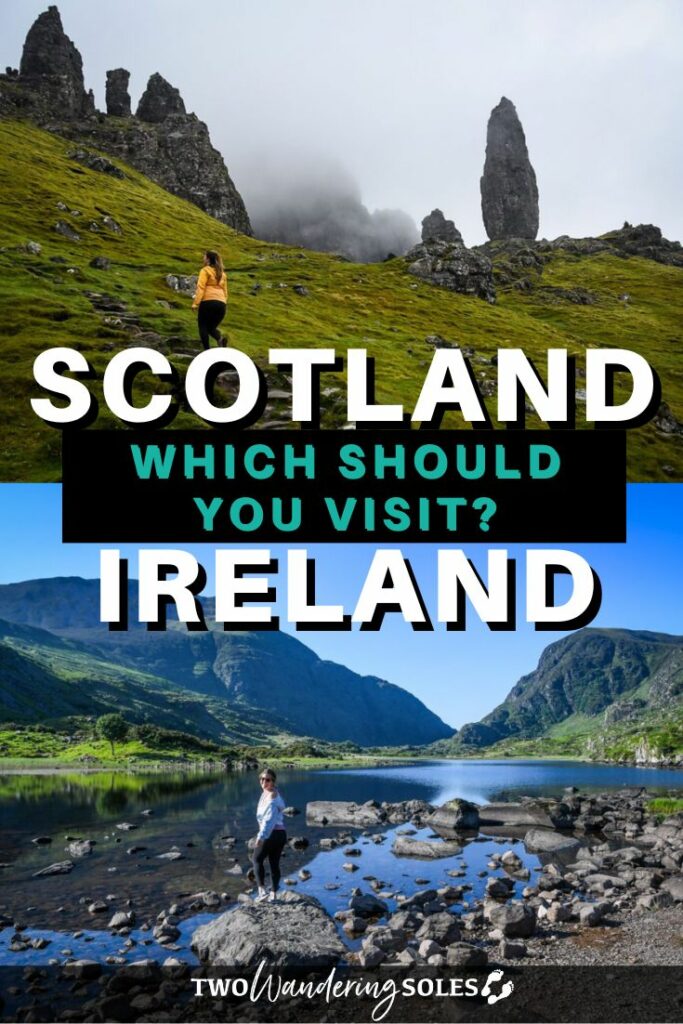
We want to hear from you!
Okay, let’s hear it: what’s your opinion on this debate? Which would be your personal pick in Scotland vs. Ireland? Do you have any other questions for us? Leave your comments below and we’ll try our best to bet back to you!
Comments (3) on “ Scotland vs. Ireland: Which should you visit? ”
Very helpful! Love the winner section of categories idea! And I still can’t decide. lol What small/rural town (in Ireland and Scotland) would you recommend visiting to ‘get to know’ some locals and ‘stay a while’ in one area to get a better experience of life/culture away from tourism? Of course, this area would have to have opportunities to be near locals. (sometimes difficult in rural areas where you didn’t actually grow up with everyone there)
As a native of Dublin who lives in Glasgow I can tell you Glasgow is bigger than Dublin in size, Maybe you should research better you only need to use Wikipedia to see Glasgow is bigger your blog is very misleading.
Your article is interesting.
Leave a Reply Cancel reply
Your email address will not be published. Required fields are marked *
Save my name, email, and website in this browser for the next time I comment.
Stay up to date with notifications from The Independent
Notifications can be managed in browser preferences.
UK Edition Change
- UK Politics
- News Videos
- Paris 2024 Olympics
- Rugby Union
- Sport Videos
- John Rentoul
- Mary Dejevsky
- Andrew Grice
- Sean O’Grady
- Photography
- Theatre & Dance
- Culture Videos
- Food & Drink
- Health & Families
- Royal Family
- Electric Vehicles
- Car Insurance deals
- Lifestyle Videos
- UK Hotel Reviews
- News & Advice
- Simon Calder
- Australia & New Zealand
- South America
- C. America & Caribbean
- Middle East
- Politics Explained
- News Analysis
- Today’s Edition
- Home & Garden
- Broadband deals
- Fashion & Beauty
- Travel & Outdoors
- Sports & Fitness
- Sustainable Living
- Climate Videos
- Solar Panels
- Behind The Headlines
- On The Ground
- Decomplicated
- You Ask The Questions
- Binge Watch
- Travel Smart
- Watch on your TV
- Crosswords & Puzzles
- Most Commented
- Newsletters
- Ask Me Anything
- Virtual Events
- Betting Sites
- Online Casinos
- Wine Offers
Thank you for registering
Please refresh the page or navigate to another page on the site to be automatically logged in Please refresh your browser to be logged in
Can I travel to Ireland from the UK? All the rules you need to know
Ireland has tightened its entry requirements for all visitors, article bookmarked.
Find your bookmarks in your Independent Premium section, under my profile
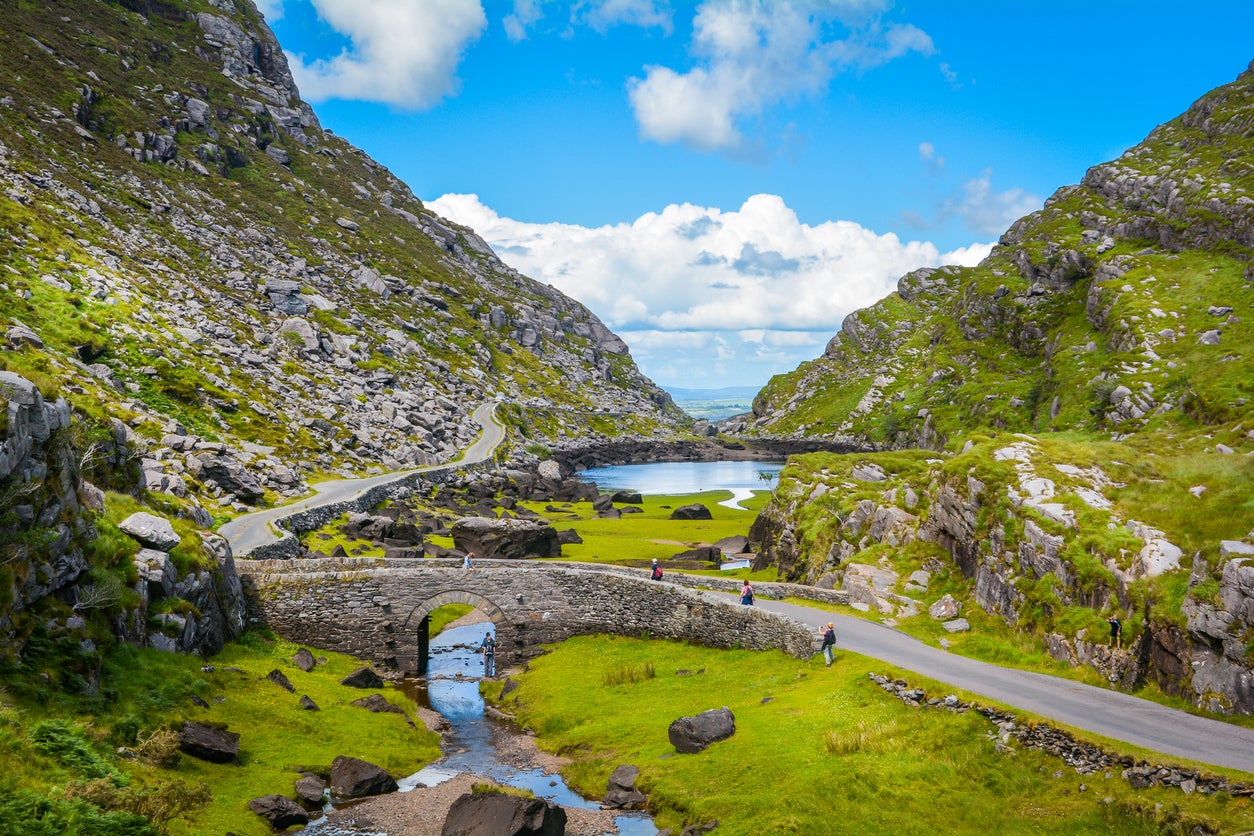
Sign up to Simon Calder’s free travel email for expert advice and money-saving discounts
Get simon calder’s travel email, thanks for signing up to the simon calder’s travel email.
With countries around the world adjusting entry rules and travel testing requirements in the face of the omicron variant, Ireland has announced its own rule changes for visitors.
Those from Great Britain may still enter the country, but the required paperwork is set to increase.
The Irish government announced on 2 December that it would be requiring a negative test result from all travellers from abroad, regardless of vaccination status - with the change coming in from 5 December 2021.
Here’s everything we know so far.
What are the new rules?
From 5 December onwards, anyone entering Ireland from abroad must show a negative Covid test result on arrival.
Vaccinated travellers who had their second jab more than 14 days prior to arrival, and have their proof of vaccination with them, may present a result from either a PCR test (taken within the 72 hours beforehand) or an antigen test (taken within the 48 hours beforehand).
Unvaccinated travellers must take a PCR test within the 72 hours prior to arrival.
One exception is travellers from Northern Ireland who have not been outside Northern Ireland or Ireland for the 14 days prior to entry - visitors who meet this criteria do not need a passenger locator form, proof of vaccination, proof of recovery or test results upon arrival.
Children under 12 are also exempt from the test result requirement.
Test results must be from a professional-administered Covid test with results sent to travellers electronically, the rules specify, and, as with all other international travel, UK residents may not use free NHS tests.
All passengers must complete Ireland’s passenger locator form online within the 72 hours before travel.
This means the full checklist for visitors from outside the island of Ireland is as follows:
Vaccinated people aged 12 or over
Negative result from an antigen or PCR test
Proof of vaccination
Valid ID (passport or driver’s license accepted)
Unvaccinated or partly vaccinated people aged 12 or over
Negative result from a PCR test
Anyone who has been in one of seven named “scheduled states” - Botswana, Eswatini, Lesotho, Mozambique, Namibia, South Africa and Zimbabwe - within the 14 days before arrival will be subject to further restrictions and testing, details of which can be found here .
From which date do I need to present a test?
The new rules kicked in from 00.01 on Sunday 5 December.
Arrivals from this time onward into Ireland must have their negative test result ready for checking at the border.
The government had announced that testing would be compulsory from 3 December onwards, but later announced that there was a 48-hour delay.
An Aer Lingus spokesperson told the Irish Examiner : “The Irish government notified airlines last night that the new Regulations will now have an operational date of 5 December and not 3 December as previously advised.
“We will implement accordingly.”
How long will the rules be in place?
Although the Irish government has not stamped the new rules with an end date, a spokesperson for Tourism Ireland told The Independent that the testing requirement will be in place for “an initial two week period and will be reviewed again then”.
Many governments are in the process of tightening travel restrictions to contain the spread of the omicron variant until more is known about its potential impact, and the efficacy of vaccines on this type of Covid-19.
Assuming Ireland is taking a similar approach, it is likely that they will review testing rules within a month or so, once more is known about the variant.
Join our commenting forum
Join thought-provoking conversations, follow other Independent readers and see their replies
Subscribe to Independent Premium to bookmark this article
Want to bookmark your favourite articles and stories to read or reference later? Start your Independent Premium subscription today.
New to The Independent?
Or if you would prefer:
Want an ad-free experience?
Hi {{indy.fullName}}
- My Independent Premium
- Account details
- Help centre
- Deutschland
Is UK & Ireland Safe To Visit? UK & Ireland Travel Tips
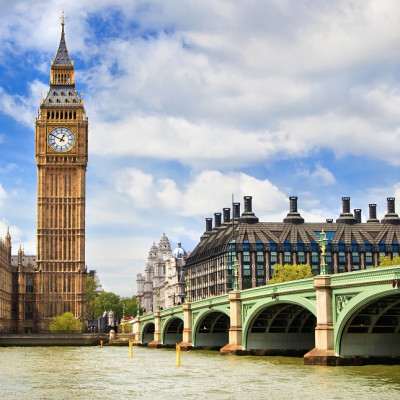
UK and Ireland safety tips
If you’re wondering whether the UK and Ireland are safe regions to visit, the answer is yes! Nevertheless, minor crimes such as petty theft are not unheard of. It’s wise to take the same precautions as you would at home and make sure someone knows where you are at all times during your vacation.
As a general rule, avoid carrying large sums of money around with you and be vigilant with your PIN when using ATM machines. Keep valuables locked away when not in use and maintain a record of the serial numbers on any electronics so they can be tracked if they’re stolen.
Safety in London and other places in UK and Ireland
When visiting busy cities and towns in the UK, be wary of your surroundings and keep track of your belongings at all times. Beware of pickpockets and fraudsters in particularly busy areas.
If you’re driving in large cities such as London, Edinburgh and Dublin, it’s best to keep your vehicle in a secured car park, especially if you’re leaving it overnight. When using public transport (particularly the London Underground) after dark, it’s safer to sit in carriages with other people in them rather than on your own.
Are the UK and Ireland safe outdoors?
Thankfully, there are no venomous insects or dangerous animals to worry about in the UK or Ireland. If you’re visiting the coast in either region, be wary of strong currents or riptides when swimming in the sea. Also, make sure you stick to designated paths and tell someone where you are if you’re planning on walking in mountainous or remote areas.
Road Safety in the UK and Ireland
It is illegal to drink excessively and drive in the UK or Ireland. In Ireland and Scotland, you cannot get behind the wheel of a vehicle if you’ve had over 50mg of alcohol per 100ml of blood. In England, Wales and Northern Ireland, the limit is 80mg of alcohol per 100ml of blood. Random breathalyzer tests are not uncommon.
For more information, visit the US travel advisory page here .
Emergency Services in the UK and Ireland
If you find yourself in need of immediate assistance when visiting the UK or Ireland, you can contact the emergency services directly by ringing 999 or 112. You’ll find police stations (known locally as Garda stations in Ireland) in most towns and cities if you need to report a crime.

Are UK and Ireland safe? Hear from our destination experts
Your safety is our top priority. Our destination experts are happy to advise on where to visit and general safety tips for UK and Ireland. During your trip, your dedicated Trip Coordinator and guide will make sure you that you are always cared for and well advised. Contact us for an obligation-free, seamless and safe UK and Ireland tour itinerary that is personalized to your interests and preferences.
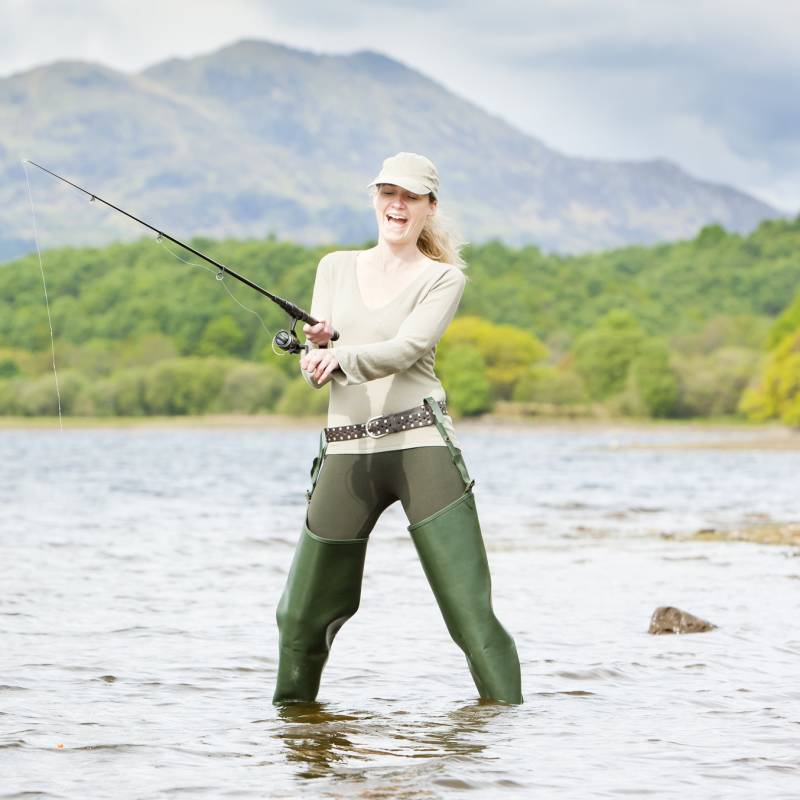
UK & Ireland Travel Guide
Popular trips to uk and ireland.

England and Scotland: Historical Cities
Go back in time as you soak in the history of seven iconic cities across England and Scotland. Unearth the hidden gems of the bustling city of London, admire the UNESCO-listed city of Bath on leisurely walking tours and stroll down the tree-lined avenues of Oxford and Cambridge. Delve deeper into the history of Scotland…
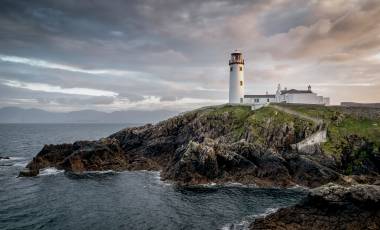
Grand Tour of Ireland
Embark on a comprehensive tour of the Emerald Isle! Beginning in cultural Dublin, take a heritage walk through its famous landmarks and take in a traditional dinner accompanied by live entertainment at a proper Irish pub! Discover Belfast’s blend of history and modernity as your zip through the city in your private black cab! Travel…

Scotland: Heritage Cities and Loch Ness
Explore Scotland’s largest urban sprawls and experience the countryside and famous Loch Ness on this private tour. In Edinburgh, acquaint yourself with Highland history as you walk down the Royal Mile and explore the Old Town. Take a tour of the surrounding countryside and discover medieval abbeys that date back to the time of the…
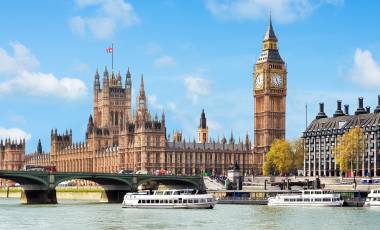

Classic England
Discover the classic highlights on this private and tailor-made England tour. Beginning in London, explore landmarks such as Big Ben, Buckingham Castle, the London Eye, museums, art galleries, and vibrant food and cultural scenes on privately guided tours. Explore Stonehenge with your own expert and then travel to the UNESCO-listed city of Bath, famous for…
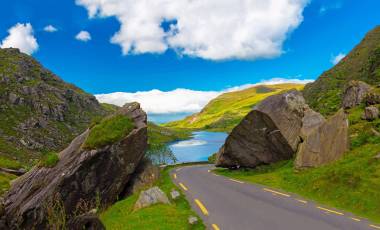
Road Trip: Highlights of Ireland
Explore the breathtaking landscapes and vibrant culture of Ireland at your own pace on this overland tour. Drive past dramatic wildernesses and majestic mountains, amble in the rugged islands and white sand beaches of the Wild Atlantic Way, hike in the hauntingly beautiful Connemara National Park, and discover lively festivals, pubs and authentic Irish culture…

Road Trip: Highlights of Scotland
Experience the vibrant cities, quaint towns, rolling Highlands, and tranquil lakes of Scotland at your own pace. Discover ancient history and architecture, hike in the rugged Isle of Skye, see the iconic Glenfinnan Viaduct, and vast lochs as you drive through this spectacular land peppered with quaint rural villages, castles, forts and whiskey distilleries!
Best Places To Visit
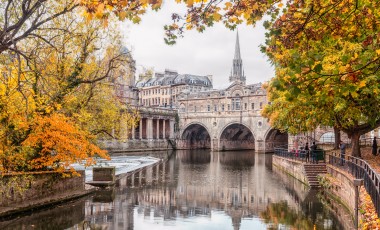
The UNESCO World Heritage site of Bath is all about soaking in history, quite literally! Named after the well-preserved Roman-era baths found here, the city continues with its spa tradition to this day.
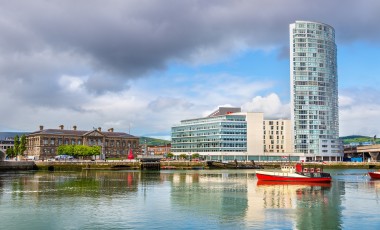
A famous port city, Belfast today is sought after for its elegant Victorian landmarks, glitzy waterfront attractions, and fabulous gastronomic experiences.
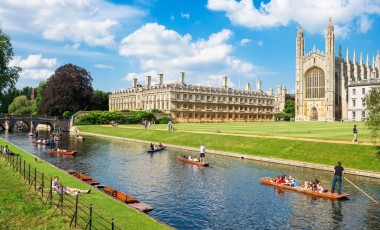
Cambridge is a university town located along the River Cam in eastern England. With its stunning architecture, cobbled streets and rich history, this city is quintessentially English. The University of Cambridge is at the heart of the town and the area is dotted with college grounds and imposing buildings.
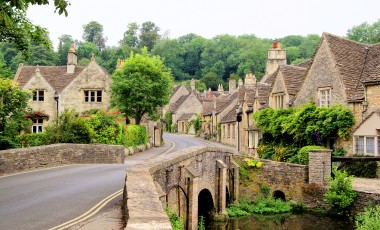
Celebrate the Cotswolds, a wonderful collection of rural counties in south-central England, designated as an Area of Outstanding Natural Beauty, best explored on historic walking trails and driving along the picturesque Cotswolds Romantic Road.
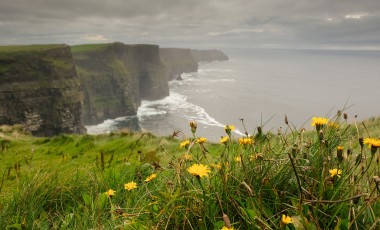
County Clare in western Ireland is known for its natural beauty and culture, from the showstopper Cliffs of Moher that features crashing Atlantic swells, to the lively Irish culture that reels you into intimate gatherings.
County Clare
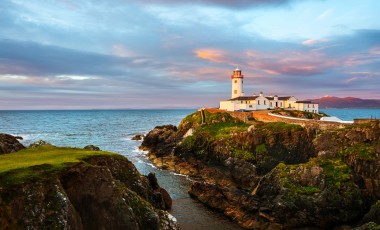
The quaint town of Donegal, in Co. Donegal, is perched by the mouth of a serene bay against the stark Blue Stack Mountains, part of the Wild Atlantic Way coastal route. Prehistoric ruins, ringforts and defensive structures speak to its history as an important settlement.
Best Time To Visit
Discover the best time to visit UK & Ireland. Our destination experts provide an overview on the ideal travel time and weather to ensure that you see the best of the region.
Things To Do
With centuries of extraordinary history to discover and plenty of jaw-dropping scenery to admire, you’ll never be short of things to do in the UK and Ireland. Read more about the top things to see and do.
What Our Guests Say

The Enchanting Difference
Authentic & unique.
Our award-winning, licensed local guides provide incredible insights and exclusive experiences for you.
Personalized & Private
Our experts completely customize your private tour to match your interests and preferences.
High-Quality Experiences
All our accommodations and services are personally tested by our team.
Fully Supported Travel
You’ll have a personal and dedicated trip coordinator, backed by 24/7 support in case of emergencies while you’re traveling.
Financial Protection & Flexibility
Your booking is flexible and completely secure with us.
Safe & Secure
Your safety and well-being are our top priorities.
Do you have a vacation in mind? Personalize your itinerary with our Trip Builder.
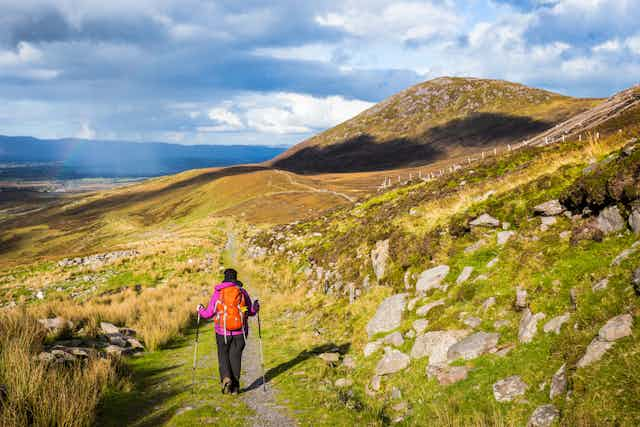
What Brexit means for future of the Common Travel Area between Ireland and the UK
Reader in Public Law, Newcastle University
Lecturer in Law, University of Birmingham
Disclosure statement
Colin Murray receives funding from the Economic and Social Research Council to support the project “Performing Identities: Post-Brexit Northern Ireland and the reshaping of 21st-Century Governance" (Grant ES/S006214/1). This article does not reflect the views of the research council.
Ben Warwick receives funding from the Economic and Social Research Council to support the project “Performing Identities: Post-Brexit Northern Ireland and the reshaping of 21st-Century Governance" (Grant ES/S006214/1). This article does not reflect the views of the research council.
University of Birmingham provides funding as a founding partner of The Conversation UK.
Newcastle University provides funding as a member of The Conversation UK.
View all partners
They’ve done it. The UK and Ireland have agreed on something Brexit-related, written it down, and finalised it. Alas, the UK-EU withdrawal agreement remains mired in controversy, but that shouldn’t distract from the important stepping stones being put in place regarding the Common Travel Area between the UK and the Republic of Ireland.
The Common Travel Area allows visa-free travel between the UK, Ireland, the Isle of Man and the Channel Islands for all citizens. Beyond travel, related legislation in each member of the Common Travel Area has long allowed citizens of other members to be treated in most regards as if they are home citizens, for example for work or residency purposes.
The Common Travel Area was once touted as the solution to virtually every difficulty that Brexit posed for Ireland and Northern Ireland. Although both the UK and Ireland have facilitated cross-border travel for each others’ citizens for the best part of a century, our recent research has demonstrated this isn’t sufficient to keep the border open in the event of a no-deal Brexit.
The arrangements have existed for decades in a patchwork of laws and policies. Besides a tweak to immigration policy in 2011, little attention has been given to the Common Travel Area, and EU free movement law has provided a more developed legal framework. For example, welfare provisions in Northern Ireland which disadvantaged cross-border workers were only fixed after litigation under EU law.
What’s needed after March 29, or Brexit day, is a clear legal basis for the Common Travel Area both in the UK and Ireland’s own legal systems, underpinned by an international agreement between the two countries.
Agreement on social security
In February 2019, a newly agreed memorandum of understanding (MoU) on social security belatedly started the process of solidifying these arrangements. For those whose lives straddle the border in Ireland or who move from the UK to Ireland (or vice versa), these new measures will provide some certainty over rights even in a no-deal Brexit scenario.
This agreement on social security equivalence is hugely important, particularly in providing a basis for shared rules. To know whether someone who claims benefits in Louth should be paid by the UK or Ireland currently relies on where that person is “habitually resident” . If, after Brexit, the two countries adopted substantially different rules, people could claim in both countries or get stuck in a gap where neither system considered them a resident.
This scenario is just the tip of the iceberg, and as many convoluted examples exist as there are complexities in people’s lives and patterns of work. This new MoU signals the start of a common, bilateral, understanding on these matters. Next, making sure that the benefits system is efficient and fraud is prevented will require data sharing across borders. In a no-deal scenario the UK would lose access to the EU database on social security, and provisions of the new MoU could rescue social security and pensions from complete chaos.
Alongside this MoU, a new immigration and social security bill before the UK parliament aims to tidy up Common Travel Area arrangements which predated the age of mass air travel. At the moment, a strict reading of the law would suggest that visa-free travel after Brexit would only apply when an Irish national travels directly to the UK from Ireland. The change would make an Irish national’s point of departure irrelevant, meaning they will enjoy access to the UK without a visa even if they arrived from another country such as France, or the United States.
Both countries want to make sure that UK and Irish nationals are treated like home citizens in most respects. Both governments have emphasised that the area existed before their countries’ EU membership and that its benefits should therefore continue after Brexit.
Still, these arrangements are no substitute for a comprehensive withdrawal agreement. First, this MoU only covers the UK and Ireland. Second, its full terms only cover UK and Irish nationals, meaning other EU nationals who have moved their lives between the two countries won’t benefit. Third, it doesn’t cover matters of trade or regulation, and because Ireland granted the EU competence to manage these issues, the two countries cannot address them bilaterally. All of these issues require the UK and EU to agree a future Brexit deal.
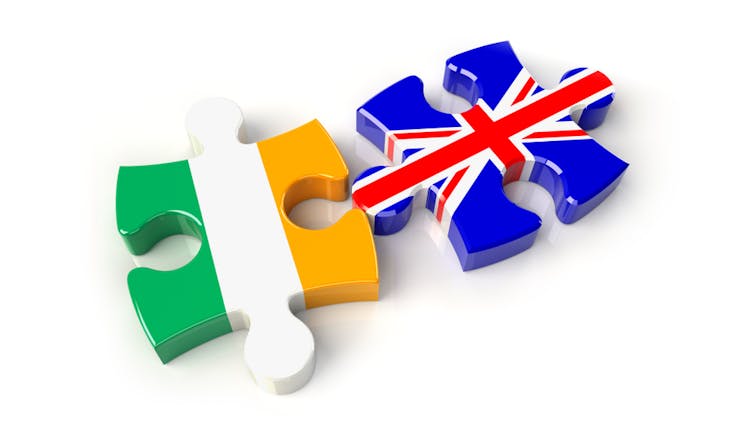
More work to do
Social security and pensions is just one area of rights related to the Common Travel Area, and other problems remain. Much is in the pipeline, but the UK and Ireland urgently need to finalise agreements across areas as diverse as security, health, and education.
The Common Travel Area and the rights associated with it reflect an important part of the two nations’ shared history, a reality that isn’t well served by multiple technical legal documents. One potential way to resolve this issue would be for Ireland and the UK to conclude a general framework agreement. This could restate their intention to treat UK and Irish nationals as equivalent to home citizens and to continue to use the Common Travel Area as the foundation of a close and co-operative relationship. Any relevant domestic law could be interpreted in light of these arrangements.
The recent MoU is a recognition that the two governments can be proactive in smoothing administrative bumps, even if the wider Brexit debate frequently presents them as being at loggerheads. But much more needs to be agreed before there can be any collective sigh of relief. The UK and Ireland might have decided who gets the Guinea pig in the divorce, but there’s still the matters of the kids, house and car.
- Social security
- Northern Ireland
- Republic of Ireland
- Free movement

Program Manager, Teaching & Learning Initiatives

Lecturer/Senior Lecturer, Earth System Science (School of Science)

Sydney Horizon Educators (Identified)

Deputy Social Media Producer

Associate Professor, Occupational Therapy

Scotland or Ireland: Which Country Should You Visit?
Last Updated on November 21, 2023
by Maggie Turansky
Disclaimer: This article contains affiliate links. That means if you click a link and make a purchase, we may make a small commission. As an Amazon Associate we earn from qualifying purchases. For more information, see our privacy policy.

There are few countries throughout the world that inspire so much awe and splendour than Scotland or Ireland. They both boast incredible expanses of green scenery, beautiful nature, rugged coastlines, ancient archaeological sites, and famously friendly locals.
However, they are two distinct places with cultures and traditions all their own. Therefore, if you only have time to visit one of these amazing countries, it can be difficult to choose between Scotland and Ireland.
Both countries have innumerable things to offer travellers and one could easily spend months and months wandering around both of them. But which is the right destination for you?
In general, choose Scotland if you want countless archaeological sites, myriad islands to explore and a well-established walking and camping culture. On the other hand, choose Ireland if you’re interested in great food, recent history and bucolic landscapes.
This article will outline the pros and cons of visiting Ireland and Scotland including things like affordability, activities, and attractions in order to help you pick the best country for your particular travel style.
Table of Contents
Scotland has become more and more popular each year, drawing tourists with its outstanding culture in cities like Edinburgh, mythical natural sites like Loch Ness , rugged islands like Skye and Orkney, and one of the best road trips in the world in the form of the North Coast 500 .
This beautiful country has so much to offer travellers of all kinds and, despite its relatively small size and population, keeps drawing people back year after year.

Accessibility
One of the first things you need to consider when attempting to choose between Ireland and Scotland is how accessible the destination is. Luckily for travellers, Scotland is an incredibly easy nation to get to and a fairly straightforward one to get around.
The largest airport in Scotland is located in its capital of Edinburgh. It serves countless destinations internationally and it makes an easy and convenient starting point for a Scotland trip . There are also smaller airports in Glasgow, Aberdeen and Inverness that have connections across the UK and continental Europe.
The major cities in Scotland are all well-connected within the UK’s extensive bus and train network, with frequent connections between London and the larger cities of Edinburgh, Glasgow , and Inverness.
It is also a fantastic option to begin your Scotland trip in London and explore the thriving capital city before catching one of the most scenic train rides in the world up north. Just make sure to book it in advance if you want to get a cheaper fare!
If your time frame or Scottish travel budget doesn’t allow for a long-distance train journey through the British countryside, there are airports in all of the bigger cities in Scotland that offer affordable flights from across the UK and the rest of Europe.
When it comes to getting around Scotland, this is where the beautiful country might get marked down a few points. Outside of the city centres in places like Edinburgh and Glasgow , it can be fairly tricky to get around if you’re planning on relying solely on public transport.
As Scotland is the most sparsely populated country in the UK, bus and train links aren’t nearly as developed or frequent as they are in England and, if you want to get off the beaten path even a little bit, the easiest way by far to do this is to rent a car .
If you can’t rent a car and still want to see the incredible scenery and highlights of Scotland, it is very possible to book a day or multi-day tour of more rural areas that are difficult to reach without a personal vehicle.

Affordability
It may come as no surprise that, due to its location in the UK, Scotland isn’t easily considered a budget destination. However, it is possible to visit Scotland and not leave having to take out a second mortgage on your home. Meaning, Scotland doesn’t have to be an expensive destination.
While there are certainly ample opportunities throughout Scotland that will have you spending all of your hard-earned cash in one fell swoop, there are just as many chances to save your money and still have an amazing experience.
For instance, if you have a sense of adventure and love the great outdoors, it is perfectly legal to wild camp most everywhere in Scotland.
If you travel with your own tent, you can sleep for free and seriously offset any accommodation costs you may have otherwise accrued. There are also plenty of amazing private rentals you can rent like this stunning cottage on Skye!
Also, while the price of meals in restaurants might be fairly expensive, grocery prices aren’t that steep and it can help save money to cook your own meals.
Another wonderful thing about Scotland is that most attractions that require entry fees (and very few actually do) rarely cost more than about £10-15. Most museums in the bigger cities are also free to enter, as they are in the majority of the UK.
All in all, Scotland can be quite affordable to visit if you do some research into your travel costs in advance and spend your money wisely.

Things to Do
Though small in size, Scotland is a gorgeous country with an incredible array of wonderful things to do. In cities, there are ample cultural events and fascinating museums with which to occupy your time.
Throughout both cities and the countryside, there are hundreds of whisky distilleries making some of the finest single-malt whisky in the world, most of which are available for tours and tastings.
The countryside is packed with walking routes and outdoor sporting opportunities. You can do anything from an easy day hike to a weeks-long trek through the Scottish wilderness in this beautiful country.
Read More: Dublin or Edinburgh: Which City to Visit?
The natural scenery in this country is incredibly beautiful and diverse and in one day, you can be scaling up Ben Nevis before seeing dolphins frolicking in the waters off the coast of Ullapool.
There are subarctic plateaus that have a completely different ecosystem to anywhere else in the British Isles and there are beautiful white sand beaches that will make you feel as if you’re in the tropics. Scotland’s nature truly cannot be beaten.
Both Scotland’s mainland and thousands of offshore islands are home to ancient and historical sites that range from grand medieval castles to majestic standing stones. Gazing upon such sites can make one feel incredibly small and truly make you appreciate just how old Scotland is.
There are so many things to do in Scotland in so many different corners of this amazing country that travellers could easily spend months on end exploring the country and still leave longing to see more. The interesting sites, breathtaking nature, and incredibly friendly people will leave you always coming back for more.
So, if you’re trying to decide whether to visit Scotland or Ireland, those are just some of the merits of the former.

Ireland is a country that continually inspires awe in those wishing to visit and the Emerald Isle has a lot to offer visitors. Much like its neighbour, Ireland is blessed with some of the most beautiful, pastoral scenery in the region and has one of the best and most renowned pub cultures in the world.
Littered with an amazing, long history, fascinating sites and nature, and some of the most friendly and helpful locals in the world, deciding whether to visit Ireland or Scotland can become an incredibly tricky choice.

The Republic of Ireland is quite a small country, both in population and in land area, and it is likely that you will fly into the capital of Dublin, which is the highest-traffic airport in the country.
Dublin airport is massive and has many flight connections to many destinations in North America and Europe. It is also conveniently located not far from the city centre so it isn’t difficult to access if you are planning on visiting the city without a car.
There are a few other airports throughout the country that you can access from airports across Europe and the UK and even the US, but it is unlikely that you will fly into one of them if you are arriving to Ireland from outside of this geographic area.
Once in Ireland, you will find it to be similar to Scotland insofar as that it can be difficult to get around if you don’t have your own personal vehicle outside of the bigger cities. In city centres like Dublin , Cork , and Galway , it is quite easy to get around by foot and if you’re only planning on visiting these cities on your Ireland itinerary , then it can be possible to go on the trip without a car.
However, if you want to get to more rural areas or are interested in stepping slightly off the beaten path, then renting a car is often your best option .
If you don’t drive or otherwise can’t rent a car, there are a number of tours available , like in Scotland, that will allow you to visit sites that are hard to reach by public transport. These typically leave from major cities like Dublin or Galway and can last for one day or multiple days.

Now that we’ve covered the accessibility of Ireland, it is time to cover, briefly, how much an Ireland trip will cost . Much like Scotland, Ireland has a reputation as being an expensive country and, depending on where you visit, this very well might be the case.
Dublin, for instance, is one of the most expensive cities in Europe and everything from accommodation costs to food costs to beer costs can seem wildly inflated. Varying activities in the Irish capital can come with an expensive price tag and there are times where it might seem that it is impossible to visit this iconic city on a budget.
If you are savvy about where you spend your money, however, you will find that you can make it stretch further than you might think. In Dublin, for instance, opt for a free walking tour rather than a paid one (do remember to tip your guide, though!). Don’t go out drinking in the Temple Bar district, where the price of a pint can exceed €8.
Everywhere in both the Republic and Northern Ireland, keep an eye out for state-run museums, which, like in Scotland, are often free. Not only will you certainly gain a better appreciation and understanding of the many fascinating aspects of Irish history, but you will also save yourself some money.
As for accommodation, opt for a private one like this restored barn in Connemara , a bed in a locally run B&B, or even a plot on a campground. Wild camping is not legal in Ireland like it is in Scotland, however, you can still find many ways to save on your accommodation costs.

If you’re weighing in on the things to do in each country, your choice might not become easier when you realise just how much there is to do in Ireland.
While the diversity of the natural scenery might not be quite as stunning around every corner in Ireland, there is still no denying that it is absolutely gorgeous.
Planning a trip to Ireland with the sole goal of spending as much time outside in the country as possible is very much worth it. The rolling green hills, the bucolic farms, and the rugged coastline are all the perfect draws to this beautiful and wild country.
Despite its diminutive population, there are numerous fun and dynamic cities to explore in Ireland as well. Dublin might take the cake when it comes to size and renown, however, cities like Cork are considered to be the gastronomic heart of Ireland and historic Galway just begs itself to be explored.
When it comes to natural sites, you can’t beat the beauty of the Cliffs of Moher , Achill Island , the Burren, or the impeccable Connemara peninsula. Ireland’s entire Wild Atlantic Way along the country’s west coast draws some of the most breathtaking scenery in the country and is considered to be one of the best road trips in the world.
In Northern Ireland , you have gritty and historic cities like Belfast and Derry to explore. Not only that but the incredible Antrim Coast and the inimitable Giant’s Causeway are unmissable attractions.
If you’re interested in hikes and walks, there is no shortage of amazing trails of various lengths you could go on. Though there aren’t the plentiful mountains that you will find in Scotland, Ireland’s countryside boasts its own unique beauty of rolling hills and daring cliffsides.
Irish history spans millennia and, just like in Scotland, you can see ancient sites and centuries-old churches and imposing castles and manors scattered throughout the Emerald Isle. There are also myriad museums in almost every settlement that will allow you to learn more about the history of this small but mighty nation.
Ireland is a country that is firmly cemented on the tourist trail for a reason: there are seemingly infinite things to do in such a small island nation.

Scotland vs Ireland: The Verdict
So should you visit Scotland or Ireland? Sometimes, it can seem as if there isn’t much difference between and it can be incredibly difficult to choose between the two. If you only have time to visit one, here is what we suggest.
If you’re interested in seeing the most diverse natural scenery in the shortest time span, choose Scotland. While Ireland’s nature is incredibly beautiful, Scotland’s is just slightly more stunning and more varied. As mentioned earlier, you can be at the top of the tallest peak in Britain in the morning and enjoying the seaside on a remote island off the coast by the evening.
Scotland might also be the best choice for you if you’re interested in ancient archaeological sites. Areas like the Orkney Islands and the Isle of Lewis and Harris are filled with standing stones and Neolithic villages, tombs, and burial grounds.
Scotland can also be the more affordable of the two, especially if are willing to wild camp. The amount of money that can be saved on accommodation just from that small aspect is enough to make many people choose to visit Scotland over Ireland. However, beyond this, there isn’t much of a price difference between the two countries.
However, if you’re choosing between the two and consider yourself a foodie, then Ireland might be the better choice for you. There is a high concentration of Michelin-starred restaurants throughout the country, the local produce is amazing, and there has been a very cool food scene happening in Ireland in recent years.
Inventive chefs reimaging the local cuisine might well be the best thing that has ever happened to the Irish gastronomic scene. Even in the smallest of villages, you can find exciting and fantastic gastropubs which are excellent eateries with incredibly high quality. The same doesn’t exist to the same degree in Scotland.
If you’re more interested in recent history, then Ireland might also be the better option. While there is a long and fascinating ancient history in the country, you can also learn about Ireland’s fight for independence in the not-so-distant past. If you happen to visit Northern Ireland, it is also worth educating yourself about the Troubles and the conflict that wasn’t fully resolved until fairly recently.

All in all, it can be a tough choice to find out if it is better to visit Ireland or Scotland. Both countries are worth visiting and spending time in their own rights and have a lot to offer travellers. It depends on your travel style and preferences to figure out which country is right for you.
Are you struggling to decide between visiting these countries? Have any questions? Let us know in the comments!

Related Posts:

9 Best Stops on the Dingle Peninsula Drive

9 Things To Do In Oban: A One-Day Itinerary

Ring of Kerry or Dingle Peninsula: Which Irish Drive is for You?

About Maggie Turansky
Maggie is a co-founder and writer for The World Was Here First. Originally from the US, she has lived in five different countries and has travelled to dozens more, both solo and with her partner, Michael. She particularly loves exploring Spain and spending time in the Caucasus and the Baltics. Read more about Maggie
Hi, Am planning to visit Scotland 1st week of Sep 2022, i need few details like which one is better renting a car or using public transport. 1. Can you suggest some cheapest & good car renting sites or company in Scotland 2. Can i able to drive the car with valid Indian driving licence 3. Any suggestions for accommodtion for 2 budgeted one.
As a regalar visitor to both (at least 4 times to both each a year), I can assure you, if you’re looking for richer culture, more diversity, slightly cheaper, much friendlier people, better food, a much richer Gaelic culture, etc., Ireland is your man.
Hi , I am planning for a 11 days trip to London – Ireland – Scotland . Can u help me out with a perfect iteinary . This is in last week of September. My plan is 4 days in London , 3 days in Ireland and 4 days in Scotland . Or do u suggest me skipping Ireland and doing only London and Scotland ? Will be travelling with my wife , my 9 year old son and 4 year old daughter.
With the time you have, I think it would be best to plan to only visit London and Scotland rather than heading to Ireland as well. You can find some inspiration and route ideas in this article: https://www.theworldwasherefirst.com/london-scotland-ireland-itinerary/
I’m planning to go UK around July 2022, duration is about 2-3 weeks, plan to start our trip at London (followed by Wales and Lake district), hesitating to go Scotland and/or Ireland. Our preference is nature scenery and pretty countryside small town. Do you think if 3 weeks for England + Scotland + Ireland is too tight? If yes, would you recommend Scotland or Ireland given our preference.
It’s really hard to choose between visiting Scotland or Ireland, especially as both countries offer what you’re after. I will say that, because you’ll already be in England ad Wales, you may want to consider Scotland over Ireland, just because it avoids having to take a flight or ferry. If you want our itinerary for England, Scotland and Ireland, you can find it here: https://www.theworldwasherefirst.com/london-scotland-ireland-itinerary/
We are planning a trip to Scotland late June through early July 2022. There will be 6 of us. I love the idea of starting the trip in London and taking the train to Edinburgh. I have a few questions if you would be so kind to give some advice. I am overwhelmed and have never planned a trip like this:)
What would be your must do’s in London if we only have a day or two there?
Is the train route a scenic one?
We really want to spend a day or two at lake Skye. What is the best approach for this from Edinburgh?
Do you think that having a home base at an airbnb in Edinburgh is possible to still see and do lots of things? We do not plan on having a car because there are 6 of us and they look to be very expensive.
Any advice you can give would be so appreciated. I am open to all suggestions:)
Hi Shayna, thanks for your comment. We have a detailed London itinerary that I’m sure can help you plan your time there: https://www.theworldwasherefirst.com/days-in-london-itinerary/ The train route from London to Edinburgh is incredibly scenic and I’m sure you and your group will enjoy it. We also have a Skye itinerary that should help you figure out what to do there: https://www.theworldwasherefirst.com/isle-of-skye-itinerary/ Edinburgh can make an incredible base in Scotland and there are lots of day trip options, even if you don’t have a car. You can find a lot more information about all of your options in our Scotland travel guide here: https://www.theworldwasherefirst.com/scotland-travel-guide/ Hope you’re able to plan a great trip!
I’ve lived in, and travelled through both extensively over the years.
Ireland edges it in the fun-stakes, and the interactions with people. Don’t agree with Scotland edging it regarding scenic beauty either, but it is a very beautiful country.
Thanks for your insight, Senen!
I know this article was posted some time ago, but we are really struggling with our choice and need some advice. Our plan is to go next July. My daughter and her boyfriend will be 21 and my son will be 18 and we just want them to have a good trip. My daughter would like to experience small town culture, beautiful landscapes, and maybe the odd castle. Her boyfriend likes “rocks and trees” and has never seen the ocean. My son just wants to drink beer and is quite uninterested in beautiful scenery. Lol. Please advise.
Hi Cathy – it seems like both Scotland and Ireland would suit for what you’re after, but maybe Ireland would tip the scale? Especially if your son wants to spend time drinking beer I see no better place than the home of Guinness! Beautiful landscapes, seaside scenery and the odd castle abound in both so you really cannot go wrong with either choice 🙂
Hi Maggie, Thanks for your great article. I mainly want to hike and walk in beautiful areas. I was considering basing myself in Galway and then using a car service or renting a car to get to more remote places. If I wanted to bypass big cities (Edinburgh), where would you suggesting a base location in Scotland? Thanks again.
Hi Carol, Inverness sounds like it would be a good option for you. It’s a small, quiet city with easy access to countless natural areas and historic sites. I’d recommend hiring a car here, as well. Hope this helps and you’re able to plan a great trip!
Having been to both… But then I was only 12 at the time… I was also at the whim of guided tours or my parents as they were the ones driving and paying for it all… My experience is somewhat limited. However I did enjoy Scotland more… With the exception of the blarney castle. Kissing the stone was on the bucket list for my life ever since I learned about it in a cartoon as a child. However, Scotland does have some amazing and breathtaking views! I also remember Scotland being hilly and green… Which is a big difference from England which is mostly flat in the south (I lived in England for three years near Cambridge) I also vaguely remember visiting Waterford, Ireland and being bombarded by a lot of pollution in the air. No Bueno!
So besides kissing that stone, Scotland was my favorite of the two!
Thanks for your insights, Laura! Glad to hear you had a great time in both 🙂
Scotland is amazing! I did a ten day trip without a car. Admittedly, this does limit you, but with buses running to smaller towns, it can be done. Don’t overlook Glasgow. It it wonderful and the neighborhood pubs with their impromptu “sessions” by local musicians were the best evenings in my life! No thing everyone should take the time to get to the Isle of Iona. The ferry leaves from Oban on the mainland (and site of my favorite scotch), a bus travels across the Isle of Mull and a short ferry on to Iona — paradise! The water looks like the Caribbean, as the Gulf Stream travels all the way there before turning south. It’s just a maniacal place. Iona still has a working monastic community. Originally founded by St Columba, it now is a coed, interdenominational community. Can’t wait to go back. Definitely do not go in the Spring, a total rain fest, but it was still incredible!
Happy to hear you had such a wonderful time in Scotland, Troy! Agree that it is an absolutely beautiful country to visit 🙂
It’s true that Scotland is the more beautiful of the two, but I had such a good time in Ireland that it’s impossible for me to recommend one over the other. I guess it didn’t help that two of the three days I spent in the Isle of Skye it was so foggy I couldn’t see anything. I will say that both Edinburgh and Glasgow were more interesting to me than Dublin. But Ireland is very enchanting. If you’re agonizing over which place to visit, don’t. You can’t go wrong with either choice.
It’s so true, Eric! There really isn’t a bad choice between the two 🙂
My husband and I have been married for 40 years and we have always talked about going to Scotland as his ancestry is Scottish. We have no idea where to start. Would it be best to go with a travel guide? Guided tour group? Also, what time of the year (temperature wise) would the best time to go. We live in the Midwest where our seasons are beautiful and change gradually. We may get very frigid temps in Winter but don’t usually last and it’s not consistent from year to year. Like, today, November 7, the weather was beautiful and we went hiking in short sleeve t-shirts as the temp was 72. However I’ve seen it snow on Halloween. I just want to be prepared for whatever weather we may experience.
Thanks for your comment, Sherry! I get that it can be overwhelming to begin planning a trip. If you’re looking for some more information, I recommend browsing through our Scotland travel guide ( https://www.theworldwasherefirst.com/scotland-travel-guide/ ) where you should find answers to all of the questions you’ve asked! Hope you’re able to plan a fantastic trip 🙂
Loved reading these comments. I am a Scot with strong Irish ancestry. Both countries are beautiful. Having been all over both countries, the place I love the most is Scotland. Even my jaw dropped on the road from Fort William to the Isle of Skye – (Loch / Glen Garry) simply stunning. However, ultimately you will love both countires – Fàilte gu Alba ??????? & Céad Míle Fáilte ?? ?
Hi Maggie, Looking at a Aug / September 2020 visit to Scotland / Ireland. Tossing up whether to do 4 weeks (two weeks in each) or 2 1/2 weeks in Scotland / few days in Great Britain then pick up Ireland another time. Would be interested in your thoughts. Cheers Mark
Hi Mark, if you think that you’ll be back in the region again, then I would recommend spending all of your time in Scotland this time around. There is so much to see and do that if you have it, it is better to dedicate more time to one place. Hope you have a great time whatever your decision!
Great thank Maggie appreciate your response…..and really appreciate the effort you go to in providing information to many.
We have been debating Ireland vs Scotland for our family of 5 (kids 13,11,9). We went to Iceland in summer ‘18 and the kids really enjoyed. My husband said some of what we saw in Iceland reminded him of Scotland (he spent a semester in Scotland). What do you think would be better for a family that enjoys being out in nature (though not into long hard hikes) vs being in metro areas (London last spring break was a good trip but kids liked Iceland better) Thanks J
Thanks for your comment, Jean! Personally, if you want to spend a lot of time out in nature and enjoy some dramatic scenery, then I would recommend visiting Scotland. Ireland is certainly incredibly beautiful, however, I just find that Scotland has more surprises and more absolute jaw-dropping scenery. I don’t think you can go wrong with either choice, though! Have a great trip 🙂
We are trying to decide between touring Scotland or Ireland for the last week of March. We would like to mix outdoor activities, museums, history, shopping, and eating (not in that order 🙂 Our dates are fixed and we are wondering if the weather in late March would be more conducive to one country or the other. We are also wondering if tourist sites and amenities are closed or have reduced hours prior to April. Thank you, Jay
Hi Jay, thanks for your comment! As weather goes, you’ll temperatures between Ireland and Scotland to be more or less the same at that time of year, however, it can get colder in Scotland if you’re farther north. I don’t think you should be impacted with tourist attraction closures or reduced hours then, either. It’s the time year when people begin to travel and most places are open for business as usual.
First of all thank you so much for this! Super helpful! We’ve been debating between Ireland and Scotland for a while. Would love to do both unfortunately we don’t have the time to spend. Thanks to your article we decided to visit Scotland first. Planning on a 4 day trip in October. About to read through your other articles! If you’d have a four day trip to pack in history, nature and if you had a car what would be the must see places? We would love any recommendations.
Thank you! Laura
Thanks for your comment, Laura! If you only have four days to spend in Scotland, I would recommend basing yourself in either Edinburgh or Inverness (depending on your interests) and doing day trips from there — it will be a lot easier if you have a car, as well. If you want some more inspiration for your trip, you can have a look at all of our Scotland content to help you plan: https://www.theworldwasherefirst.com/tag/scotland/
We are in the very beginning stages of planning our trip to England, Ireland and Scotland. You mentioned Airbnb in your article. What are your thoughts on the safety of Airbnb over there? We are Airbnb hosts here in the US, but I was a little bit nervous about trying to use the service abroad.
Hi Lisa, there is really no difference between using Airbnb in the UK & Ireland vs using it in the US. We’ve used it all over the world and we used to host Airbnb in our flat in London and have never had a safety issue. Also, the UK & Ireland are also statistically much safer in general than the US, as well. Hope you have a great trip!
Having been to both, hands-down do Scotland. Ireland is pretty and there are many things you can go see, but Scotland has the “charm”.
Also, don’t be put off by the “Troubles” of Northern Ireland. It’s extremely safe (at least as safe as Ireland) and very easy to get around. The history in Belfast is amazing. We enjoyed Ireland, but don’t have any compelling reason to go back and explore more. The food was great and the people were very friendly.
(We flew to Belfast, AirBnB in Belfast, rented a car. Drove to Kilkenny and Waterford, then Dublin (AirBnB). 10 days total as part of a larger itinerary. If you visit Ireland, the Waterford Crystal factory is a must see).
Thanks for sharing, Dan!
Hi Maggie! Thanks for your article! I’ve been wanting to go to Ireland since I saw the movie Leap year, and moreso Scotland since I saw Half Light, P.S. I love you, and most current, Outlander (need I say why), LOL!!! I only have 13 days to split between the two, as I admittingly NEED to make a couple stops in my beloved Italy to visit friends and family- this is a must I cannot ignore, therefore I am cutting my time in the former two by five days- I know, crazy! But I’m Italian by decent and you know how the saying goes, “blood is thicker than water.” I did see that from Dublin there is an option called “Open Road” ticket, which is a hop on- hop off bus with unlimited travel for three days, for I believe around 60 Euros, that goes along the ancient east part of Ireland (or the west/ atlantic side), which has stops in must-see places like Newgrange, Wicklow Gaol (the scary place), and Trim Castle, just to name a few. I’m thinking this is definitely an option, since renting a car can bring on extra insurance, gas and parking expenses and headaches, I’m sure. Aside from those three days, I’m thinking about visiting a friend who lives in Dublin and wing it for just a couple nights, and then stay eight nights- I just might take your advice and rough it in a tent for maybe the first two nights? I’m going to definintely consider it. What are your thoughts on my planning ideas??? Thanks again!
Hi Marina, thanks for your comment! Sounds like you’re planning a great trip. One thing that is worth mentioning is that Ireland doesn’t legally allow wild camping — it is only Scotland where it is legal. In Ireland, you will need to be at a campsite if you want to camp. Hope you have a fantastic time!
I’m planning a two week trip to either Ireland or Scotland or both. The group of family and friends consists mostly of seniors so we probably won’t be doing much hiking, just sightseeing. They are all depending on me to come through with an amazing adventure, so please help. A few questions: Can we rent cars in Ireland and return them in Scotland? Should we consider a bus tour or self drive to see more of the local fare? Is the Scottish Tattoo a must see? Thanks in advance.
Thanks for your comment, Darrell. Sounds like you’re putting together a great trip!
Hypothetically, you could hire a car in Ireland and return it in Scotland, but it is going to be very expensive when you factor in the different pick-up/drop-off locations and the high cost of the car ferry, as well. It would be far more cost-effective just to hire separate cars in Scotland and Ireland and fly between the two.
If you want to go more local, I would definitely recommend renting a car rather than going on a tour. You will have infinitely more flexibility if you are in full control of your own itinerary.
As for the Tattoo, I have never been so I cannot speak as to whether it is a “must-see,” however, it is an incredibly popular thing to see and tickets there are expensive. Prices in Edinburgh will also likely increase while it is going on, as well.
I’m planning to go next year and visit both. I’ve been to Scotland and want to go back to explore Glasgow and Skye. This will be my first time in Ireland I have Irish ancestry and want to explore that a bit more too! I know 12 days is a bit of a rush but I guess I can get a taste of both and see where I’d like to return. I’m also spending a few night in London. I think I’m going to rent a car in both and do day trips still planning so let’s see but the article was very helpful! My plan Dublin -rent a car day trip from Dublin -Belfast- do a day trip tour -fly Glasgow – rent a car for day trip- London- then home
Thanks for your comment, Mera! Sounds like you’ve got a good plan for your trip! 12 days might be rushed, but I think you have the right idea to find a base and do day trips — that will save you a lot of time instead of moving destinations every 2 or 3 days 🙂
Great article. We are doing a 10 day trip in May/June 2020 and have decided to split the two countries. We plan on flying into Cork and staying somewhere around Tipperary, Athlone or somewhere near the south-central part of the country. Keep ourselves around 1-1.5 hours from most of the sights. We aren’t going to try and do everything other than enjoy seeing the country.
We will follow up by flying from Cork to Glasgow and doing something similar there. I just have to finish planning the Scotland part of the trip.
Sounds like you have a great trip planned, Matt, and thanks for your kind words! I think you have the right idea to find a base and then explore from there, especially if you have limited time. For Scotland, I would suggest maybe staying in or near Inverness — this is a great base to explore some of the most beautiful spots of the Highlands 🙂
Hi! We are planning a 3 week trip to Scotland and Ireland in September but I am struggling with which one to fly into and out of. Would it be best to visit Ireland first or Scotland? I believe we will divide out time equally between the two countries. Any suggestions as to which airports to use? Thank you! Your help is very much appreciated!
Hi Barbara, it really doesn’t matter which airport you fly into if you’re planning on dividing your time equally between the two countries. Dublin serves as more of a hub and is much higher-traffic than any Scottish airport, but whichever airport is cheapest for you to fly in and out of should be sufficient. Hope you have a great trip!
Thanks for the Article about Ireland and Scotland!!!!!!!!!!!! Firstly it was interesting to see(from just my Google Search of ‘Ireland or Scotland!?’) and here from Articles like yours exactly how Similar the Two Places are. I had no idea of this and was in the belief that they were very different places because I have only spent time in Ireland Republic and North so was unaware of how similar it sounds like Scotland actually is to Ireland particularly when it comes to The Nature side of it.
Anyway I am still not entirely sure which one to visit both have Pro’s and Con’s, Ireland is Green and Lush however sounds like it could be a little more expensive mainly with regards to accommodation because it sounds like according to you Wild Camping is Illegal and therefore frowned upon and out of the question!!!!!!!!!! Which may be the deal breaker for me!!!!!!! Scotland sounds like it may be a cheaper Trip and maybe even more Beautiful than Ireland!!!!! Basically my Heart is saying Ireland(I also have Links/Roots in Ireland(I am Blood Wise Half Irish)) therefore feel like I have more reason to go there however have been before, my Head is saying Scotland though because overall I think it will be cheaper/more affordable as well as being at least equally Stunning if not more so than Ireland if your comments are anything to go by!!!!!!!!!! Thanks again!!!!!!!! BPR.
Thanks for sharing, Ben 🙂 Hope you have a great trip!
Thank you for the article. I am struggling with planning this trip, for two years now actually. I am beginning to plan a trip for 2020, likely August or September. Had hoped to visit both countries, and wonder if, in your opinion, they are doable in a 10-14 day span? Not hitting everything, but getting a great taste of each country this time around? Renting a car for sure, also travel with a parent whose mobility is slightly restrained (so no hikes unfortunately this time). Any recommendations are appreciated. Thinking Dublin as homebase and taking day trips, possibly an overnight in another town. Then heading to Scotland. Thank you for inspiring me to get back on the trip planning, I had been overwhelmed, but ready to dive in now.
Hi Patti, thanks for your comment! Personally, if you’re just looking to see the highlights of Scotland and Ireland and don’t plan to do any hiking, then I see no reason why you couldn’t visit both countries in about a 2-week span. My suggestion would be to base yourself in Dublin and Galway in Ireland and do day trips from these cities and then do the same in Edinburgh and Inverness in Scotland. I think this would give you a good overall taste of the countries (and leave a lot of room to plan future trips!). If you want some more help planning, we have an itinerary that might be helpful for you here: https://www.theworldwasherefirst.com/london-scotland-ireland-itinerary/ Hope this helps!
Thank you for this article. I am interested in visiting both, but only have time for one at present. I was thinking renting a vehicle and driving “off the beaten path”. I like that idea. My plan is to travel the second week of September. After reading your article, both areas sound aweinspiring, but I think I will travel to Scotland first. Any suggestions would be greatly appreciated.
Thanks for your comment, Peter! Great choice in picking Scotland — no matter how much I love Ireland, Scotland is a place that continues to draw me back. I hope you have an amazing time. If you want some help planning your trip, we have a bunch of Scotland content to get you started. You can check out our itinerary here: https://www.theworldwasherefirst.com/scotland-road-trip-itinerary/ and the rest of our Scotland archives here: https://www.theworldwasherefirst.com/tag/scotland/ And we’re always available to answer any more questions you might have 🙂
Leave a Comment Cancel reply
The Expatrist
Best For Living: The UK vs Ireland
Are you thinking of moving to the UK or Ireland? Both offer a high standard of living, excellent quality of life, and abundant work and career options. Here we cover all those details to help you make the right decision.
The UK is the better option for those interested in arts, culture, career and educational opportunities, and modern conveniences. Ireland is the better choice for those looking for a quieter and more laidback lifestyle that still offers many of the perks of the UK.
Of course, many factors determine the feasibility of living in a particular country. Read on to learn more about the lifestyles, job prospects, salaries, and cost of living in the UK and Ireland, along with other essential information.
Living in the UK vs Ireland: Main differences
Generally speaking, life in the UK is faster and more frenetic than in Ireland. It’s a much more urban and cosmopolitan country, with more of a “Big City” buzz and excitement.
Of course, things are much livelier in major Irish cities such as Dublin and Belfast. Even so, they are a far cry from most English towns in terms of art, music, culture, and career opportunities.
The UK is also more diverse than Ireland. Major urban centers such as London are radically different from smaller towns such as St. Ives in Cornwall, for example. Although this diversity is also apparent in Ireland, it isn’t as extreme as in the UK.
What are the reasons why you should not move to Ireland ?
Reasons Not To Move To Ireland You MUST Know
Brits vs Irish people
The Irish are generally considered to be warm and friendly, while the British are often regarded as ‘cold’ and ‘aloof.’ But this perception has changed over the years, with the UK becoming more and more like other European countries.
Banter is one thing that many Brits and Irish have in common. Called ‘ craic ’ in Ireland, it’s similar to the interaction between close friends in the UK.
One thing that many people will agree on is that the Irish generally love conversing. Although Brits have become more open and accommodating in recent years (possibly due to the influx of immigrants from other cultures), they aren’t nearly as chatty as the Irish tend to be.
Quality of life
The quality of life in Ireland is generally considered to be higher than in the UK. Again, this is an entirely subjective assessment, but it seems to be the prevailing sentiment among many people that have lived and worked in both countries.
In the United Nations’ ranking of 189 countries in 2020, Ireland was ranked second in terms of quality of life. In contrast, the UK ranked only 13 th . Factors contributing to these rankings were life expectancy, education, and gross national income per capita.
Of course, many other factors should be considered when assessing the quality of life in a particular country, one of which is public transportation. While Ireland beats out the UK in terms of life expectancy, education, and GNP, it lags behind in its transport services and infrastructure.
The score is pretty even as far as the weather is concerned. Both countries are known for their rainy and windy weather throughout the year, although summers have been increasingly warm. Even some the weather can be quite unpredictable, so take that into consideration when deciding to move to Ireland or the UK.
Cost of living
Interestingly, the cost of living in Ireland is significantly higher than in the UK. A study conducted by Provident Personal Credit in 2018 revealed that living in Ireland was about 13.97% costlier than in the UK. Rent is about 50% higher, and consumer goods and grocery products were significantly higher as well.
Rental prices are a significant factor in determining the cost of living in a particular place. But although rent is higher in Ireland than in the UK, purchase prices are lower. For about the same price as a home in the larger UK cities, you can get larger property in the Irish suburbs.
Furthermore, the higher incomes in Ireland make mortgages more affordable. This is a crucial factor when comparing the relative costs of living in both countries.
Why Are Houses so Expensive in the UK?
Here’s a look at some of the typical prices in Ireland and the UK:
How Much Is Rent in Ireland: Average Numbers
Visas and residence permits
Irish and British citizens can freely travel to and from either country by virtue of the Common Travel Area agreement. This also applies to Chinese and Indian nationals, who have been permitted to travel within these areas without a visa since 2014 and 2015, respectively.
Citizens of Europe countries, EEA states, and Switzerland can also enter Ireland without a visa. These individuals can stay in the country for up to three months, with the only requirement being a passport or a national identity card.
Citizens of all other countries should have a visit or holiday visa to enter Ireland. Visa holders are allowed to stay in the country for up to 90 days.
Non-EEA nationals will have it report to an immigration officer upon their arrival, whether or not they need a visa for entry. They should also provide supporting documents attesting to the nature of their visit.
Ireland also has a “ Short Stay Visa Waiver Program ”. This allows citizens of some Eastern European, Middle Eastern, and Asian countries to enter the country without a visa if they have a short-term UK visa.
Permanent residence in Ireland is granted to individuals who have legally lived in the country for five years. They may also apply for a permanent residence certificate if they wish, but this isn’t a legal requirement.
Visitors to the UK are granted a “ Standard Visitor Visa ,” which allows them to stay in the country for up to six months. However, the British embassy may shorten the time that visa holders are allowed to stay for any reason.
The Standard Visitor Visa can be used for the following purposes:
- To tour the country
- To visit family
- To obtain medical treatment
- To engage in professional functions
The visitor visa may also be subject to the following restrictions:
Anyone with a valid visa for at least five years may apply for permanent residency in the UK. This is also allowable for applicants who marry an English citizen. After being granted permanent residency, the individual can stay in the country indefinitely.
Certain jobs fall into the category of “skill shortages” in Ireland. These include jobs in the following sectors:
- Hospitality
- Engineering
- Transport and logistics
If you are qualified for jobs in these sectors, you have a higher chance of finding employment in Ireland. Furthermore, UK nationals have an equal chance of being employed as Irish nationals.
UK’s population is about 14 times higher than Ireland’s. Consequently, there are more jobs available and a higher chance of being employed.
That said, Ireland has its share of multinational firms, particularly in the IT sector. And in Dublin, employers generally offer higher salaries than their English counterparts.
On the other hand, Dublin‒where most of the jobs can be found – is a pretty expensive city. Single adults will need to earn at least 50,000 EUR per year to live comfortably.
For a family of four, an annual salary of 75,000 EUR would be more feasible. For this reason, many people who work in Dublin choose to live outside the city to keep costs down.
Of course, London is also expensive to live in. and although there are many more jobs available, living outside the city isn’t really feasible given the long commuting times.
Commuting to Dublin from the outskirts will take one to two hours at most. Commuting from one end of London to the other could easily take that long.
The average salary in the UK as of 2022 is about £29,600 per year or £1,950 per month.
In Ireland, annual salaries average €44,202 or €3,683 per month. The weekly average is €850. The minimum wage in the country is €10.50 per hour as of January 2022.
Here’s a look at typical salaries in the UK :
And typical salaries in Ireland :
Salaries in Ireland are considerably higher than in the UK. Of course, the cost of living is also significantly higher, because most services are owned and operated by private firms rather than the government. Food, rent, and mortgages are also generally more expensive.
Read more about salaries in Ireland in the dedicated article .
What Is Considered a Good Salary in Ireland? [2023 Guide]
Lifestyle
Ireland is decidedly more peaceful and laidback than the UK. That applies to pretty much any city in both countries, although life in Dublin and Belfast can be quite frenetic and fast-paced as well.
Pubs are an important facet of Irish and English cultures. Most social interactions revolve around these places, attracting people who are looking to unwind after a day at work or simply to enjoy their favorite beverages.
Check out this table to get an idea of the comparative lifestyles of both countries:
Ireland and the UK both have universal healthcare systems: HSE for Ireland and NHS for the UK. But although both are available to all the country’s residents and funded by the public, they are managed differently.
In the UK, residents have the advantage of an integrated healthcare system in the NHS at no cost, apart from prescriptions. In Ireland, on the other hand, the HSE works on a co-pay system that costs patients €40 to €80 per procedure.
UK patients can even stay in the hospital at no cost under the NHS. With HSE, Irish patients have to pay €80 per day. However, they will not have to pay more than €800 annually, even if they have to stay in the hospital for a year. Childbirth and other maternity services in Ireland are free.
Irish patients also have to pay €100 for emergency room visits if they are involved in an accident. This service is offered at no cost by the NHS.
The good news for Irish residents is that most medical costs can be charged to insurance. There are many providers in the country, including VHI, which is partly owned by the government.
Furthermore, insurance in Ireland is cheap compared to the UK. It is also easy to obtain and offers a comprehensive range of coverages. Plus, any medical costs that aren’t covered by insurance can be deducted against the individual’s taxes.
There are current initiatives to make HSE more of a truly universal healthcare system like the NHS. In particular, there is a growing movement to eliminate the co-pay system.
For expats, we recommend insurance from Cigna Global. They provide services worldwide, including the UK and Ireland.
Best cities to live
Finally, here’s a rundown of some of the best cities in the UK and Ireland and what makes them so special:
- One of the world’s major financial, educational, and cultural hubs
- Diverse communities
- Picturesque sights
- Vibrant entertainment and nightlife
- Plenty of excellent restaurants, pubs, and cafés
2. Manchester
- Many varied work opportunities
- High employment levels
- Relatively low cost of living
- Vibrant nightlife and culinary scene
- Many educational options
- Only 30 minutes from London by train
- Warm and friendly community
- Active nightlife
- Affordable housing options
- Flourishing IT industry
- Many employment opportunities
4. Southampton
- Budget-friendly accommodations
- Two highly-regarded universities
- An up-and-coming cultural center
- Active marine, retail, and hospitality industries
- Rich cultural and historical heritage
- Many employment and business opportunities
- Excellent transport system
- Easy access to the gorgeous English countryside
Ireland
- Big city conveniences
- Vibrant nightlife
- Picturesque suburbs
- Many excellent art galleries, theatres, and restaurants
2. Skerries
- Only 15 miles from Dublin
- A quaint and picturesque seaside town
- Beautiful homes
- Friendly people
- Many annual festivals
3. Malahide
- One of the more affluent communities in County Dublin
- Quiet and shady neighborhoods
- The east coast’s culinary center
- Many fine restaurants, bistros, and cafes
- Gorgeous beaches
Moving to Ireland and looking for a place with the best climate ? Check out this article .
4. Skibbereen
- Striking natural beauty
- Rich architectural and cultural heritage
- Many food and walking festivals throughout the year
- Rich and colorful history
- Quaint fishing town atmosphere
- Beautiful and picturesque location
- Plenty of opportunities for golfing, yachting, and fishing
- Fine art galleries, restaurants, and food festivals
Best Places To Live in Ireland with the Best Weather
Similar posts, how to move to ireland without a job: guide, having a dog in london: your complete guide, salaries for part-time jobs in the uk in 2023, moving to germany from the uk after brexit [2023].
Cookies on GOV.UK
We use some essential cookies to make this website work.
We’d like to set additional cookies to understand how you use GOV.UK, remember your settings and improve government services.
We also use cookies set by other sites to help us deliver content from their services.
You have accepted additional cookies. You can change your cookie settings at any time.
You have rejected additional cookies. You can change your cookie settings at any time.
- Entering and staying in the UK
Travelling to the UK from Ireland, Isle of Man, Guernsey or Jersey
Information for people travelling to the UK from Ireland, Jersey, Guernsey or the Isle of Man, and information for people passing through the UK on the way to Ireland, Jersey, Guernsey or the Isle of Man.
The Common Travel Area
The Common Travel Area (CTA) is made up of the UK, Ireland and the Crown Dependencies (Jersey, Guernsey and the Isle of Man).
For the UK, the CTA arrangements means that you won’t always go through UK immigration control when travelling to the UK from somewhere else in the CTA. This is different to when you come to the UK from outside of the CTA.
You will never go through immigration control at the land border between Ireland and Northern Ireland.
British and Irish citizens
Under the CTA arrangements , Irish citizens in the UK and British citizens in Ireland have the right to live, work, study, and access healthcare, social security and public services in each other’s countries without having to apply for permission.
Read more about what the CTA means for Irish citizens .
You don’t need to show your passport to a Border Force officer when travelling from Ireland to Great Britain. However, you may be asked to show a document that confirms your identity and nationality.
This could include:
- a valid passport or passport card (if you’re Irish)
- a copy of your passport or passport card with your identity and nationality clearly visible
- an expired passport or passport card, which Border Force are satisfied was issued to you originally
- evidence of having obtained British or Irish citizenship
This list is not exhaustive and other documents including providing more than one may be accepted. These are considered on a case by case basis by Border Force.
You will not pass through any immigration control when you enter the UK from Ireland across the land border, so you don’t need any documents to enter the UK on that route.
If you’re not a British or Irish citizen
There are different rules if you enter the UK from the CTA than if you enter the UK from a place outside the CTA. Usually, you don’t need to get permission to enter the UK if you are arriving from the CTA for a visit of up to 6 months.
However, there are exceptions to this. Some people need permission to enter the UK for a short visit wherever in the CTA they travel from. Other people only need permission if they’re travelling from Ireland.
If you enter the UK illegally from another part of the CTA, you may be removed from the UK.
People who need permission to enter the UK from anywhere within the CTA
For most people, there are different arrangements in place depending on whether you travel to the UK from Ireland or the Crown Dependencies .
You need to seek permission to enter the UK from anywhere in the CTA if:
- you are subject to a deportation order
- your exclusion has been deemed conducive to the public good
- you have previously been refused permission to enter the UK and haven’t, since the time you were refused permission, been granted permission to enter or remain in the UK or any of the Crown Dependencies
Travelling from Ireland to the UK
If you’re from an eea country or switzerland.
However, you may be asked to show your passport (which should be valid for the whole of your stay) or identity card to enter Great Britain when travelling from Ireland if you are encountered by Border Force.
You cannot use an EEA or Swiss national identity card to enter the UK, and can only use a valid passport, unless you:
- have settled or pre-settled status under the EU Settlement Scheme , or Jersey, Guernsey or the Isle of Man’s settlement schemes
- have an EU Settlement Scheme family permit, or the equivalent from Jersey, Guernsey or the Isle of Man
- have a Frontier Worker permit
- are an S2 Healthcare Visitor
- are a Swiss national and have a Service Provider from Switzerland visa
Irish citizens can use a passport card.
If you’re waiting for a decision on your application for settled or pre-settled status
You can still use your EEA or Swiss national identity card to enter the UK if all of the following are true:
- you’ve applied for settled or pre-settled status under the EU Settlement Scheme, or Jersey, Guernsey or the Isle of Man’s settlement schemes
- you’ve been issued with confirmation your application is valid
- you’re not applying as a joining family member
If you’re not from an EEA country or Switzerland
However, you may be asked by Border Force to show your passport, which should be valid for the whole of your stay, to enter Great Britain.
Permission to enter requirements
If you have permission to enter or remain in the UK (for example if you have a UK visa) you do not need further permission to enter the UK from Ireland.
You only need to get permission to enter the UK when arriving from Ireland if:
- you arrived in Ireland from outside of the CTA and did not obtain immigration permission to enter Ireland
- you’re a visa national who doesn’t have a valid UK visa, or a visa granted under the British-Irish Visa Scheme (BIVS)
- you entered Ireland unlawfully from outside the CTA
- you entered the UK or the Crown Dependencies unlawfully and went directly from there to Ireland
- your permission to enter or stay expired before you left the UK and since then you haven’t been given permission to enter or stay in the UK or any of the Crown Dependencies
- you are the subject of an international travel ban
- you were refused admission or subject to a removal decision under specific regulations - unless you were later given permission to enter or stay
In these situations, you must either apply for:
- a visa before you travel
- permission to enter from a Border Force (immigration) Officer at the UK border
You may not be able to get permission to enter the UK from a Border Force Officer if you enter the UK from the CTA. This is because there are usually no immigration controls on these journeys, and none on the land border between Ireland and Northern Ireland.
For more information on who needs permission to enter the UK from Ireland, see the guidance on arriving in the UK from within the CTA .
Use the check if you need a UK visa tool to find out if you need a visa and what type.
Visas issued by Ireland are not acceptable for travel to the UK except for visas issued under the British Irish Visa Scheme (BIVS) .
If you don’t need permission to enter the UK from Ireland
Some people automatically have permission to enter the UK when they arrive from Ireland. This permission is called ‘deemed leave’. You don’t need to apply for it. You won’t get a stamp in your passport showing deemed leave because you won’t necessarily meet a Border Force officer when travelling from Ireland to the UK.
You can enter on the basis of deemed leave when you either:
- enter Ireland from a country outside the CTA, and then travel on to the UK
- were in the UK with permission to stay for a limited time, went directly to Ireland and while you were in Ireland your permission expired, and you then came directly back to the UK
The length of time you can stay in the UK and the things you can do here on the basis of deemed leave are different depending on why you are entering the UK. If you don’t need to apply to enter the UK from Ireland, you can enter and stay in the UK on Article 4 deemed leave.
You can be in the UK for up to 6 months on your first visit from Ireland. This time starts from the date you entered the UK. You can prove the date you entered the UK by, for example, your ticket or boarding pass.
Your deemed leave ends when you leave the UK.
On following visits to the UK from Ireland, you can be in the UK for up to 2 months on the basis of deemed leave if you haven’t left the CTA since you were last in the UK.
You cannot do any paid or unpaid work if you’re in the UK on Article 4 deemed leave except for activities allowed under Appendix V: Visitor of the Immigration Rules .
If you want to come to the UK to do something that isn’t allowed under Article 4 deemed leave, you must apply for the relevant visa before you travel to the UK.
Use the check if you need a UK visa tool to find out which visa is right for what you want to do.
Other ways for non-visa nationals to enter the UK using deemed leave
You can also use deemed leave if you enter the UK from Ireland either:
- as an S2 healthcare visitor
- to do a permitted paid engagement
The rules of your deemed leave will be different depending on what you are coming to do.
Travelling to the UK for S2 healthcare treatment
S2 Healthcare Visitor arrangements apply to patients who applied before 11pm on 31 December 2020 to come to the UK for a course of planned healthcare treatment under the ‘S2 healthcare route’.
These arrangements also cover people who come with or join S2 Healthcare patients to support or care for them during their treatment.
See more information on S2 Healthcare Visitors including the documents you need .
If none of the exemptions apply to you and you enter the UK from Ireland with a valid S2 certificate you can enter and stay in the UK under Article 5 deemed leave. This is also true for anybody accompanying or joining you to provide care or support.
Under Article 5 deemed leave, you have permission to enter for 6 months, starting from the date you enter the UK from Ireland. You can prove this date, for example, with your travel ticket or boarding pass. This deemed leave ends when you leave the UK.
You cannot do any paid or unpaid work.
You can apply for permission to stay in the UK for another 6 months if treatment needs to continue. There’s no limit to the number of 6 month extensions you and your accompanying person can apply for, as long as you continue to meet the eligibility requirements.
If you go from the UK to Ireland and then back to the UK without having left the CTA, you’ll automatically be able to stay in the UK for up to 6 months if you still have a valid S2 healthcare certificate. This permission will start from the date you return to the UK.
Irish citizens in the UK automatically have rights to enter and stay in the UK and don’t need deemed leave for healthcare purposes (except in a rare circumstances).
If you’re a visa national you must hold a visa issued under the S2 Healthcare Visitor route in the Immigration Rules before you get to the UK, including from Ireland.
See more information on the S2 Healthcare Visitor route .
Travelling to the UK for permitted paid engagements
If you are coming to the UK for a permitted paid engagement from Ireland, you can stay in the UK on the basis of Article 6 deemed leave for up to one month.
Your deemed leave starts from the date you first enter the UK from Ireland. You can prove this date, for example, with your travel ticket or boarding pass. This deemed leave ends when you leave the UK.
On further visits to the UK you can only stay for up to 7 days on the basis of Article 6 deemed leave on each visit from Ireland, as long as you haven’t left the CTA in between visits to the UK.
If you want to use the longer deemed leave period given by Article 4 then you must first leave the CTA. You cannot switch between Article 4 and Article 6 deemed leave while still in the CTA.
You can do a different permitted paid engagement activity each time you visit the UK.
Your permitted paid engagement must:
- have been arranged before you travel to the UK
- be evidenced by a formal invitation
- relate to your area of expertise and occupation overseas
Travelling to the UK through Ireland under the Creative Worker visa concession
If you are travelling to the UK through Ireland under the Creative Worker visa concession you must apply for remote clearance at least 72 hours before you arrive in the UK.
Travelling between the Crown Dependencies and the UK
You don’t need a passport when travelling from the Crown Dependencies to the UK. However, you may need to show a Border Force officer document confirming your identity.
- a copy of your passport or passport card with your identity clearly visible
- a driving licence
- an armed forces identity card
This list is not exhaustive and other proof may be accepted. This will be considered on a case by case basis by Border Force.
You may also need to show that you have permission to enter the UK such as:
- a biometric residence permit
- proof of your digital status (or eVisa)
- a vignette in your passport
- confirmation of immigration permission from one of the Crown Dependencies
This list is not exhaustive and you may be able to confirm you have permission to enter the UK in another way. Your circumstances will be considered on a case by case basis by Border Force.
If you get permission to enter or stay in the UK, that permission and any conditions attached to it also apply in the Isle of Man, Guernsey and Jersey (the Crown Dependencies). The same is true if the Crown Dependencies give you permission to enter or stay and you then travel to the UK.
You only need one UK visa if you plan to travel directly to the UK or any of the Crown Dependencies, or stop in any one of those places on the way to another.
Submit and pay for visa applications for permission to enter the Crown Dependencies in the same way as for the UK.
Travelling through the UK on your way to another part of the CTA
Even if you only enter the UK as part of your journey to Ireland or the Crown Dependencies you must still follow the UK’s immigration laws while you’re in the UK .
You must follow the immigration laws of whichever part of the CTA that you are in at the time. This includes visa requirements, restrictions on employment and length of stay.
Travelling to Ireland from the UK
Check travel advice for Ireland .
Added link to advice on travel to Ireland.
Updated section on 'Travelling to the UK through Ireland under the Creative Worker visa concession' to reflect that this concession is no longer available to sporting workers.
Updated information on use of ID cards to enter the UK if you're an EU, EEA or Swiss citizen.
Updated information for Irish citizens travelling to the UK from Ireland or the Crown Dependencies.
First published.
Related content
Is this page useful.
- Yes this page is useful
- No this page is not useful
Help us improve GOV.UK
Don’t include personal or financial information like your National Insurance number or credit card details.
To help us improve GOV.UK, we’d like to know more about your visit today. We’ll send you a link to a feedback form. It will take only 2 minutes to fill in. Don’t worry we won’t send you spam or share your email address with anyone.

25,000+ students realised their study abroad dream with us. Take the first step today
Meet top uk universities from the comfort of your home, here’s your new year gift, one app for all your, study abroad needs, start your journey, track your progress, grow with the community and so much more.

Verification Code
An OTP has been sent to your registered mobile no. Please verify

Thanks for your comment !
Our team will review it before it's shown to our readers.

- Study Abroad /
UK vs Ireland: Which is a Better Study-Abroad Destination in 2024?
- Updated on
- Dec 18, 2023

The United Kingdom and Ireland are frequently chosen as study destinations by international students worldwide. These countries have a reputation for offering world-class education and extensive employment opportunities. Both nations boast high-ranked universities and great living conditions. This creates confusion among students about whether they should study in the UK or Ireland as both are excellent study-abroad destinations . Keep reading this blog if you are also baffled about which option is better. We will clear all your doubts regarding the UK vs Ireland. We will compare these two countries and towards the end of this blog, we will conclude which one is a better study-abroad destination.
Each section in this blog will discuss an aspect of these countries. The one which is better in a particular aspect will be awarded +2 points. We will add these points and finally conclude at the end which country is better based on the total computed score. The nation with the highest score will win this UK vs Ireland contest.
This Blog Includes:
Top-ranked universities: uk vs ireland, admission requirements, tuition fees, living expenses, work permit and pr, average salaries: uk vs ireland, other major elements.
A good university plays a key role in shaping your career. Hence, one should choose their institute wisely. We have given below some of the most prominent universities in the UK and Ireland to help you make the selection. At the end of this section, we will assess which country has better universities.
Universities in the UK
Here are some of the most prestigious universities in the UK:
Universities in Ireland
The table below provides a list of the top universities in Ireland :
Which Country is Better?
It is apparent from the above comparison that the UK houses higher-ranked universities when compared to Ireland. Hence, we will award +2 points to the UK in this round of the UK vs Ireland.
Also Read: The Cheapest University in Edinburgh For You to Consider if You Are on a Budget
One should carefully understand the admission requirements when choosing their study-abroad destination. Hence, we will discuss in detail the criteria for admission in the UK and Ireland.
Admission Requirements For the UK
Here are the entry requirements for the UK universities:
- Students need to have an IELTS score of 6.5, a PTE score of 54+, a TOEFL score of 70-100, and a Duolingo score of 105-120.
- Applicants have to submit the following documents:
- Academic transcripts
- A valid passport
- Statement of Purpose
- Letters of recommendation
- English language proficiency scores
- Other exam scores, if any
- Portfolio (if applicable)
- Proof of funds and other bank statements
- The applicants must also apply for the Tier 4 student visa .
- They must have scored at least 65% on their Class 12 examination.
Admission Requirements For Ireland
The admission criteria for gaining admission to Irish universities are as follows:
- The students must possess a current passport.
- Moreover, they need to score a minimum IELTS score of 6.0, a PTE score of 36 (UG), a PTE score of 63 (PG), a TOEFL iBT score of 90, and a Cambridge ESOL score of C1 or C2.
- The applicants are also required to have a medical insurance policy of a minimum value of €25,000
- The students need to provide proof of sufficient funds.
- You also have to submit some necessary documents, including:
- An offer letter from a college confirming your acceptance
- Two passport pictures
- A receipt as verification of registration and payment of tuition fees
- Additional university-specific requirements
The above comparison shows that it is harder to get admission into UK universities when compared to Ireland universities. Hence, we will grant +2 points to Ireland in this round of UK vs Ireland.
Also Read: Which is the Oldest University in England? Read About it Here!
This section will find which country has the lowest tuition costs. The one with the lowest educational cost will win this round.
Tuition Fees in the UK
According to the websites of the UK universities, the average annual tuition fees in the nation are as follows:
Tuition Fees in Ireland
The average annual tuition costs in Ireland as per the website of the universities in the country are given in the table below:
The above tables show that Ireland has lower tuition fees when compared to the UK. Hence, Ireland will be awarded +2 points in this round of UK vs Ireland.
Also Read: Study at Universities in London Without IELTS
The cost of living is one of the major concerns that students have when choosing a study-abroad destination. So, let’s compare the cost of living in the UK and Ireland.
Cost of Living in the UK
The cost of living in the UK as per Numbeo is shown below:
Cost of Living in Ireland
The living expenses in Ireland according to Numbeo are as follows:
The above comparison shows that the cost of living in the UK is more than the cost of living in Ireland. Hence, Ireland will receive +2 points in this round of UK vs Ireland.
Also Read: 🖥️MS in Data Analytics in UK: Colleges, Scholarships, Fees, Scope
Students often study abroad to find employment and eventually obtain permanent residency. Let us compare the ease of receiving a work visa and permanent residency in the UK with Ireland.
Work Permit in the UK
Here is how a work permit is given in the UK:
Eligibility Criteria for a Work Permit in the UK
To obtain a work permit in the UK, you must have:
- Passport & travel history,
- UK Job details,
- Certificate of Sponsorship,
- English Language Proficiency,
- Educational and business credentials, and
- Evidence you are outside the UK & employed by a non-UK-based company.
Apply for a Work Permit in the UK
A work permit cannot be directly granted from the UK. Your employer has to apply for a work permit on your behalf in the UK. The duration of your visa processing will rely on the nature of your activity and the kind of license you obtain.
The work visa is created for highly trained and qualified foreign workers who can help in the UK’s economic growth and productivity. Investors, entrepreneurs, and extraordinary talent are considered eligible for this visa category.
This category includes the following professions:
- IT specialists;
- Doctors (Physicians);
- Scientists;
- Innovators;
- Entrepreneurs;
- Finance experts;
You will receive a decision on your work permit within 3 weeks of applying.
PR in the UK
PR is also called Indefinite Leave to Remain (ILR) in the UK. In most cases, you need to live in the UK continuously for a minimum of 5 years before applying for PR. The amount of time to obtain UK PR status depends on the type of UK visa you have.
Work Permit in Ireland
Let’s understand the process of receiving a work permit in Ireland :
Eligibility Criteria for a Work Permit in Ireland
You must meet the following eligibility criteria to get a work permit in Ireland:
- The applicants must be hired temporarily. They might also receive a bid from an Ireland-based company.
- The firm has to clear the Labour Markets Needs Test in case the candidate is applying for a work visa (other than a Critical Skills Employment visa).
- This test demonstrates that the Irish-descent employer was unable to fill the vacancy with a qualified Irish or EU/EEA/Swiss citizen.
- If you wish to become eligible for a Critical Skills Employment Permit, you are required to earn at least €30,000 or €80,000 annually. This depends on the type of work you are seeking.
- Applicants for General Work Permits need to have a minimum yearly wage of €30,000.
- The minimum annual wage must meet the National Minimum Wage, except for the General Employment Permit and Critical Skills Employment Permit.
- The Irish employer that hires the applicant for a work visa has to employ at least 50% of its personnel from the EU, EEA, or Switzerland.
Apply for a Work Permit in Ireland
You must first identify the kind of work permit you wish to apply for. Post figuring out the needed work permit, the applicant has to complete the associated application form. The Irish work permit takes about 13 weeks to process. The candidates can check the status of their work visa for Ireland on the DBEI website.
PR in Ireland
If you are a non-EEA national who has been legally residing in Ireland for the last 5 years and have a work permit, you can obtain permanent residence in Ireland .
The above comparison shows the process of receiving a work permit and permanent residency is equally easier in Ireland. Hence, Ireland receives +2 points in this round of UK vs Ireland.
Also Read: 🎓Top Veterinary Courses in Ireland 2024
The average annual salary in the UK is £29,500 after graduation, while it is £30,442 for a postgraduate. On the other hand, the average salary is €33,383 to €50,000 per year in Ireland after graduation, whereas it is €65,000 per year after postgraduation.
It is apparent from the above comparison that both the UK and Ireland offer a high salary. Hence, we will give +2 points to both the UK and Ireland in this round of UK vs Ireland.
Also Read: Top 1-Year Degree Courses in Ireland 2024
Now, let’s look at some other crucial factors that should be considered while choosing where to study abroad. These crucial elements are given below:
The climate in the UK usually has hot summers and cold winters. On the other hand, the climate of Ireland is greatly affected by the Atlantic Ocean. The warm ocean currents keep the climate temperate in the nation.
Both the United Kingdom and Ireland are known to be mostly safe. These nations are very welcoming and friendly to international students. So, safety is the last thing you should be concerned about while studying in any of these nations.
Culture for International Students
If we talk about the UK, its residents are friendly but can be reserved when communicating with strangers, just like in India. Coming to Ireland, the people here are famous for their warm hospitality and friendly nature, making it easy for overseas students to feel embraced and welcomed.
Also Read: 🇮🇪 MSc Finance in Ireland: Top Universities, Eligibility, Admission Process & Scholarships
If we compute the scores of the UK and Ireland, we find that both the UK and Ireland have received 6 points. Hence, it is a tie between both the countries.
However, make sure you properly assess the advantages and disadvantages of both countries before making your final decision. Your personal choice depends on various factors, such as your budget, course, goal, and more. Having said that, both the UK and Ireland are outstanding study-abroad destinations.
Ans. Both the UK and Ireland offer world-class education, a good quality of life, and extensive employment opportunities. Your choice depends on numerous factors, such as your budget and the course you are opting for.
Ans. Both the UK and Ireland offer extensive job opportunities and high salaries.
Ans. The income tax rates are almost the same in both countries.
Related Articles:
So, this was all about the UK vs Ireland. Many Indian students dream of pursuing education in foreign nations due to the exposure and career growth they offer. Consider joining a free counselling session with Leverage Edu if you plan to study abroad .
Abhishek Kumar Jha
Abhishek Kumar Jha is a professional content writer and marketer, having extensive experience in delivering content in journalism and marketing. He has written news content related to education for prominent media outlets, garnering expansive knowledge of the Indian education landscape throughout his experience. Moreover, he is a skilled content marketer, with experience in writing SEO-friendly blogs. His educational background includes a Postgraduate Diploma in English Journalism from the prestigious Indian Institute of Mass Communication (IIMC), Dhenkanal. By receiving an education from a top journalism school and working in the corporate world with complete devotion, he has honed the essential skills needed to excel in content writing.
Leave a Reply Cancel reply
Save my name, email, and website in this browser for the next time I comment.
Contact no. *

Connect With Us
25,000+ students realised their study abroad dream with us. take the first step today..

Resend OTP in

Need help with?
Study abroad.
UK, Canada, US & More
IELTS, GRE, GMAT & More
Scholarship, Loans & Forex
Country Preference
New Zealand
Which English test are you planning to take?
Which academic test are you planning to take.
Not Sure yet
When are you planning to take the exam?
Already booked my exam slot
Within 2 Months
Want to learn about the test
Which Degree do you wish to pursue?
When do you want to start studying abroad.
January 2024
September 2024
What is your budget to study abroad?

How would you describe this article ?
Please rate this article
We would like to hear more.
Have something on your mind?

Make your study abroad dream a reality in January 2022 with
India's Biggest Virtual University Fair

Essex Direct Admission Day
Why attend .

Don't Miss Out
Create profile
Like courses
Apply direct
Create your IDP profile
To continue your research, create your profile with IDP. Your profile allows you to:
- Apply direct to courses and receive a response within the same day
- Shortlist and save courses
- Get the AI course recomendations
- Access our cost of living calculator
Match with universities
Now create a profile
Create a profile and start liking courses. We’ll show you recommendations that match what you’re looking for.
Your password must include
- One upper case letter
- One lower case letter
- One special character
- At least 8 characters
- IDP Education
UK vs Ireland: Deciding where to study abroad?

Franka Zlatic
If you’re deciding on whether to study abroad in the UK or Ireland, one thing is certain, both have excellent education systems and some of the world’s best universities for international students.
There are many advantages for studying in either country, so it can be hard to compare the UK and Ireland with a lot of the decisions down to personal or lifestyle preferences.
Here are few facts to help you decide where you want to spend the next few years studying your degree.
EU, Visa, Schengen zone – what’s what and where’s the difference?
As you may know, the UK left the EU in 2020 and Brexit was a big deal in the news.
On the other hand, with Ireland still in the EU, you may ask yourself what’s the difference in your visa rights if you’re planning to travel throughout Europe. In short – there’s no difference.
Ireland is not part of the Schengen Area and that means that even though Ireland is part of European Union, you cannot freely travel within the EU. You would still need to apply for an additional visa to visit Germany, France, Spain or any other EU country.
It is the same with the UK. You will need to apply for an additional visa for leaving the country, whether the country you want to visit is in the EU or not.
In terms of working hours, both Irish and UK student visas allow full-time international students to work up to 20 hours per week during the study period. During the summer or Christmas break, you may work up to 40 hours per week.

Tuition fees
When it comes to tuition fees, it’s quite a tie. Both Ireland and the UK require a similar amount of money to be dedicated to tuition fees. However, that amount is usually cheaper than tuition fees in the US or Australia.
When comparing tuition fees, there are two things to remember. Not every course has the same tuition fees – arts and humanities tend to be generally cheaper, while courses that base their teaching in laboratories or require specialized equipment and facilities are generally more expensive.
The second thing to remember – not every university has the same tuition fees. Capital cities such as Dublin in Ireland and London in the UK are more expensive than the rest of the country. That means both tuition fees and living costs are bigger in capital cities.
Tuition fees also depend on the university itself too, so prestigious universities like Cambridge and Oxford in the UK will be more expensive even though they are not located in London.
It’s also vital to keep in mind that the UK and Ireland don’t use the same currency. You will find Euro (€) in Ireland (as in most of Europe too) and British Pound (£) in the United Kingdom.
To get a sense of how much something costs, it’s important to check the conversation rate to your local dollar. Generally speaking, the British Pound is slightly stronger than the Euro, but that of course changes depending on the currency value at the time.
To give you an idea, Irish tuition fees go around 9.850-55.000€ per year while British fees tend to be around £9.250-26.000 per year. In the UK the tuition fees can be significantly higher for medical courses and that amount goes up to £58.600 per year.
Cost of living
This kind of information is best to be found on the internet. One of the best pages to compare living costs in cities around the world is Expatistan .
Expatistan is based on thousands of prices for different products that are entered by thousands of people. So, if you’re looking to study in one of the capitals then Dublin seems to be cheaper than London, but this may fluctuate so it’s best to get an up-to-date comparison on Expatistan .
Other online sources suggest that the cost of living is quite similar in both capital cities; around £12.000 per year in the UK and 8.000-12.000€ in Ireland. From my own experience of living in the UK, I’d say that £10.000 per year would also be manageable to live with but it’s important to check each university’s cost of living guides as they can vary depending on the university and their accommodation options.
However, London does not represent the whole of the UK and Dublin is not the only city in Ireland. There are plenty of other cities that offer excellent courses and have much lower living costs.
For example, Bristol is 25–30% cheaper than London and Galway is generally around 20–30% cheaper than Dublin, but it’s important to check Expatistan for an up-to-date comparison.
World’s best universities
If you base your decision solely on universities and their quality, then it’s not going to be easy. Both Ireland and the UK have some of the best universities in the world.
On the QS World University Rankings website, British universities have an advantage. 4 of the top 10 universities are based in the UK.
On the other hand, the best Irish universities are Trinity College Dublin (with one of the world’s most famous libraries) and University College Dublin, ranked 108th and 185th according to the QS World University Rankings 2020.
The number of university options is very different across the two countries. There are approximately 130 universities in the UK and only 8 in Ireland. This makes comparison easier if you decide to research Irish universities first.
However, that number can be deceiving but it’s really quite logical when you take into account that the UK has a population of 66.65 million and Ireland has only 4.9 million people. Also, it’s important to remember that the UK consists of England, Scotland, Wales and Northern Ireland.

Accommodation
With best universities comes the most expensive accommodation. That means that if you choose to study at Trinity College Dublin you will need 8000€ per year for accommodation and 11.000€ if your choice is University College Dublin.
Like the UK, Irish private accommodation seems to be generally cheaper than university offered accommodation. Based on Education in Ireland’s recommendations, you will need approximately 427€ a month for rent, plus approximately 28€ for utilities.
In the UK the situation is similar, with the exception that utilities and bills are included in the rent. The 2019 National Student Money Survey claims you will need approximately £439 per month for rent, bills included.
If you choose to stay at university accommodation in the UK, according to the Times Higher Education the monthly rent amount goes up to £535, or £640 if you’re studying in London.
Nightlife and free time
Whereas London is much bigger than Dublin, both cities offer amazing opportunities to spend your free time. There are plenty of concerts, exhibitions, night clubs, parks and pubs.
Being bigger in both size and population, the UK might seem like a more obvious choice. However, Ireland, also known as the ‘Emerald Island’, offers many natural beauties if you prefer to spend your free time outdoors or in the countryside.
If you want to explore the best of both, there are so many flights between Ireland and the UK that you can jump from one to the other whenever you wish – if your visa allows it of course!
Whichever you choose, you will not be bored – that’s for certain.
Did you find this article helpful?
You can explore more stories by international students in our blog.
- Search for courses
- Find a university
- Find a scholarship
Please select a level of study
Enter subject, choose from the list or hit search
Start typing, choose from the list or hit search
Enter subject, choose from the list or or hit search
Please type and select an institution
Type 3 characters of a university name and select from the list
Enter a university or school name and select from the list
Got any ideal countries in mind?
No Event Found.
Let’s get started
Sign up or login in with one click, sign up or login to save your courses, let's get started with "shortlist".
Your profile page will have the liked courses.
has been saved to your shortlist
View your shortlist or close this box to continue researching.
- Courses for you
17 Pros and Cons of Living in Ireland
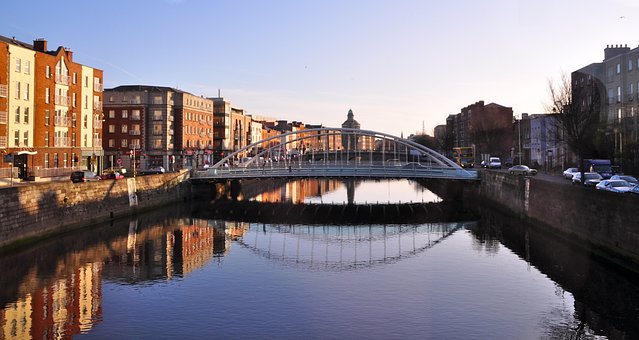
Poblacht na hÉireann or, as we know in English, the Republic of Ireland , is a country better known as Ireland.
If you live in Ireland, you are Irish.
The country uses the euro and speaks Irish and English as the official languages.
Beer, though, is the language that everyone in Ireland speaks the best.
Find out more about Guinness, Irish ballads, and other reasons why people love and abhor Ireland and living on this island of a country.
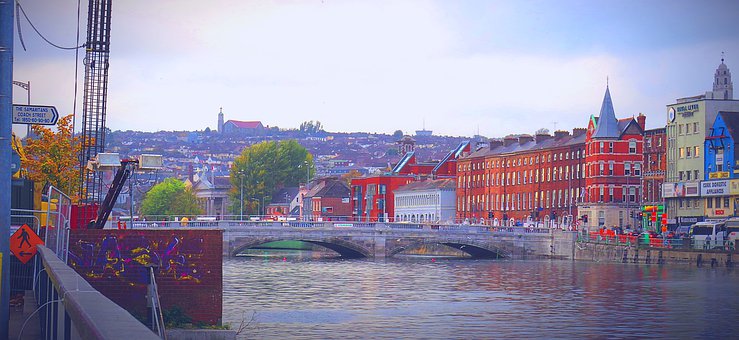
1. The Landscape
2. irish cottage pie vs. english shepherd’s pie, 3. guinness in ireland and other stouts , 4. irish pubs, 5. the uk and london, 6. st. patrick’s day , 7. faeries and other ancient irish creatures, 8. irish ballads, 9. high quality of life, 1. everyone drinks heavily, 2. island isolation, 3. the troubles , 4. housing market is competitive, 5. leprechauns, 7. ireland versus the uk, 8. orange versus green, pros and cons of living in ireland – summary table, ireland safety overview, what is the largest city in ireland, what is the biggest religion in ireland, what languages are spoken in ireland, does it rain a lot in ireland, what is football called in ireland, pros of living in ireland .
The Cliffs of Moher, the Atlantic Ocean, the Irish Sea, River Shannon, and Mount Brandon are some of the most striking landscapes to see while in Ireland.
Spend time hiking the MacGillycuddy’s Reeks mountain range.
The Reeks have 27 mountains straggled along the oceanside cliffs.
The highest peak in the range is Carrauntoohil, where the most popular trail to hike is the Devil’s Ladder .
At 3,407 feet, this is the tallest mountain in Ireland.
Yes, it’s true the English invented Shepherd’s Pie, with the use of lamb meat for the ground mince topped with English peas and potato mash.
However, in neighboring Ireland, the Irish cottage pie is just as toothsome.
In a traditional Irish cottage pie, the biggest difference, according to Jamie Oliver , is the meat.
Cottage pie uses ground beef instead of minced lamb.
Other ingredients that go well in an Irish cottage pie are Guinness beer and Worcestershire sauce originating in Worcestershire, Worcester , England.
Guinness hails from Ireland and is a world-famous beer, established in 1759 at St. James’s Gate Brewery, now owned by Diageo.
If you live in Dublin , you must visit the Guinness Brewery and Storehouse for a tour at the Gravity Bar .
Have a pint or three and you will be singing an Irish ballad before you can see straight!
Guinness is, after all, the most popular beer in Ireland.
Other types of alcohol brewed in Ireland include Murphy’s Irish Stout, O’Hara’s Irish Stout, and Kilkenny Irish Cream Ale.
Along the lines of alcohol is the quintessential experience of eating and drinking at an Irish pub.
Ain’t anything else like it if you live in Ireland!
The Brazen Head , which was founded in the 12th century, is one of Dublin’s oldest pubs.
The oldest Irish pub is Sean’s Bar, dating all the way to 900 AD and located on the River Shannon.
Wine Mag reports, “Sean’s Bar could be the oldest operating pub on the planet.”
The Red Lion is one of the most popular pub chains with over 500 locations.
Going to a pub means eating some Irish food while gulping down an Irish beer.
You might also watch Irish sports teams play Rugby on the telly or listen to a live Irish cover band of The Cranberries perform.
If you are into the Royal Family and the United Kingdom culture, Ireland is right next door.
A quick hop over by land and by sea, for a travel time of 10 hours, gets you from the center of Ireland to London , England.
Also, forget a passport.
Irish travelers only need an ID to get to London.
You can tour the Tower of London, take a ride on the London Eye, and shop at Harrods luxury department store.
Eat some fish and chips with malt vinegar before grabbing a late-night Jack the Ripper or Sherlock Holmes tour.
Being in Ireland for St. Patrick’s Day is the best way to celebrate the world’s biggest party holiday.
St. Patrick’s Day, also known as St. Paddy’s Day is held on March 17th.
This popular Irish holiday features all things green.
Shamrocks are the raging floral and everyone drinks beer, preferably Irish and in a green cup–if not actual green beer.
Parades and parties are held, particularly on riverfronts where the river waters are customarily tinted green, such as River Liffey in Dublin.
By the way, dying the river green is actually an American custom coming from Chicago .
And also, you might be wearing orange if you live in Liverpool , Ireland, in particular.
The Protestants in the country wear orange instead of green on St. Patrick’s Day.
Yes, the Irish believe in faeries or Celtic fae similar to elves called Aos si, and leprechauns, which are Irish fairies.
All of these are involved in bringing luck and magical powers.
Locals plant fairy trees to attract Irish fairies, and the story goes that when the tree dies, so does the fairy and maybe the homeowner.
Therefore, it is a risky business to plant a tree to grow for a fairy.
On St. Patrick’s Day, you may be specifically keen to see if you spot a green leprechaun out searching for its own gold–beer.
Tom Lehrer, Van Morrison, Aloys Fleishman, and Ruaidri Dáll Ó Catháin and hits like “Danny Boy” and “ Carrickfergus ”… are the names all Irishmen and Irishwomen know like the back of their hands.
The self-titled ballad, “ Irish Ballad ,” is particularly dark and gruesome, and can be seen as a poem.
For musicians and those who are interested in folk music, especially Irish music, this small island country is the best place to find it naturally!
Discover the latest Irish bands and enjoy live Irish music at local pubs as you savor those pints of Guinness.
Ireland is among the best countries to live in worldwide based simply on the quality of living the country provides its residents.
It is a leader in developed, free countries, and the quality of healthcare is highly prized.
The country was recognized as the first on the Good Country index by Travel + Leisure , as well.
Plus, there are just 5.1 million people living on more than 27,000 square feet of land.
There are far fewer residents than California at 39 million people, and that is only a state!
Cons of Living in Ireland
The alcohol consumption before COVID-19 was 44 percent of Irish adults over 18 drinking at least once weekly.
Additionally, the Irish drink an average of 10 liters of alcohol annually.
If you are not into alcohol or suffer from alcoholism, Ireland might prove to be problematic.
When you live on the island of Ireland, you are living isolated from the rest of the European mainland and even Great Britain.
Island isolation can be hard to cope with if you are from the US and used to road tripping.
Finding somewhere new to go while still in Ireland can also be a challenge if you enjoy traveling.
The Troubles were a 30-year war that raged between Northern Ireland and the Republic of Ireland.
More than 3,500 people were murdered as a result of the Troubles , which originated as a Londonderry civil rights march.
According to Brittanica , the Troubles resulted in “the Anglo-Irish Treaty that ended the War of Independence then created the Irish Free State in the south, giving it dominion status within the British Empire.”
According to InterNations regarding renting and buying homes in Ireland, the market is fairly competitive.
Apartments are also more expensive in Ireland compared to other European countries.
Also, foreigners have to prove that they will be able to afford to legally live in the country for at least one year.
You can get this from an employer or bank referring to your financial ability to afford to house.
The average cost of rent in Ireland is 1,400 EUR for a month, which is equivalent to $1,550 USD.
The leprechaun is a key figure in Irish folklore.
Also called leprecauns or lepracauns , the word comes from luchorpan, which is Old Irish meaning little body.
These characters are fairies who are, characteristically, older males.
Leprechauns wear a cocked hat and leather apron, and, according to Encyclopedia Britannica , are solitary shoemakers.
Known as tricksters, the leprechaun is mysterious and mischievous–and very much in search of treasure that glitters like gold.
If you see a leprechaun, you are most likely in Ireland, but they may be found worldwide.
If you live in Ireland, you might have to battle with a leprechaun as a foe, which could prove your undoing.
Just another reason why you might not want to live in Ireland.
By the way, supposedly the locals do not like talking about these wee little folk too much.
Maybe they are leprechauns themselves, or maybe they are afraid you are!
Earthquakes and thunderstorms are rare in Ireland, so if you are into storm chasing, forget about finding any wild weather here.
However, if you are going to live in Dublin, Derry , Cork, or Kerry, you had best prepare for the oceanic climate.
Living by the ocean means it is going to be wet.
Rain is frequent and so are winds from the ocean, which bring in ocean mists.
Winters are mild and see occasional snowfall and ground cover, but cold waves are infrequent due to the ocean currents.
Summers average a range of 60 to 70 degrees Fahrenheit, so forget about bikini weather even though you likely live on the coast.
Ireland and the United Kingdom are two different places.
Yet, often, outsiders are confused about what the United Kingdom is and how Ireland is part of this, or if Ireland is in the UK at all.
The United Kingdom makes up four countries–Wales, Ireland, Scotland , and England.
Then you have Great Britain, which includes Scotland, Wales, Northern Ireland, and England.
Ireland, aka the Republic of Ireland, is not part of Great Britain.
Also, Northern Ireland and the Republic of Ireland make up the entire country and the island that is Ireland.
Now, have a pint and try to explain this to your folks back home when you move to Ireland–it is enough to make you move back!
Protestants wear orange on St. Patrick’s Day when the rest of the world wears green.
That should tell you everything you need to know about this country.
St. Patrick’s Day is an Irish holiday, after all.
This has to do with the Orange Order, William of Orange, and the 1690s.
In short order, Catholics wear green and so does everyone else on St. Paddy’s Day–but the Protestants who are against the Catholics and in the Orange Order–thus they wear orange.
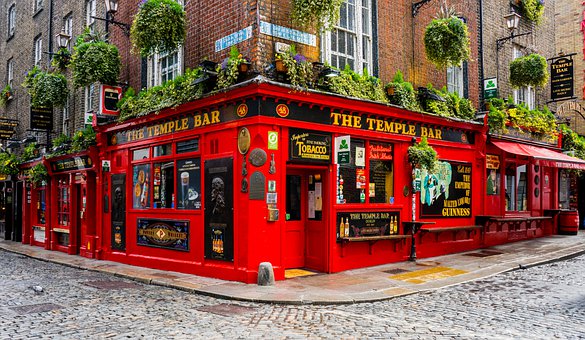
READ THE FULL REPORT: Ireland Safety Review

- OVERALL RISK: LOW
- TRANSPORT & TAXIS RISK: LOW
- PICKPOCKETS RISK: MEDIUM
- NATURAL DISASTERS RISK: LOW
- MUGGING RISK: MEDIUM
- TERRORISM RISK: MEDIUM
- SCAMS RISK: LOW
- WOMEN TRAVELERS RISK: MEDIUM
Frequently Asked Questions
Dublin is the largest city in Ireland with more than 1 million people.
Christianity, which includes both Catholicism and Protestantism, is the largest religion in the Republic of Ireland.
Nearly four-fifths of these people are also Roman Catholic.
English and Irish Gaelic are the primary languages spoken in Ireland.
More than 50 percent speak English and 17 percent speak Irish Gaelic.
Nearly 11 percent speak French!
Yes, most days you will get rain in Ireland, especially in coastal cities like Dublin.
Gaelic football (GAA) and is one of the most loved sports in the country.
In Irish, this translates as Peil Ghaelach or simply Peil.
Similar to soccer and futbol and American football, there are two teams and a rectangular grass field.
In the Irish version, each team wants to get the ball, which is round in this sport.
Additional Resources

21 Comments on 17 Pros and Cons of Living in Ireland
I AM MOVING IMMEDIATELY
I want go there this country is my dream country.
Im moving to ireland too be alone and die alone because the world is so judgemental
Hang in there, buddy!
lets move there together buddy
Ignore the world/judgment of people. Those that judge are usually the ones that have the most to hide
im looking at moving once i get out of school and considering i want to be a bartender looks like im gonna be making a decent amount of money
Ireland is one of the most expensive countries in Europe and The World. Very high rental costs, very high income tax and high sales tax, High homelessness, High unemployment, High crime. It has been described as over-rated, over-stated, over-priced and over-hyped. Poor quality of living, poor social standards (Ireland is famous for foul language, rude cursing and toilet mouthing). Add the fact that it is a non-pluralist theocracy noted for physical, sexual and psychological abuses by the Catholic Church who still retain high earnings from charities, property and land. High corruption is also a factor. With a papal nuncio (funded by the people) near the Presidents park, and funds transferred out tax-free at the expense of the Irish taxpayer. Poor Government and poor management has led to a sort of sub-Vatican state which is really run by a Curial Caste. Wettest country in Europe, it rains frequently with only c 21% of usable rain-free days. Tourist campaigns are high and often misleading depicting it as leafy green ireland. A high drug problem and a high crime rate have left Ireland in the lowest leagues of Europe. Live prices as of 2023 if you visit Galway City, you pay over $150/night (well over £100) for substandard accommodation. Flat rental city centre costs almost €2,000 per month (see daft.ie). Dinner for two and a bottle of wine costs over €100 on shop street and over €200 peak season. Car rental most expensive in Europe and so on. It is sad that such a place is infested by high prices, theocratic mis-management and foul language. I am Irish and more-than-qualified to comment on a country that used be somewhat OK to visit and live in. Sadly, no more. There are at least 40 other countries in Europe worth more visiting, and You wont have to listen to the cursing, toilet mouths and dysfunctional shenanigans. Summary… OVER RATED, OVER STATED, OVER PRICED & OVER HYPED.
so sad to read your arguments, lived there over the last 8 years, it got worse with time unfortunately. I hope some changes in good will take place🤞
This comment is inaccurate in many aspects. For example Ireland has its historically lowest unemployment rate at present, around 3%.
Ireland is one of the safest countries in the world. Do your research. The fact that the people drinks a lot does not mean high crimes.
can you tell me more about it from ur personal experience? im deciding of moving there
Hi, I’m interested in moving to Ireland and I guess I need all the caveats I can get. What’s my best shot for employment and a place to live there, as a non-wealthy Canadian?
Jesus Seamus don’t hold bsck
Ireland is a rip off. Be very careful.
Great Britain is an island consisting of England, Wales, and Scotland. The UK consists of Great Britain and Northern Ireland. Ireland is a separate country from the United Kingdom.
Any country is WHAT YOU MAKE FOR YOURSELF ‘THERE’, EIRE IS STILL PORICUAL/ WHICH MANY FIND COMFORTING, AND intune with Irish characteristic -friendly _.witty,— I read an obituary recently of an Irish Teacher, Which described him as a witty lovable rough , irishness it’s like a self proclaiming nationalism
Why are you calling it Eire? We call it Ireland.
If he wants to come and stay married to a girl, is there any benefit in staying with him?can i
“According to Brittanica, the Troubles resulted in “the Anglo-Irish Treaty that ended the War of Independence then created the Irish Free State in the south, giving it dominion status within the British Empire.”
This is wholly inaccurate. The ‘troubles” were in the late 1960’s up to the late 1990’s and were brought to an end by the Good Friday Agreement in 1998.
The Irish Free state existed between 1922 and 1937 when the Republic of Ireland was created officially becoming a Republic in 1949.
Leave a Comment Cancel reply
Popular destinations.

Safety Index
Recent reviews & comments.
- Shan on Brisbane
- dummy above me on Saudi Arabia
- amora on 15 Pros and Cons of Living in Jamaica
- M.... on Amman
- Anton on Jordan
Popular US States
- Pennsylvania
Ireland Vs. Wales: Which One Is Better for The Perfect U.K. Vacation?
Choosing between two beautiful counties such as Ireland and Wales for vacation is no easy feat, but we've got all the info you need.
With breathtaking countryside, popular beaches, and a lot of history, the United Kingdom is one of the most picked vacation countries worldwide. The country offers great destinations for your vacation whether alone, with friends, or family.
The English countryside prides itself on its peaceful ambiance and beautiful lakes. They also offer green hills, rocky coasts, pubs, and castles – not to mention their modern destinations and unique cuisine that will surely leave you looking forward to your next taste.
If you are planning on a trip soon and are choosing between Ireland or Wales, read further to get all the information you need and come up with the perfect vacation.
More Than Pubs and Guinness
The rich history of Ireland can be traced back to prehistoric times. The abundance of historical sites, unique houses, and museums make the island the perfect destination for avid historians. Aside from lush greens, beaches, forests, cliffs, and national parks, the country also boasts of its friendly city Dublin .
If you are planning to experience Emerald Isle’s best, here are some places to visit or activities to do that may have you choosing Èire.
Visit the Blarney Castle
No Ireland trip is complete without visiting the Blarney Castle – considered one of the classic and oldest attractions on the island.
Legend tells that when you kiss the Blarney stone, you will be endowed with the so-called “gift of gab” – or flattery skills. But it isn’t for the faint of heart.
The gifting stone is made of Carboniferous limestone incorporated into the fortifications of the castle. This popular tourist attraction in Ireland attracts vacationers from around the world to try the legendary smooch and take a tour of the castle’s jaw-dropping interiors and gardens.
Lines for kissing are very long so bring a lot of patience with you when you visit.
RELATED: Ireland's Traditional Pilgrimage Hikes Are Both Beautiful And Symbolic
Take a Deep Dive into the World’s Most Famous Sunken Ship at the Titanic Belfast
The entire world has heard, or even watched in theaters the story of the well-known ship Titanic and its unfortunate fate during its first journey into the oceans.
What some might not be aware of is the place where the ship was built – in Belfast, and this place is rich with everything Titanic!
Since starting operations in 2012, the Titanic Belfast has garnered numerous awards being one of the top tourist spots in the world.
They offer self-guided tours which will take you down memory lane to learn about the Titanic, the team who created it, and the passengers on board its maiden voyage.
Take a Break from the City and Enjoy the Outdoors by Visiting the Glenoe Waterfall
Surely, there are a lot of beautiful waterfalls on the Emerald Isle but the best of them all is the Glenoe Waterfall.
This not-so-big waterfall is located in the outer part of Glenoe village and can be visited via car from the city. Just look for the Waterfall Road carpark, settle and follow the guided path for two-minute through the trees going to the waterfall.
The Glenoe Waterfall is also the perfect stop for the weekend if you are planning to make a north coast trip and see more attractions.
The Land of Song
Famous for its rugged mountains, rolling valleys, and gigantic national parks, Wales is a place where the pace is slow and the atmosphere is great.
Between hiking, going to resorts, or visiting the cities, you will find many reasons to enjoy Wales. Take a quick peek at the great destinations in this popular ‘Land of Castles.’
RELATED: 10 Must-See Things On A First Trip To Wales
Climb the Snowdon in Snowdonia
Snowdon is located in the popular national park called Snowdonia and is considered among the tallest UK mountains. The massive park, coupled with the tall mountain makes this place a haven for outdoor adventurers. In Britain, Snowdonia makes the list of the top places to hike. But if you just want to enjoy the view sans the walk, you can enjoy the Snowdon Mountain Railway.
Visit Caernarfon Castle – An Important Part of Wales’ History
There are approximately 640 existing castles in Wales and Caernarfon Castle is one that stands out. Since it was erected in 1283, the castle has been besieged and re-captured numerous times, yet it is still one of the most well-preserved medieval castles in all Europe. The castle boasts abundant towers in its walls, making it a formidable defensive structure.
As a side trip, you can go to the nearby towns surrounding the castle and enjoy sumptuous food and drinks at the many restaurants, pubs, and cafes.
Relax in Llandudno – A Peaceful Beach Resort in Wales
Dubbed as the “Queen of Resorts in Wales,” Llandudno is the most popular and biggest resort among other destinations in Northern Wales.
It is located just below The Great Orme (an impressive limestone headland), which is also a great destination spot. Following the tramway up, you can have a spectacular view of the pier and the resort. If you are feeling a bit adventurous, there is also a ski slope and cable cars .
Aside from the spectacular beach, there is also a wide selection of restaurants, cafes, and hotels. There is even a Victorian-themed carnival where you can pass time.
So, Ireland Or Wales?
Ireland and Wales are both magnificent places that offer rich history and tradition aside from their spectacular attractions. In addition, renting a car is convenient as the tourist spots on these islands are all accessible by enjoyable road trips.
In the end, the decision will go down to your personal preference, length of stay, and budget.
NEXT: Ireland Vs Scotland: 20 Photos Taken By Travelers To Help You Decide
- College Study Abroad
- College Study Abroad Blog
Ireland vs. Scotland Travel: Where Should You Study Abroad?
October 5, 2023
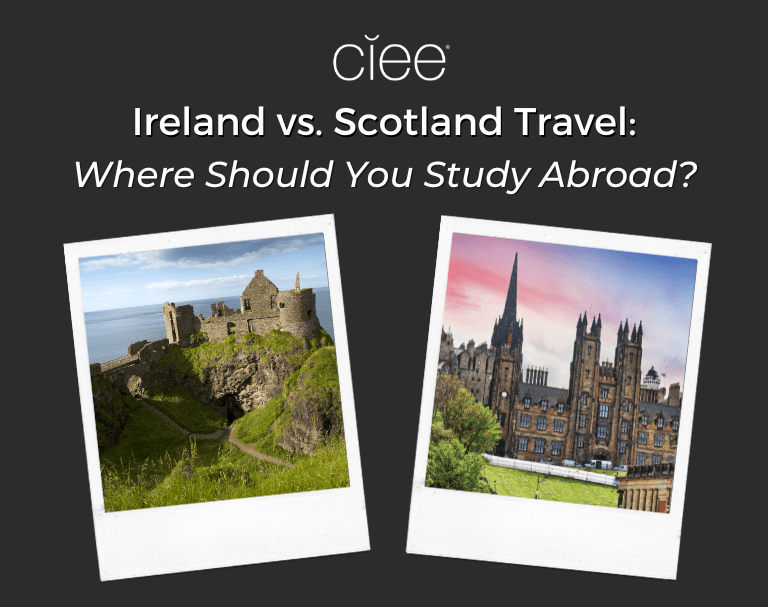
Programs for this blog post
Authored by:.

When you think of Ireland and Scotland , you might be imagining two very similar countries – lots of greenery, the U.K., cafés, and packed, early histories. And although there are some resemblances between the two, we’re here to set the record straight – Ireland vs. Scotland travel varies, with each country offering a unique and exciting study abroad experience.
Read on to find out which country makes the most sense as a study abroad destination for you!
Quick Overview: Ireland vs. Scotland Travel Abroad
Studying abroad in Ireland or Scotland guarantees an adventure. There’s no wrong choice here.
When we think of Scotland, we immediately go to the country’s stunning landscapes, interesting culture, and affordable living.
Scotland features some of the most beautiful lochs, rugged highlands, expansive coastlines, and towns that look directly out of fairytales. How would we describe the culture? While it’s much more complex than this, in a few words: Kilts, bagpipes, friendly, and warm. Glasgow and Edinburgh , the two main cities for CIEE study abroad in Scotland, are relatively affordable, with low transportation and food costs. Meat pudding, anyone?
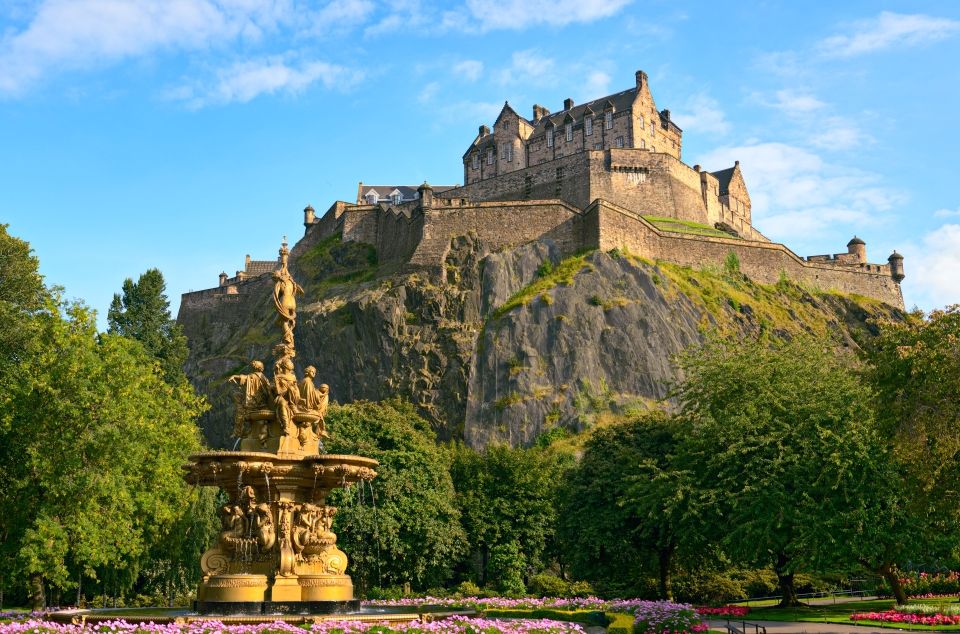
Read More: The Ultimate Guide to Studying Abroad in Scotland
Affectionately dubbed the Emerald Isle, Ireland is also known for its beautiful natural landscapes, fascinating history, unique heritage, and diverse student populations.
We think of Ireland’s rolling hills and archaeological wonders like the Burren, centuries-old castles, pubs, burial grounds, jails, and even libraries. Ireland’s heritage is packed with folklore, literature, music, and dance, and the people can be fondly summed up as lively, fun, and generous. Plus, tens of thousands of international students can be found throughout Ireland, so you’ll meet people from all over the world during a study abroad trip to the Emerald Isle.
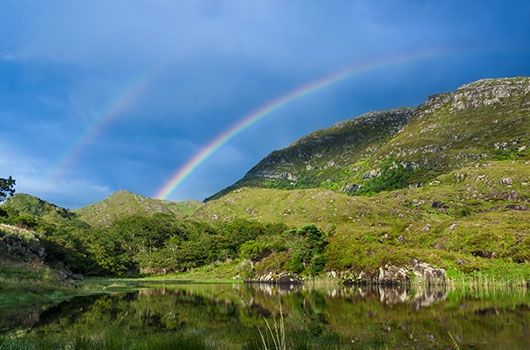
Read More: The Ultimate Guide to Studying Abroad in Ireland
Scotland vs. Ireland
Both countries sound fabulous, right? When comparing Ireland vs. Scotland travel, like any country, Scottish and Irish cultures vary. Although they’re both beautiful, Scotland is primarily covered by high mountains, while Ireland has more rural countryside. Plus, the Emerald Isle is actually an island, while Scotland is attached to Great Britain.
And of course, the histories of these countries are different. Northern Ireland is a part of the U.K., while the rest of Ireland is called the Republic of Ireland. On the other hand, Scotland is entirely part of the U.K. You’ll notice some other basic differences in our fast facts below.
Fast Facts about Ireland Study Abroad
Let’s look at some fast facts about Ireland!
- Population: A little more than five million
- Climate: Mild, temperate climate with warm summers and moderate winters; winter temperatures average 39 to 45 degrees Fahrenheit, and summer temperatures range from 55 to 60. It is relatively rainy.
- Location: Ireland is an island west of the U.K., in the Atlantic Ocean
- Currency: The Republic of Ireland uses the Euro, while Northern Ireland uses the Pound sterling (the same as the U.K.)
- Language: Most of Ireland speaks English and Irish, often called Gaelic
- Airport: There are quite a few airports in Ireland, with five international ones, including Dublin Airport, Kerry Airport, Shannon Airport, Knock Airport, and Cork Airport
- Local Attraction: There are a ton in the Emerald Isle, but one of the most famous is the Cliffs of Moher
- Bonus Fact: Halloween originated in Ireland
Read More: What Does Craic Mean? Your Guide to Irish Slang
Ireland Travel Tips
When you embark on your study abroad trip to Ireland, save some of these Ireland travel tips:
- Bring a rain jacket – while temperatures are mild, Ireland is pretty damp year-round
- Convert cash to both the Euro and the Pound sterling
- Go beyond Dublin! While there’s much to discover in the capital, Ireland has hidden gems throughout the rest of the country
- Read up on Irish slang and familiarize yourself with some common phrases ahead of your travels
- Get to the Cliffs of Moher early in the morning if possible – it gets crowded fast

Ireland Travel Blog
If you’re looking for even more information on studying abroad in Ireland, check out our Ireland travel blog – we cover it all from Irish slang, the steps to a CIEE program, personal student accounts of their time in the Emerald Isle, and of course, key reasons why studying abroad in Ireland might be the perfect choice for you.
Fast Facts about Scotland Study Abroad
We’re still weighing Ireland vs. Scotland travel abroad, so let’s dive into Scotland!
- Population: About 5.4 million people, so a slightly bigger population than Ireland
- Climate: Scotland also has a temperate climate with four distinct seasons, with winter temperatures averaging around 40 degrees Fahrenheit and summer temperatures averaging about 63 degrees. Scotland is also pretty rainy.
- Location: Scotland is in the northernmost part of the U.K., with the North Sea to the east and the Atlantic Ocean to the west
- Currency: The Pound sterling
- Language: Most of Scotland speaks English, with some speaking Scots and Scottish Gaelic
- Airport: Scotland features several airports with the main international airports including Aberdeen International Airport, Edinburgh Airport, Glasgow Airport, and Glasgow Prestwick Airport
- Local Attraction: There’s a ton of fascinating attractions throughout Scotland, but one of the most popular is the Edinburgh Castle, located in the country’s capital
- Bonus Fact: The modern game of golf was invented in Scotland
Read More: Your Guide to Scottish Slang: Top 10 Phrases You Should Know
Scotland Travel Tips
As you prepare for a Scotland study abroad adventure, note some of our Scotland travel tips:
- Explore outside of the big cities like Edinburgh or Glasgow, and try to get to places like Cluanie, The Kelpies, and more
- Bring a rain jacket! Like Ireland, Scotland is pretty wet year-round
- You must try a full Scottish breakfast during your stay
- Customary tipping in a bar or restaurant is about 10 percent of the bill
- Bring a reusable water bottle – most Scots are passionate about sustainability and the environment

Scotland Travel Blog
If you haven’t yet, check out our blogs on all things Scotland . From Scottish slang, comparing Glasgow vs. Edinburgh, top Scottish eats and drinks, and more, you’ll learn all about what a Scotland study abroad trip entails!
Take Your Studies Global
Now that we’ve covered Ireland vs. Scotland travel abroad, you’re all set to explore which CIEE study abroad program makes the most sense for you in either of these incredible locations!
SEARCH PROGRAMS
- Activities & Excursions
Related Posts

Don't Forget to Wander
Hello! I’m the Program Manager here at CIEE Edinburgh. I’m originally from the US and studying abroad in Prague and Seville inspired me to continue living abroad after graduating. I... keep reading
- Life Abroad
© 2024 CIEE. All Rights Reserved.
- Privacy Notice
- Terms & Conditions
Should you study in Ireland or the UK?
Choosing the right destination for your higher education is crucial to shaping your academic and professional future. Ireland and the United Kingdom (UK) are two popular options as both offer excellent study programmes for international students. There are several benefits, as well as differences, to studying in each country.
In this article, we will take you through some of the main talking points of each country to help you decide Ireland or UK which is better.
Table of Contents
Study in ireland vs uk: highlights, 1. top universities in ireland, 2. top universities in the uk, uk vs ireland: popular courses, ireland vs uk for masters , 1. admission requirements in ireland, 2. admission requirements in uk.
- Study in Ireland vs UK: Cost of studying a undergraduate program
Study in Ireland vs UK: Cost of studying a postgraduate program
1. student visa for the uk, 2. student visa for ireland, 1. postgraduate work visa in ireland, 2. postgraduate work visa in the uk, 1. cost of living in ireland, 2. cost of living in the uk, is ireland better than uk for education, is it cheaper to study in ireland than in the uk , can i get permanent residency in ireland, how many hours can a student work in ireland, is it easier to immigrate to the uk or ireland, is getting permanent residency (pr) in ireland easy, can i get pr in the uk after completing my studies , what is the best university for international students in northern ireland, the next step, study in ireland vs uk: top universities.
Ireland and the United Kingdom (UK) have a rich tradition of academic excellence and are home to some of the world's most prestigious institutions.
Irish universities have garnered international recognition for their high education standards, cutting-edge research, and commitment to fostering innovation.
The best universities in Ireland, according to the QS rankings 2024, are:
Also Read: The top universities in Ireland for international students
The prospect of studying in the UK presents an opportunity for international students to engage with some of the world's most prestigious and academically rigorous universities. The best universities in the UK, according to the QS rankings 2024, are:
While Ireland has excellent universities, the UK has a larger number of world-class institutions, making it the preferred choice for those seeking academic prestige.
Also Read: What Are The Most Popular Degree Courses in The UK?
Each country offers a wide array of popular courses across various disciplines.
Both Ireland and UK are ideal destinations to pursue a Master's degree, but they differ in several ways Ireland’s universities, known for its smaller class sizes and strong emphasis on research, offer a more personalised and immersive learning experience. Ireland is particularly strong in STEM fields, technology, and life sciences. It's an attractive destination for those pursuing degrees in areas like computer science, engineering, and biotechnology.
Additionally, it offers several post-study work opportunities for international graduates. The UK is home to some of the world's most prestigious universities, including the University of Oxford and the University of Cambridge. It offers a broad spectrum of programs, making it an excellent choice for almost any field of study. Whether you're interested in arts and humanities, business, law, or science, you will likely find a suitable program. The UK also has a robust internship and job market for international students.
Choose Ireland if you value smaller class sizes and your academic interests lie in STEM disciplines, technology, or life sciences. Choose the UK if you want access to a wide array of programs and aim to study at some of the world's most renowned universities, such as Oxford and Cambridge.
Also read: Cost of living in Ireland for International Students
UK vs Ireland: Admission requirements
Admission requirements for universities in Ireland and the UK can vary depending on the institution, the level of study (undergraduate or postgraduate), and the specific program you are interested in.
1. Undergraduate admission
- Qualifications: Typically, Irish universities require applicants to have completed their secondary education and obtained a Leaving Certificate. International students might need to provide equivalent qualifications, such as A-levels or the International Baccalaureate.
- Language Proficiency: If your primary language is not English, you will need to demonstrate English language proficiency by providing IELTS or TOEFL scores. The minimum score requirements can vary between institutions but are usually around IELTS 6.0-6.5 or TOEFL iBT 80-90.
- Specific Program Requirements: Some programs, like medicine, dentistry, and veterinary science, may have additional entry exams or interviews.
2. Postgraduate admission
- Qualifications: You'll typically need a bachelor's degree or equivalent, relevant to the program you're applying for. Some master's programs may require a specific grade or GPA.
- Language Proficiency: As with undergraduate programs, you'll need to prove your English language proficiency through IELTS or TOEFL.
- Reference Letters and Statement of Purpose: Many postgraduate programs require letters of recommendation from professors and a statement of purpose outlining your research interests and goals.
- Entrance Exams: Some postgraduate programs, especially in highly competitive fields, may require GRE or GMAT scores.
- Qualifications: UK universities typically require A-levels or equivalent qualifications for undergraduate programs. International students may also be asked to provide proof of the equivalence of their qualifications.
- Language Proficiency: You'll need to demonstrate English language proficiency through IELTS or TOEFL. The required score can vary but is often around IELTS 6.0-6.5 or TOEFL iBT 80-90.
- UCAS Application: Most undergraduate applications for UK universities are processed through the Universities and Colleges Admissions Service (UCAS). You can apply for multiple universities and courses through a single UCAS application.
- Qualifications: You'll need a relevant bachelor's degree or equivalent, and some programs may have specific grade requirements.
- Language Proficiency: As with undergraduate programs, English language proficiency is required, often demonstrated through IELTS or TOEFL.
- Reference Letters and Personal Statement: Postgraduate applications often require reference letters and a personal statement detailing your academic and research interests.
- Research Proposal: For research-based master's and Ph.D. programs, you may need to submit a research proposal outlining your proposed project.
- Entrance Exams: Some postgraduate programs may require GRE or GMAT scores, especially in competitive fields.
Study in Ireland vs. UK: Cost of studying a undergraduate program
Ireland and the UK are popular destinations for undergraduate studies for international students due to their prestigious universities and diverse academic offerings, but they differ in tuition fees, living expenses, and available financial support.
The tuition fees for undergraduate programs at popular universities in Ireland are:
The tuition fees for undergraduate programs at popular universities in the UK are:
Also Read: How much does it cost to study in Ireland?
The tuition fees for postgraduate programs in Ireland can vary significantly. For EU/EEA students, fees tend to be lower than those for international students. On average, international students may pay higher fees, ranging from €9,000 to €30,000 or more annually.
The tuition fees for postgraduate programs at popular universities in Ireland are:
Like Ireland, the tuition fees in the UK for postgraduate programs vary widely, with universities setting their fee structures. On average, international students might expect to pay between £10,000 to £25,000 or more for a one-year postgraduate program, depending on the subject and university.
The tuition fees for postgraduate programs at popular universities in UK are:
- Cost of Study in the UK for Indian Students
- Cost of Study in Ireland
Ireland vs UK for international students: Student visa
The student visas for Ireland and UK serve as vital gateways for individuals seeking to embark on educational journeys, immersing themselves in top-notch academic institutions while experiencing unique cultures.
1. Tier 4 (General) Student Visa
The Tier 4 (General) Student Visa is the primary student visa category for international students coming to the UK for higher education. This visa allows students to study full-time and work part-time during term-time (typically up to 20 hours per week) and full-time during vacations.
2. Tier 4 (Child) Student Visa
This visa category is for children aged 4 to 17 who wish to study at independent schools in the UK. It requires a Confirmation of Acceptance for Studies (CAS) from a licensed Tier 4 sponsor and proof of parental consent.
Also Read: Guide to UK Student visa
1. Stamp 2 (Student) Visa
International students planning to study in Ireland for more than 90 days (3 months) must apply for a Stamp 2 Student Visa. Stamp 2 visas are typically issued for the duration of the course.
2. Stamp 2A (Study Abroad) Visa
This visa is for non-European Economic Area (EEA) students who plan to study in Ireland for less than 90 days, typically for short-term programs or exchange programs.
Also Read: Which Irish student visa you need?
Ireland vs UK for international students: Post-graduate work visa
Both Ireland and the UK offer post-graduate work opportunities, but the specific schemes and eligibility criteria vary.
1. Stay Back Option
Ireland offers a "Stay Back" option for international students who have completed their degrees in Ireland. This scheme allows students to stay and work in Ireland for a specific duration after graduation.
2. Post-Graduate Work Permit (PGWP)
Students who graduate from a recognized Irish higher education institution can apply for a Post-Graduate Work Permit, which allows them to work in Ireland for up to two years. If you complete a master's or Ph.D. program in Ireland, you can extend the Post-Graduate Work Permit for an additional year.
3. Immigration Pathways
Ireland has various immigration pathways for skilled workers, including the Critical Skills Employment Permit and the General Employment Permit. Graduates can transition to these permits if they secure a job offer in Ireland.
Ireland's "Stay Back" option and Post-Graduate Work Permit allow graduates to work in Ireland for up to two years (or three years for Ph.D. graduates) after completing their studies.
1. Graduate Route (formerly Post-Study Work Visa)
In the UK, the Graduate Route is a popular work visa option for international students who have completed a degree at a recognized UK higher education institution. The Graduate Route allows graduates to work, seek employment, or start their own business in the UK for a period of two years (or three years for Ph.D. graduates). There is no requirement for a job offer or sponsorship from an employer, making it a flexible option for recent graduates to explore career opportunities.
2. Skilled Worker Visa
After the Graduate Route, many international graduates transition to the Skilled Worker Visa, which is the UK's main immigration route for skilled workers. To be eligible, you must secure a job offer from a UK employer that holds a Skilled Worker Sponsorship License and meets specific skill and salary requirements.
3. Innovator and Startup Visas
Graduates interested in entrepreneurship can apply for the Innovator or Startup Visa, allowing them to establish and run their own businesses in the UK.
The UK's Graduate Route offers a longer initial post-graduate work period (two years) without requiring a job offer, providing graduates with flexibility.
Cost of living in Ireland vs UK
1. accommodation.
The cost of housing in Ireland can be relatively high, particularly in major cities like Dublin and Cork. Rent for a one-bedroom apartment in the city centre can range from €1,200 to €2,500 per month, while suburban areas may offer slightly more affordable options.
Grocery prices in Ireland are generally on par with other Western European countries. A typical monthly grocery bill for a student might amount to €200 to €300 , depending on lifestyle and dietary choices.
3. Transportation
Public transportation is well-developed in Irish cities, with Dublin's public transport system, including buses and trams, being widely used. A monthly transportation pass in Dublin can cost around €100 .
4. Healthcare
Healthcare in Ireland is provided through a mix of public and private services. International students usually require private health insurance, which can cost approximately €500 to €1,000 per year .
5. Utilities
Utility bills, including electricity, heating, cooling, water, and garbage, typically amount to around €100 to €150 per month .
- Cost of Living in Ireland for International Students
- Cost of Living in Ireland for Indian Students
The cost of housing in the UK also varies significantly by location. London is known for its high rent prices, with a one-bedroom apartment in the city centre costing around £1,500 to £2,500 per month. In other UK cities, such as Manchester or Birmingham, accommodation tends to be more affordable.
Similar to Ireland, grocery prices in the UK are in line with Western European standards. A monthly grocery bill for a student may range from £150 to £250.
The UK has an extensive public transportation network, especially in cities like London and Manchester. Monthly transportation passes can range from £70 to £150 .
Healthcare in the UK is primarily provided through the National Health Service (NHS) , which is funded through taxation and generally accessible to students.
Utility costs in the UK, including electricity, heating, water, and internet, may amount to around £100 to £150 per month .
The cost of living in Ireland is slightly cheaper than the UK but only by a little.
Both countries offer excellent educational opportunities, world-renowned universities, and unique advantages. The decision of whether to study in Ireland or the UK ultimately depends on individual preferences, goals, and circumstances.
Frequently asked questions
It varies by program and institution. Ireland is known for its friendly education environment and English-language instruction, while the UK boasts prestigious universities and a wider variety of academic disciplines. Choosing between them depends on your specific academic goals and preferences.
Some Irish universities generally have lower tuition fees than their UK counterparts. Still, it's essential to research specific programs and scholarships to determine the overall cost of your chosen course.
Ireland offers pathways to permanent residency and citizenship, but eligibility criteria vary based on your visa category, duration of stay, and other factors. For the most accurate and up-to-date information on Irish immigration policies, consult the Irish Naturalisation and Immigration Service (INIS) or an immigration lawyer.
International students with valid study visas in Ireland are typically allowed to work part-time (up to 20 hours per week) during term time and full-time during holidays.
The UK and Ireland have specific immigration pathways and requirements, so research and consult official government sources for the most accurate information.
The ease of obtaining PR depends on the specific immigration pathway and your eligibility. Achieving permanent residency in Ireland can be possible through various routes, such as employment, family reunification, or long-term residence.
Yes, you can get PR in the UK after completing your studies. The UK offers post-study work options, such as the Graduate Route, which allows international students to stay and work in the UK for a certain period after completing their studies.
Queen's University Belfast and Ulster University are among the prominent universities in Northern Ireland that welcome international students.
Choosing where to study in Ireland or the UK will depend on your degree speciality and your budget. Whether you decide to study in Ireland or the UK, Edvoy can help you with your application.
Contact us today to start the application process.

Study Abroad Expert
Disclaimer: The views and opinions shared in this site solely belong to the individual authors and do not necessarily represent t ...Read More
Top 10 universities to study big data analytics in the UK
Why do Indians like to study in the UK?
Top 10 places to visit in the UK
MBA in UK universities with professional placements
Which type of UK student accommodation is right for you?
8 best universities to study game design in the UK
Money latest: Morrisons shoppers are going to notice two changes in stores
Morrisons has launched two major changes for shoppers – with stores offering travel money and trolleys now featuring advertisements. Read this and all the latest consumer and personal finance news below - and leave your thoughts in the box.
Thursday 25 April 2024 19:51, UK
- Halifax hikes mortgage rates - as entire market moves upwards
- Renters' Reform Bill signed off - but with indefinite delay to no-fault evictions ban
- Morrisons rolls out bureau de change and trolley adverts
Essential reads
- The world of dark tourism - what is it, is it ethical, and where can you go?
- Money Problem : I have a mortgage offer - will it change now rates are rising?
- Savings Guide : Why locking into fixed-rate bond could be wise move
- 'More important than a will': What are lasting power of attorneys and how much do they cost?
- Cheap Eats : Michelin chef's secret lasagne tip - and expensive ingredient you shouldn't use
Ask a question or make a comment
Halifax has become the latest major lender to up mortgage rates.
They are putting up a range of deals by 0.2%.
BM Solutions also announced increases today.
It follows similar moves by TSB, NatWest, Virgin, Barclays, Accord, Leeds Building Society, HSBC and Coventry last week.
Lenders are responding to swap rates - which dictate how much it costs to lend money - rising on the back of higher than expected US inflation data, and concerns this could delay interest rate cuts there.
US trends often materialise elsewhere - though many economists are still expecting a base rate cut from 5.25% to 5% in the UK in June.
This is what average mortgage rates look like as of today...
Justin Moy, managing director of EHF Mortgages, told Newspage: "Yet more bad news for mortgage borrowers, as two of the biggest lenders announce increases to their fixed-rate products.
"As mortgage rates creep up and past 5% even for those with the largest deposits, we seem to be lacking a clear strategy of the government or the Bank of England on how rates will eventually fall.
"Even 2% inflation may not be enough to reverse the recent trends in rates."
Morrisons has launched two major changes for shoppers – with stores now offering travel money and trolleys featuring advertisements.
Announcing their bureau de change service, Morrisons said customers could exchange currencies in select stores or could place their money orders online at Morrisonstravelmoney.com.
Using the online service means customers can either click and collect their cash in certain Morrisons stores or at any of Eurochange's 240 branches. Alternatively, they can go for home delivery.
Services director at Morrisons, Jamie Winter, said the service "will provide our customers with easy access to a wide range of currencies at competitive exchange rates".
So far, stores in the following areas have travel money kiosks:
- Basingstoke
In other news, the supermarket chain rolled out a new trolley advertising across 300 stores in a partnership with Retail Media Group.
A sweetener used in drinks, sauces, savoury and sweet foods and chewing gum can cause serious damage to people's health, according to a new study.
Neotame, a "relatively new" sweetener, could damage the intestine by causing damage to healthy bacteria in the gut, according to the study, leading it to become diseased and attack the gut wall.
The study by Anglia Ruskin University (ARU), published in the journal Frontiers in Nutrition, found the negative effect of neotame "has the potential to influence a range of gut functions resulting in poor gut health", potentially impacting metabolic and inflammatory diseases, neuropathic pain, and neurological conditions.
The illnesses this could lead to include irritable bowel disease or insulin resistance.
Read the full story here ...
As we reported yesterday, a pilot programme is coming into force in Venice today that means visitors have to pay a €5 (£4.28) charge to enter the city.
Authorities say the pilot programme is designed to discourage tourists and thin the crowds that throng the canals during peak holiday season, making the city more liveable for residents.
Pictures have been emerging this morning of people queueing to register for a QR code that will allow them to enter after they have paid the charge - and officials carrying out checks on people inside the city.
People found to be contravening the rules can be fined up to €300 (£257).
As detailed in our story , the move has been met with anger among some in the city.
Venice is the first city in the world to introduce a payment system for tourists - but comments from its most senior tourist official suggested it may become a more common practice for major tourist hotspots in Europe.
Simone Venturini revealed the pilot programme was being closely watched by other places suffering from mass tourism - including other Italian art cities and hugely popular weekend-break destinations Barcelona and Amsterdam.
More than 160,000 people switched to Nationwide from other providers at the end of 2023, when the building society was offering a huge cash switching incentive.
According to figures from the Current Account Switch Service (CASS), Nationwide had a net gain of 163,363 account switchers between October and December, after leavers were taken into account.
It was the highest quarterly gain since the same period in 2022, when 111,941 switched to Nationwide.
The building society launched a £200 switching bonus for new joiners in September last year - the biggest giveaway on offer at the time. It withdrew the offer just before Christmas.
The latest CASS figures, which show Nationwide had 196,260 total gains before accounting for leavers, suggesting it could have spent up to £39m on nabbing customers from other providers in the last three months of the year.
Barclays and Lloyds Bank saw more modest net gains of 12,823 and 5,800 respectively, while the rest of the UK's big banks reported net losses.
NatWest and Halifax fared worst, losing over 40,000 more switchers each than they gained.
This week saw the last remaining switching offer on the market withdrawn.
Sainsbury's is having technical issues again - with shoppers taking to social media to say their deliveries have been delayed or cancelled.
The supermarket has been replying to customers saying: "I'm really sorry about the tech issues this morning.
"We're aware of the situation and are working to sort it as quickly as possible. In the meantime, we'd advise you place a new order for a future date."
Customer Andrew Savage wrote: "Order has not been delivered and no confirmation email this morning."
Another, John B Sheffield, said: "So angry! Just got through to your customer line after 40 min WAIT.
"Tells me NO DELIVERIES TODAY! tech problem? I've NO FOOD IN! ANGRY!"
In a statement to Sky News, a Sainsbury's spokesperson says: "A small technical issue affected some groceries online orders this morning.
"We have contacted these customers directly to apologise for the inconvenience."
In another update at 10am, the supermarket said that the issue has been resolved.
Responding to customers on X, Sainsbury's also offered those affected e-vouchers and details on how to rebook their orders.
It comes a month after the supermarket had to cancel almost all deliveries on a Saturday in mid-March due to another technical issue.
By Daniel Binns, business reporter
A potential $38.8bn (£31bn) takeover of UK-based mining company Anglo American has sent its shares soaring - and helped the FTSE 100 hit yet another record high this morning.
The attempted mega-merger, by larger Australian rival BHP, is currently being reviewed by Anglo American's board.
The deal, if it goes through, would create the world's biggest copper mining company - and comes as the price of the metal continues to climb amid soaring demand.
Anglo American's shares have surged as high as 13% this morning as news of the negotiations emerged.
The announcement also helped spur the FTSE 100 to a new intraday (during the day) high of 8,098 points.
The index, of the London Stock Exchange's 100 most valuable companies, has hit a string of records this week, including an all-time closing high of 8,044 points on Tuesday.
The score is based on a calculation of the total value of the shares on the index.
Also moving the markets are a string of company results which were published earlier on Thursday.
Among those issuing updates to investors was drugsmaker AstraZeneca. Its stock is up more than 5% after the firm reported quarterly profit and revenue above market estimates.
Unilever is also up 5% following similar better-than-expected quarterly figures.
Another good performer is Barclays - despite reporting a 12% fall in profits for the first three months of 2024. Its shares are up more than 4%.
That's because its quarterly figures are slightly better than expected, and the bank has said it expects its fortunes to improve later this year.
Meanwhile, as tensions in the Middle East continue, the price of a barrel of Brent crude oil continues to hover at a price of around $88 (£70).
This morning £1 buys $1.25 US or €1.16, similar to yesterday.
Every week we get experts to answer your Money Problems - usually on a Monday, but today we have a short, bonus addition in light of multiple lenders raising mortgage rates this week on fears an interest rate cut could be delayed to a little later this year (note: many economists still think it will come in summer).
A few readers have got in touch with questions similar to this one...
My remortgage is due to complete on 1 May. I already have an offer but with rates going up, is there any way at all my offer rate could increase? Saz681
We asked David Hollingworth, director at L&C Mortgages, to answer this one...
It's great news that you are already set up with a mortgage offer, Saz - ready to make a smooth switch to a new deal and/or lender, once the current one ends.
It does take time to set up a new mortgage so shopping around the market a good few months ahead will help you put everything in place and avoid slipping onto a high variable rate.
Fixed rates have been nudging up slightly but you have already got a formal offer in place so shouldn't worry.
Applying for a mortgage will generally secure that rate and the lender will then carry out any further checks to issue the mortgage offer.
The offer will be valid for a specified period, often for up to six months. Rates are always shifting for new customers but you can rest easy that your rate should be safe and sound for your switch in May.
This feature is not intended as financial advice - the aim is to give an overview of the things you should think about. Submit your dilemma or consumer dispute, leaving your name and where in the country you are, by emailing [email protected] with the subject line "Money blog". Alternatively, WhatsApp us here .
By Ollie Cooper , Money team
Interest in a phenomenon known as "dark tourism" has been steadily rising in recent years - but what is it?
To find out, we've spoken with tourism academic Dr Hayley Stainton and renowned dark tourist and author Dr Peter Hohenhaus, who runs a dark tourism website .
What is it?
In general, dark tourism involves travelling to sites connected to death or disaster.
"Dark tourism has been around for as long as we have been travelling to places associated with death," Dr Stainton says.
However, the term wasn't officially coined until 1996 by John Lennon, a professor of tourism at Glasgow Caledonian University, in Scotland.
"Not everyone is familiar with the term," says Dr Stainton, "[but] many people have been a dark tourist at some time or another, whether intentional or not."
Some examples of the most famous sites
- Auschwitz concentration camp, Poland
- 9/11 Memorial and Museum in New York, US
- Chernobyl, Ukraine
- Hiroshima and Nagasaki, Japan
- Choeung Ek "killing fields" and the Tuol Sleng genocide museum at the former S-21 prison in Phnom Penh, Cambodia
Areas with a degree of infamy, like Alcatraz, are extremely popular spots that also fall under the "dark tourism" umbrella.
How popular is it?
Dr Hohenhaus and Dr Stainton say they have noticed a rise in its popularity.
"Tourists are looking for more unique and unusual experiences," Dr Stainton says.
"This has seen a move away from the more traditional 'sun, sea and sand' type holidays to a variety of different tourism forms, which includes dark tourism."
Dr Hohenhaus adds: "Maybe people want to connect to more recent and hence more personally relevant history - that is definitely the case with myself."
He goes on: "I think I've learned more about the world through dark tourism than through all of my formal education or my previous academic career."
Is it ethical?
This is the big question associated with dark tourism.
Dr Stainton says that while problems do arise, the stigma around the practice is often misguided.
"People don't visit sites like the killing fields in Cambodia or the site of Chernobyl for 'fun' - they visit for the educational experience, as dark tourism is often also a form of educational tourism," she says.
Problems arise when tourists are not respectful to those who may have been impacted.
"For instance, taking inappropriate photos or laughing and joking when others may be in a state of mourning."
Notorious examples include people taking selfies outside Grenfell Tower and at Auschwitz.
"It is therefore imperative that dark tourists are considerate of those around them and respectful at all times," Dr Stainton says.
"As long as you are not just after a cheap sensationalist thrill - take dark tourism seriously and do it right, and it can be an immensely enriching thing to engage in." Dr Hohenhaus
Where could you go?
These are Dr Hohenhaus' recommendations:
- Ijen crater in Indonesia - where at night you can see the fabled blue flames of the sulphur mines next to the volcano crater lake;
- The Polygon, the former Semipalatinsk nuclear weapons test site of the USSR, now in Kazakhstan;
- The Goli Otok former prison island off the coast of Croatia;
- The Murambi memorial to the Rwandan genocide - which Dr Hohenhaus says is "certainly the very darkest place I have ever been";
- Majdanek concentration camp memorial near Lublin, eastern Poland.
What do you think of dark tourism? Is it misunderstood, educational or abhorrent? Let us know in the comments section...
John Lewis will be sharing its job interview questions online in an attempt to find the "best talent".
The retail chain hopes that allowing candidates to view questions before an interview will allow prospective employees to "really demonstrate what they can do" and prepare, the Financial Times reports.
John Lewis talent acquisition lead Lorna Bullett told Sky News that interviews can feel daunting and "nerves can seriously impact performance".
She added the company want "the right people" from a variety of backgrounds and with "the best talent" to join.
"It makes absolute business sense to find ways of helping candidates to really demonstrate what they can do," she said.
Ms Bullett added that the process will be "no less rigorous".
Be the first to get Breaking News
Install the Sky News app for free

- Live on Sky
- Get Sky Sports
- Sky Mobile Apps
- Kick It Out
- Black Lives Matter
- British South Asians in Football
Rugby Union
Autumn Internationals 2024: Fixtures, schedule and kick-off times for England, Wales, Ireland, Scotland and more
When are the rugby Autumn Internationals? Who do England, Ireland, Scotland and Wales play and where? Key dates, fixtures and full schedule as Australia, New Zealand, South Africa and Argentina all travel to the Northern Hemisphere for Tests in the Autumn Nations Series
Tuesday 23 April 2024 12:41, UK

The full schedule has been confirmed for rugby's Autumn Internationals, with the giants of the Southern Hemisphere once again coming to take on the Six Nations teams in a busy month of rugby.
England will have Tests against New Zealand and Australia before hosting world champions South Africa, a repeat of their World Cup semi-final, before completing their run of fixtures against Japan.
Six Nations champions Ireland have Friday night matches against New Zealand and Argentina ahead of further games against Fiji and Australia, while the All Blacks' autumn tour also contains trips to France and Italy.
- Which Six Nations stars would make the British and Irish Lions squad?
- How Ireland won the Six Nations: Can they keep the success going?
- Rugby union on Sky Sports | Stream more sport with NOW
Please use Chrome browser for a more accessible video player
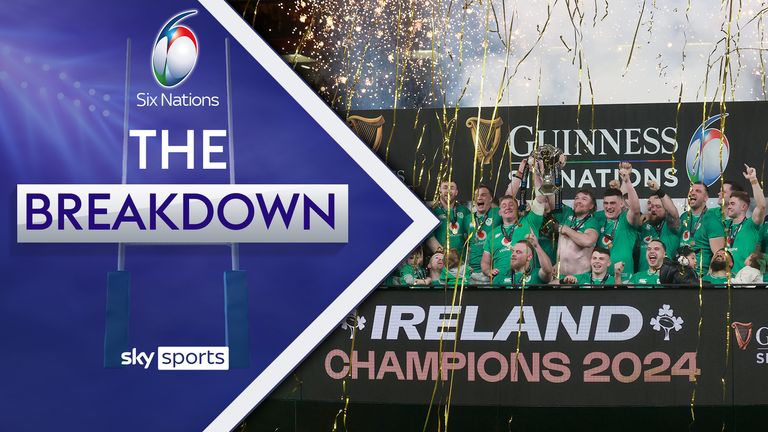
South Africa also take on Scotland and Wales during their three-Test tour, with Scotland having further games against Fiji, Portugal and Australia during a busy November. Wales' meeting with the Springboks follows matches with Fiji and Australia.
Autumn Internationals: Fixtures and UK kick-off times
Saturday november 2.
3.10pm England vs New Zealand, Twickenham Stadium
- Legendary designer Newey decides to leave Red Bull
- Papers: Canada approach ex-Man Utd boss Solskjaer over managerial job
- Littler moves clear at top of PL table with Cross demolition in Liverpool
- Slot 'confident' of Liverpool deal despite 'hard-bargaining' by Feyenoord
- PL Predictions: Liverpool to misfire again at West Ham
- 'Nobody is safe' - Pep wary of City suffering title setbacks like Liverpool
- Transfer Centre! Saudi transfer strategy to change amid Salah interest
- The making of Arne Slot: Why he is right for Liverpool
- Premier League Darts table after Night 13
- 'Ashworth to take Newcastle to arbitration over Man Utd move'
- Latest News
5.40pm Scotland vs Fiji, Murrayfield
Friday November 8
8.10pm - Ireland vs New Zealand, Aviva Stadium
Which players could feature for the Lions?
What next after Ireland's Six Nations win?
Latest rugby union headlines and video
When is rugby union live on Sky Sports?
Saturday November 9
3.10pm England vs Australia, Twickenham
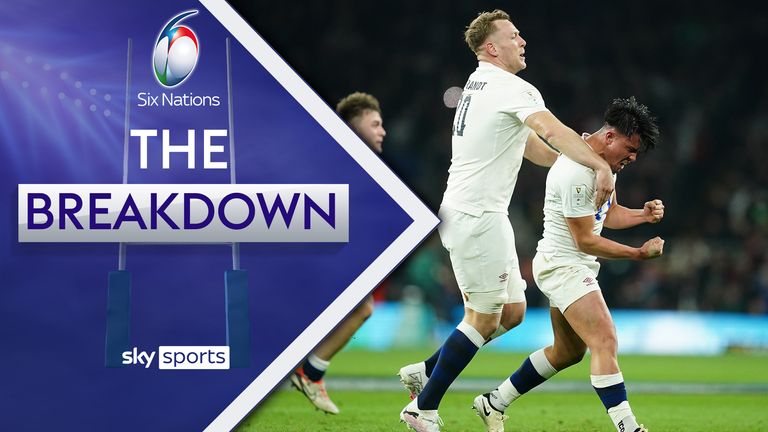
5.40pm Italy vs Argentina, TBC
8.10pm France vs Japan, Stade de France
Sunday November 10
1.40pm - Wales vs Fiji, Principality Stadium
4.10pm Scotland vs South Africa, Murrayfield
Friday November 15
8.10pm - Ireland vs Argentina, Aviva Stadium
Saturday November 16
3.10pm Scotland vs Portugal, Murrayfield
5.40pm England vs South Africa, Twickenham
8.10pm France vs New Zealand, Stade de France
🏉 Here are your 2024 #AutumnNationsSeries Fixtures 🙌 pic.twitter.com/S8GUhS2bw5 — Autumn Nations Series (@autumnnations) April 22, 2024
Sunday November 17
1.40pm - Italy vs Georgia, TBC
4.10pm - Wales vs Australia, Principality Stadium
Friday November 22
8.10pm France vs Argentina, Stade de France
Saturday November 23
3.10pm - Ireland vs Fiji, Aviva Stadium
5.40pm - Wales vs South Africa, Principality Stadium

8.10pm - Italy vs New Zealand, TBC
Sunday November 24
1.40pm Scotland vs Australia, Murrayfield
4.10pm England vs Japan, Twickenham
Saturday November 30
3.10pm - Ireland vs Australia, Aviva Stadium
Watch every game of the 2025 British and Irish Lions tour of Australia, including all three Test matches against the Wallabies, exclusively live on Sky Sports . Also stream with NOW .
Ad content | Stream Sky Sports on NOW

Stream Sky Sports live with no contract on a Month or Day membership on NOW. Instant access to live action from the Premier League, EFL, F1, England Cricket, the Lions and so much more.

How to watch Premier League, EFL, WSL, Scottish Premiership, Tennis and more
- Stream with NOW

- Upgrade Now

Britons issued travel warning as cases of 'potentially life-threatening' disease rise in England, Wales and Nothern Ireland
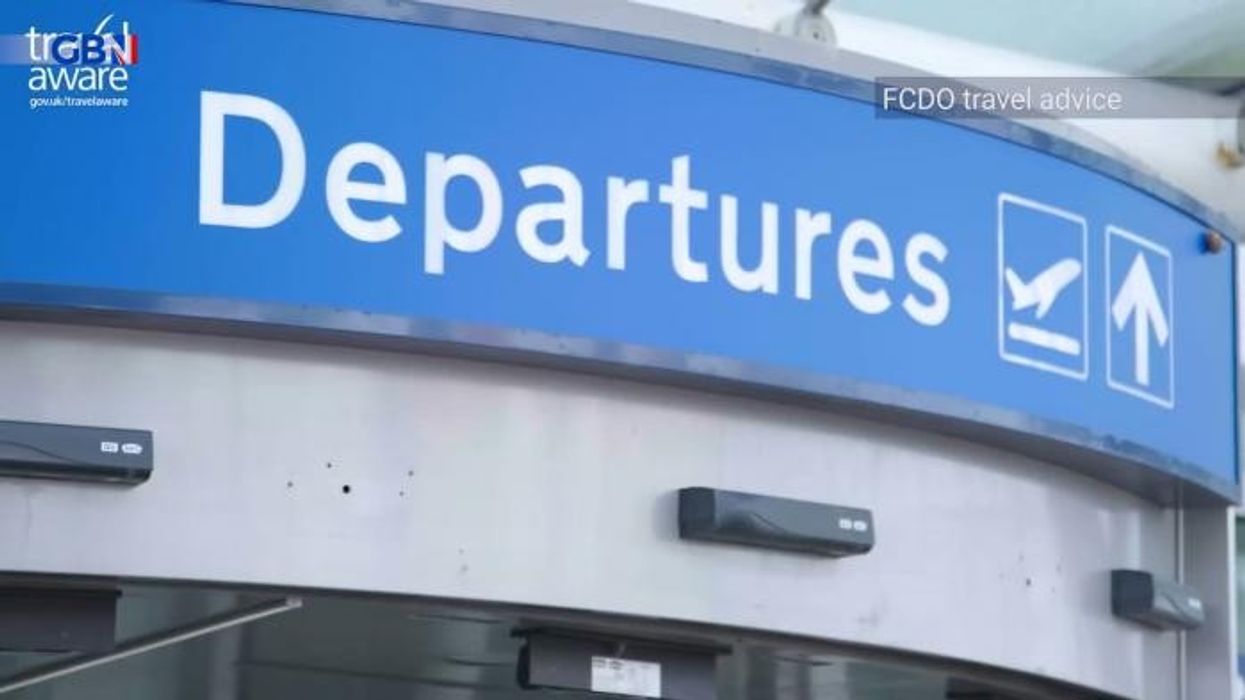
Britons going abroad have been urged to check travel advice

By Anna Barry
Published: 24/04/2024
Holidaymakers can avoid contracting malaria by taking precautionary measures
Don't miss, 'i just wonder, how much more is the british public going to take', luke littler gets last laugh against rowdy liverpool crowd with third premier league night victory, nude knitted charity censored after receiving complaints over doll ‘genitals’, 'you're making yourself look older' women over 50 told to avoid 'cheap' hairstyle, world snooker championship disaster emerging as third player threatens to walk away, kate and william set to follow 'new procedure' with princess charlotte, prince william opens up on how princess kate feels about missing royal family duties, princess beatrice steps out with husband after weeks of turmoil, lucky punter set to cash in on lotto jackpot as euromillions issue urgent appeal, trending on gb news, uk weather: britain set for arctic blast with -2c plunge as 'gales and thunderstorms' to hit in days.
Britons have been warned of a rise in travel-acquired malaria cases, with an increase in diagnoses across England, Wales and Northern Ireland. Malaria is a disease caused by a parasite that can be passed on to humans by mosquitoes.
The number of imported malaria cases diagnosed in 2023 was higher than they have been in 20 years, as reported by the UK Health Security Agency (UKHSA).
GOV.UK said: "New data from the UKHSA, published ahead of World Malaria Day (April 25), shows an increase in malaria diagnosed in England, Wales and Northern Ireland, with reported cases exceeding 2,000 for the first time since 2001. Cases were confirmed in individuals who had recently been abroad.
"The number of cases highlights the importance of taking precautions to minimise the risk of malaria when travelling abroad.
Britons should consult travel advice before going abroad
GETTY IMAGES
"In 2023, there were 2,004 cases of malaria confirmed in England, Wales and Northern Ireland following travel abroad, compared to 1,369 in 2022."
The rise in cases has been linked to the "resurgence of malaria in many countries", coupled with an increase in overseas travel post-pandemic.
The most recent guidance by Travel Health Pro - which was set up by the Department of Health to protect the health of British travellers - reads: "Malaria is a serious and potentially life-threatening disease, transmitted to humans through the bite of infected female Anopheles mosquitoes.
"Malaria is widely distributed throughout tropical regions in Africa, Asia, Central and South America, Hispaniola (Dominican Republic and Haiti), the Middle East and Oceania (islands in the Pacific Ocean between Asia and the Americas)."
Britons were warned that symptoms can be non-specific and flu-like.
Malaria symptoms
- Abdominal discomfort
- Muscle aches
The UKHSA added: "Although symptoms of malaria from several species of the Plasmodium parasite can cause severe disease, illness with Plasmodium falciparum can progress rapidly and cause life-threatening complications if prompt treatment is not given."
What Britons need to do
Holidaymakers should be careful when travelling and ensure they take the necessary precautions.
The UKHSA said: "Following the ABCD of malaria prevention - ‘Awareness of risk, Bite prevention, Chemoprophylaxis and Diagnose promptly and treat without delay’ - can help travellers to be protected against the infection.
"UK travellers are reminded to seek and follow travel advice for their destination, which may include antimalarials and mosquito bite avoidance measures. There is no licensed vaccine against malaria for travellers, but vaccines are available for other travel-associated infections."
LATEST DEVELOPMENTS
- Holidaymakers given new warning for Egypt, Morocco and Tunisia - 'do not travel'
- Britons told how to deal with a 'crisis' overseas as holidaymakers issued UAE travel warning
- Expat in Spain shares the 'unspoken rule' you shouldn't 'break' - 'it's critical to understand'
Malaria is transmitted to humans through the bite of infected female Anopheles mosquitoes
Britons were urged to consult Travel Health Pro, the "one-stop-shop for information to help people plan their trip abroad".
"Travellers should be aware that even if they have visited or lived in a malarious country before, they will not have the same protection against malaria as local residents and are still at risk. Travellers should consult their general practice, pharmacist, or travel clinic four to six weeks before their trip for individual advice and malaria prevention tablets where required."
Holidaymakers heading to countries where there are insects that spread diseases, for example, malaria, dengue and zika, should use insect repellent, cover exposed skin, and sleep under a treated bed net.
Anyone feeling unwell during their travels should seek medical help while away. Once back in the UK, individuals feeling unwell should promptly seek medical attention, also informing their healthcare provider that they have been travelling recently.
Britons should not be fearful if they ensure they exercise caution by taking proactive measures.
Director of the UKHSA Malaria Reference Laboratory (MRL) Professor Peter Chiodini said: "All malaria cases are preventable and simple steps like using insect repellent, covering exposed skin, sleeping under treated bed nets and taking malaria prevention tablets can lower infection risks."
However, he did issue a warning: "While malaria can affect anyone, the majority of Plasmodium falciparum malaria cases in the UK occur in those of African background. Even if you have visited or lived in a country before, you will not have the same protection against infections as local people and are still at risk. We are working in partnership with communities at greater risk to improve their access to and use of effective malaria prevention measures."
British holidaymakers have also been warned as a "fatal" disease is spotted across the globe, including a popular tourist hotspot.
You may like
Listen live
Women's Six Nations 2024: England 88-10 Ireland - Abby Dow and Ellie Kildunne score hat-tricks
- Published 5 days ago
- comments Comments
This video can not be played
To play this video you need to enable JavaScript in your browser.
Women's Six Nations 2024: Superb England thrash Ireland 88-10 in record win at Twickenham
Abby Dow and Ellie Kildunne both scored hat-tricks in England's highest points win over Ireland in front of 48,778 at Twickenham to remain on course for the Grand Slam.
Centre Megan Jones and Jess Breach scored two tries each, with Natasha Hunt and Zoe Aldcroft also crossing.
Sadia Kabeya and Maddie Feaunati went over in the second half, with Ireland managing a penalty try in response.
England's previous highest points win over Ireland was a 79-0 win in 2002.
Victory means the Red Roses have set up a potential Grand Slam decider next Saturday with France, who are also undefeated and face winless Wales on Sunday.
England will head to Bordeaux full of confidence that they can secure a third successive Grand Slam and a sixth successive Six Nations title.
Rugby Union Weekly: England power to record win over Ireland
Reaction to England's crushing win
How England 'rockstar' Kildunne lit up Twickenham - analysis
Kildunne stars as England's attack clicks
England sealed a Six Nations Grand Slam against France in front of a world record women's crowd of 58,498 in their previous match at Twickenham.
And the Red Roses wasted no time in putting on another show in front of the new second-highest women's crowd, as Dow fended off two Ireland players to superbly finish in the corner.
Head coach John Mitchell has called for his side to play with a higher tempo in attack, with his captain Marlier Packer saying her side must be brave.
Mistakes have been evident with this new style, but it all started to click at Twickenham, with Hunt spotting a gap at the ruck to break clear before eventually finishing off the second score.
Tries from Jones and Aldcroft quickly followed as a relentless Red Roses grabbed a bonus point in 20 minutes.
But it was Kildunne who was again the star performer. The full-back has been England's standout player this championship with her silky running and grabbed her seventh try of the campaign with another sharp finish.
This came after two eye-catching runs when the 24-year-old danced around countless helpless Irish defenders.
Kildunne, who made 190m in the first half, then turned provider for Dow who grabbed her second try.
Women's Six Nations: 'What a try!' - Dow grabs her second try of the game
Ireland struggle on big occasion
Scott Bemand was appointed the new Ireland coach in July, with Irish women's rugby at an all-time low following five loses and a rock bottom finish in last year's Six Nations.
The former England assistant coach has had a positive impact and ended Ireland's miserable run of seven losses in a row with a convincing 36-5 victory over Wales in Cork last weekend.
However, the challenge of England in Twickenham, who the visitors have not beaten in the championship since 2015, was a challenge too far for his side as they struggled to deal with the hosts' lethal backs.
The pick of Dow's three tries came in the second half when the flying winger again used her strong fend before taking off down the wing to run in untouched.
In the victory over Scotland last weekend five of the Red Roses' eight tries came from their back three, and the trio bettered it a week later as Breach showed her sharp finishing ability for two tries.
Bemand's side did manage to score their first try in five years against England after their maul was taken down illegally, to take something away from a miserable afternoon.
Ireland, who are third in the table, host Scotland in their final game next Saturday as they aim to finish in the top three and secure a spot at the World Cup in 2025.
The result stretches England's winning run in the Six Nations to 28 games, extending their record for consecutive wins by a side across both the men's and women's championships.
However, France are the last team to beat the Red Roses in the competition back in 2018 and pose the biggest threat to that record next Saturday.
Women's Six Nations standings
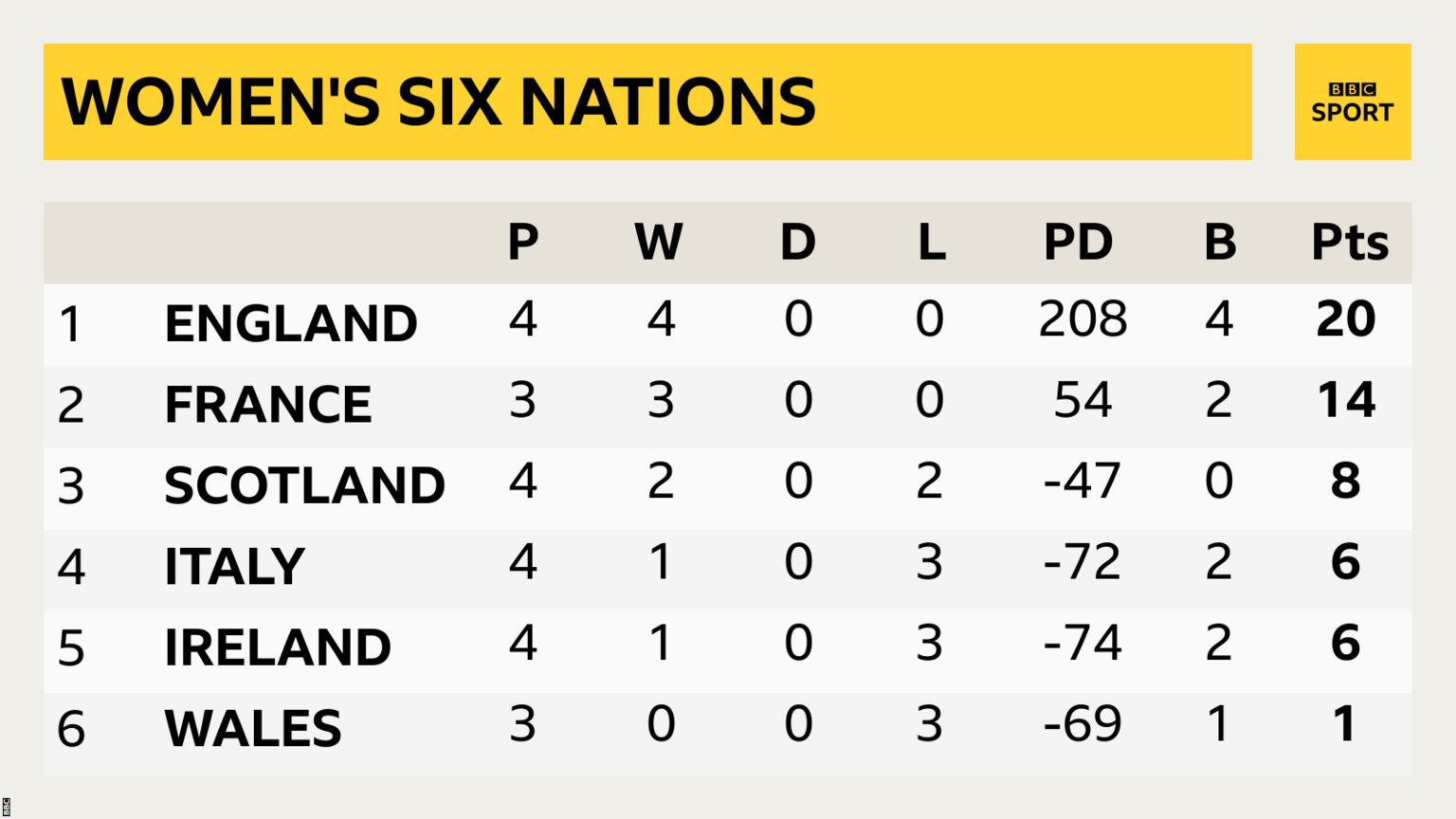
England: Kildunne; Dow, Jones, Heard, Breach; Aitchison, Hunt; Botterman, Atkin-Davies, Muir, Talling, Aldcroft, Kabeya, Packer (capt), Matthews.
Replacements: Powell, Carson, Clifford, Hanlon, Feaunati, L Packer, Scarratt, Gregson.
Ireland: Delany; Corrigan, Higgins, Dalton, Parsons; O'Brien, Reilly; Djougang, Jones, Haney; Wall, O'Connor, Wafer, McMahon, Hogan.
Replacements: Moloney, O'Dowd, McGrath, Tuite, Ikahihifo, Scuffil-McCabe, Breen, Deely.
Referee: Aurelie Groizeleau
Related Topics
- Northern Ireland Sport
- Rugby Union
Comments can not be loaded
To load Comments you need to enable JavaScript in your browser

IMAGES
VIDEO
COMMENTS
A few facts: consumer prices in Ireland are 13.73% higher than in the UK, rent prices in Ireland are 52.02% higher; grocery prices in Ireland are 11% higher. In fact, when you look at comparison lists, everything in Ireland seems higher except for a person's purchasing power, which is 15% lower. Harsh but true.
It's possible to travel by airplane. Is the UK or Ireland more Comfortable for a Trip? The UK and Ireland are both modern and comfortable places to visit. Generally, The UK is considered to be a comfortable and luxurious place to visit. Whether you're traveling on a budget or looking for higher-end luxurious accommodations, Great Britain offers ...
The Common Travel Area (CTA) is an arrangement between the United Kingdom (UK) and Ireland that gives a variety of rights to citizens of those countries. It includes more than the basic right to travel freely between both countries. When the Common Travel Area arrangement began in 1922, it was not contained in any legislation.
UK Travel Guides. Dublin Vs London: Which Is Better? London For First Timers: Best Things To Do, Eat And Know What To Wear In London In March, April And May. Save This Ireland Vs UK Guide. Save this Ireland vs UK travel guide for later by saving to socials.
United Kingdom Ireland; Country name: conventional long form: United Kingdom of Great Britain and Northern Ireland; note - the island of Great Britain includes England, Scotland, and Wales conventional short form: United Kingdom abbreviation: UK etymology: self-descriptive country name; the designation "Great Britain," in the sense of "Larger Britain," dates back to medieval times and was used ...
Scotland is slightly bigger than the Republic of Ireland. However, if you compare the island of Ireland (including Northern Ireland), it is roughly 2,500 square miles larger than Scotland. Scotland is 30,090 square miles (77,933 km 2 ) Ireland (the whole island) is 32,595 square miles (84,421 km 2)
Ireland has tightened its entry requirements for all visitors. With countries around the world adjusting entry rules and travel testing requirements in the face of the omicron variant, Ireland has ...
Road Safety in the UK and Ireland. It is illegal to drink excessively and drive in the UK or Ireland. In Ireland and Scotland, you cannot get behind the wheel of a vehicle if you've had over 50mg of alcohol per 100ml of blood. In England, Wales and Northern Ireland, the limit is 80mg of alcohol per 100ml of blood.
What's needed after March 29, or Brexit day, is a clear legal basis for the Common Travel Area both in the UK and Ireland's own legal systems, underpinned by an international agreement between ...
advice on preparing for travel abroad and reducing risks. information for women, LGBT+ and disabled travellers. Follow and contact FCDO travel on Twitter, Facebook and Instagram. You can also sign ...
Scotland. Scotland has become more and more popular each year, drawing tourists with its outstanding culture in cities like Edinburgh, mythical natural sites like Loch Ness, rugged islands like Skye and Orkney, and one of the best road trips in the world in the form of the North Coast 500.. This beautiful country has so much to offer travellers of all kinds and, despite its relatively small ...
Living in the UK vs Ireland: Main differences . Generally speaking, life in the UK is faster and more frenetic than in Ireland. It's a much more urban and cosmopolitan country, with more of a "Big City" buzz and excitement. ... Irish and British citizens can freely travel to and from either country by virtue of the Common Travel Area ...
England probably wins on architecture, especially that in London. Ireland wins on traditional music and a more rural landscape. I suggest you go to your library or to a good book store and browse ...
British citizens do not need a visa to visit Ireland. Ireland, along with the UK, is a member of the Common Travel Area (CTA). UK nationals do not need a visa or residency permit to live, work or ...
The Common Travel Area (CTA) is made up of the UK, Ireland and the Crown Dependencies (Jersey, Guernsey and the Isle of Man). For the UK, the CTA arrangements means that you won't always go ...
Average Salaries: UK vs Ireland. The average annual salary in the UK is £29,500 after graduation, while it is £30,442 for a postgraduate. On the other hand, the average salary is €33,383 to €50,000 per year in Ireland after graduation, whereas it is €65,000 per year after postgraduation.
Since at least 1542, England and later Great Britain and Ireland have been connected politically, reaching a height in 1801 with the creation of the United Kingdom of Great Britain and Ireland.About five-sixths of the island of Ireland seceded from the United Kingdom in 1922 as the Irish Free State.Historically, relations between the two states have been influenced heavily by issues arising ...
So, if you're looking to study in one of the capitals then Dublin seems to be cheaper than London, but this may fluctuate so it's best to get an up-to-date comparison on Expatistan. Other online sources suggest that the cost of living is quite similar in both capital cities; around £12.000 per year in the UK and 8.000-12.000€ in Ireland.
5. The UK and London. If you are into the Royal Family and the United Kingdom culture, Ireland is right next door. A quick hop over by land and by sea, for a travel time of 10 hours, gets you from the center of Ireland to London, England. Also, forget a passport. Irish travelers only need an ID to get to London.
Visit Caernarfon Castle - An Important Part of Wales' History. There are approximately 640 existing castles in Wales and Caernarfon Castle is one that stands out. Since it was erected in 1283, the castle has been besieged and re-captured numerous times, yet it is still one of the most well-preserved medieval castles in all Europe.
When you think of Ireland and Scotland, you might be imagining two very similar countries - lots of greenery, the U.K., cafés, and packed, early histories.And although there are some resemblances between the two, we're here to set the record straight - Ireland vs. Scotland travel varies, with each country offering a unique and exciting study abroad experience.
Study in Ireland vs. UK: Cost of studying a undergraduate program. Ireland and the UK are popular destinations for undergraduate studies for international students due to their prestigious universities and diverse academic offerings, but they differ in tuition fees, living expenses, and available financial support. ...
If you also cook for yourself and stick to free sights, you can achieve an Ireland trip on a budget. Though you'd be happier here if you can travel on $100 a day, which will stretch MUCH farther here than in Iceland. Bottom line: neither are cheap places to travel, but Iceland is way more expensive. (Even after factoring in budget flights).
Barclays and Lloyds Bank saw more modest net gains of 12,823 and 5,800 respectively, while the rest of the UK's big banks reported net losses. NatWest and Halifax fared worst, losing over 40,000 ...
8.10pm - Italy vs New Zealand, TBC. Sunday November 24. 1.40pm Scotland vs Australia, Murrayfield. 4.10pm England vs Japan, Twickenham. Saturday November 30. 3.10pm - Ireland vs Australia, Aviva ...
The UK and Ireland share a Common Travel Area, which came into effect before both countries joined the EU. The Irish government believe that a significant number of recent refugees have come from Nigeria. LATEST DEVELOPMENTS: More than 400 migrants crossed the Channel on same day five others drowned in French waters
The number of imported malaria cases diagnosed in 2023 was higher than they have been in 20 years, as reported by the UK Health Security Agency (UKHSA). ... "In 2023, there were 2,004 cases of malaria confirmed in England, Wales and Northern Ireland following travel abroad, compared to 1,369 in 2022." ...
Abby Dow and Ellie Kildunne both scored hat-tricks in England's highest points win over Ireland in front of 48,778 at Twickenham to remain on course for the Grand Slam. Centre Megan Jones and Jess ...
We aim to publish average rent prices for the UK and Northern Ireland in March 2025. Users should interpret results with this in mind. Back to table of contents. 2. UK private rent and house prices. Average UK private rent increased by 9.2% in the 12 months to March 2024 (provisional estimate). This was up from 9.0% in the 12 months to February ...